


Who’s Who of Gender Studies












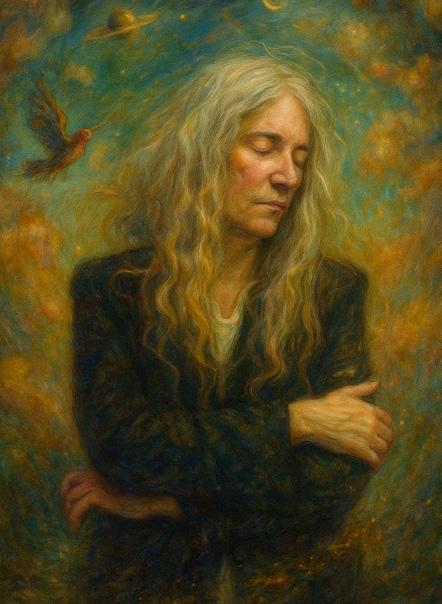


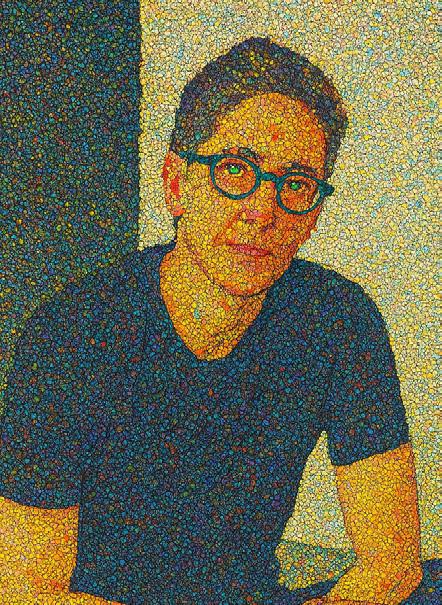
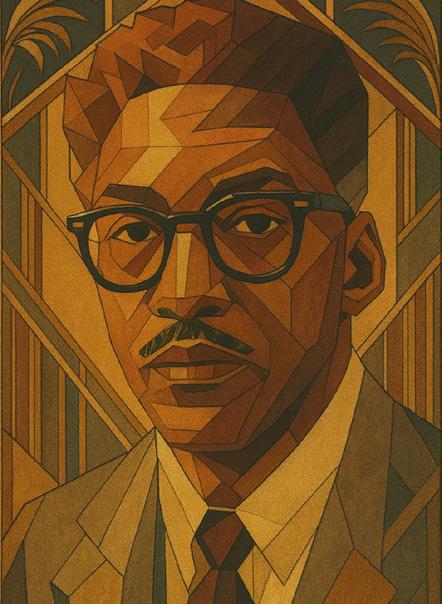




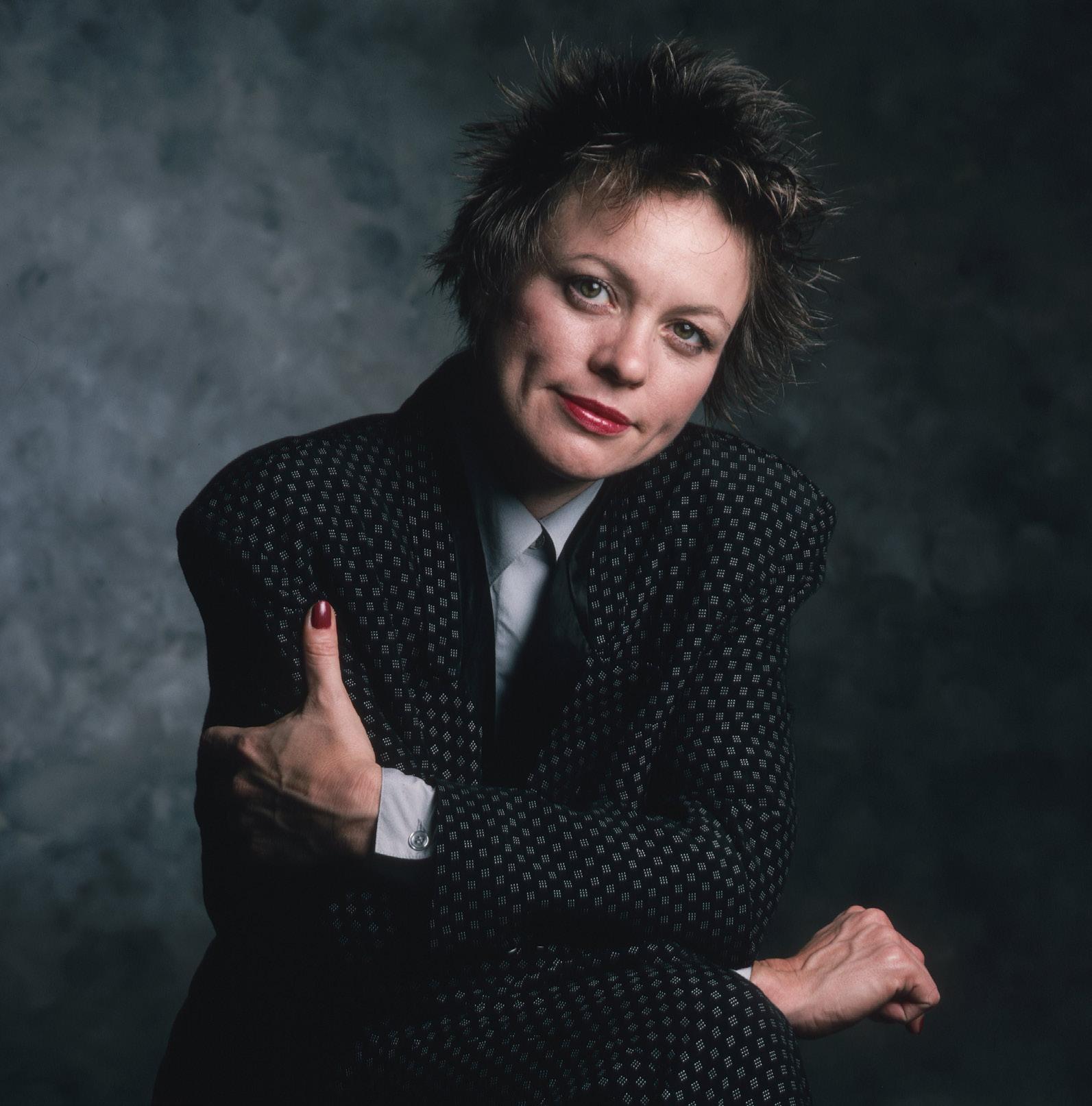
LAURIE ANDERSON is a pioneering American artist, composer, performer, and writer whose innovative work has spanned multiple disciplines— from experimental music and multimedia performance to film, technology, and fine art. Throughout her remarkable career, she has not only broken artistic boundaries but also used her platform to support civil rights for women and the LGBTQ+ community. With her fearless creativity and unwavering commitment to inclusion, Anderson has become a powerful voice for equality and expression.
Born on June 5, 1947, in Glen Ellyn, Illinois, Laurie Anderson developed an early love for the arts. She studied violin as a child and eventually earned degrees in art history and sculpture from Barnard College and Columbia University. In the 1970s, she emerged in New York City’s vibrant avant-garde
scene, combining music, spoken word, visual art, and technology to create a new form of multimedia storytelling. Her early works often explored themes of identity, politics, and the human experience, earning her critical acclaim for their depth and originality.
Anderson rose to international fame in 1981 with her song “O Superman,” an experimental track that unexpectedly became a top hit in the UK. The song, which blended minimalist electronics with a haunting vocal performance, demonstrated Anderson’s ability to turn complex social commentary into emotionally resonant art. It addressed themes of communication, control, and technology, touching on both personal and political anxieties. From the beginning, Anderson’s work stood out not only for its innovation but also for its empathy and intellectual engagement with pressing social issues.
As a woman in the male-dominated fields of electronic music and performance art, Laurie Anderson has always been a trailblazer. She has consistently challenged the expectations placed on women artists and spoken out about gender inequality in the art world and beyond. In interviews and public appearances, she has encouraged women to embrace experimentation, take risks, and redefine the boundaries of creativity on their own terms. Through both her art and her advocacy, she has opened doors for other women to express themselves freely and fearlessly.
Anderson’s support for the LGBTQ+ community has been just as profound. Her art has often addressed fluidity in identity, language, and perspective—values that resonate deeply with LGBTQ+ audiences. Though she has never labeled herself publicly in terms of sexual orientation, Anderson has long embraced nonconformity in all its forms and shown deep solidarity with queer voices. Her marriage to the late rock icon Lou Reed, who identified as bisexual and explored gender and sexuality through his work, further reflected her connection to LGBTQ+ themes and communities.
In her performances and public engagements, Anderson has participated in events that support LGBTQ+ rights and has created spaces where diverse voices are celebrated. Her openness to collaboration and experimentation has made her a champion of intersectionality and inclusivity in the arts. Whether through multimedia installations or live performances, Anderson uses her art to foster empathy, question power structures, and amplify marginalized perspectives.
In addition to her music and performance work, Anderson has
made significant contributions to film, literature, and technology. Her 2015 film Heart of a Dog, a poetic meditation on grief, love, and memory, was widely acclaimed for its emotional depth and philosophical insight. It also reflected her gift for blending the personal and political—touching on themes of surveillance, loss, and compassion in a post-9/11 world. Her writing, including essays and memoirs, continues to inspire artists and thinkers across disciplines.
Anderson has also served as a cultural leader, including as the first artist-in-residence at NASA, a role that symbolized her unique ability to bridge science and art. She has received numerous honors and awards for her contributions to culture and social progress, including the Gish Prize and a Grammy Award for Best Chamber Music/ Small Ensemble Performance. Her influence is felt not only in the world of contemporary art but also in the broader movements for justice and inclusion.
Throughout her career, Laurie Anderson has remained a deeply compassionate and curious artist. Her work asks essential questions about identity, technology, and human connection. She has given voice to those who are too often unheard, encouraged fearless self-expression, and built a body of work that champions diversity and equality.
Today, Laurie Anderson stands as a visionary who has reshaped the landscape of contemporary art and music. Her commitment to civil rights—especially for women and LGBTQ+ people—continues to resonate in her art, activism, and public presence. She has shown that creativity can be both a form of resistance and a path toward understanding, making her one of the most inspiring cultural figures
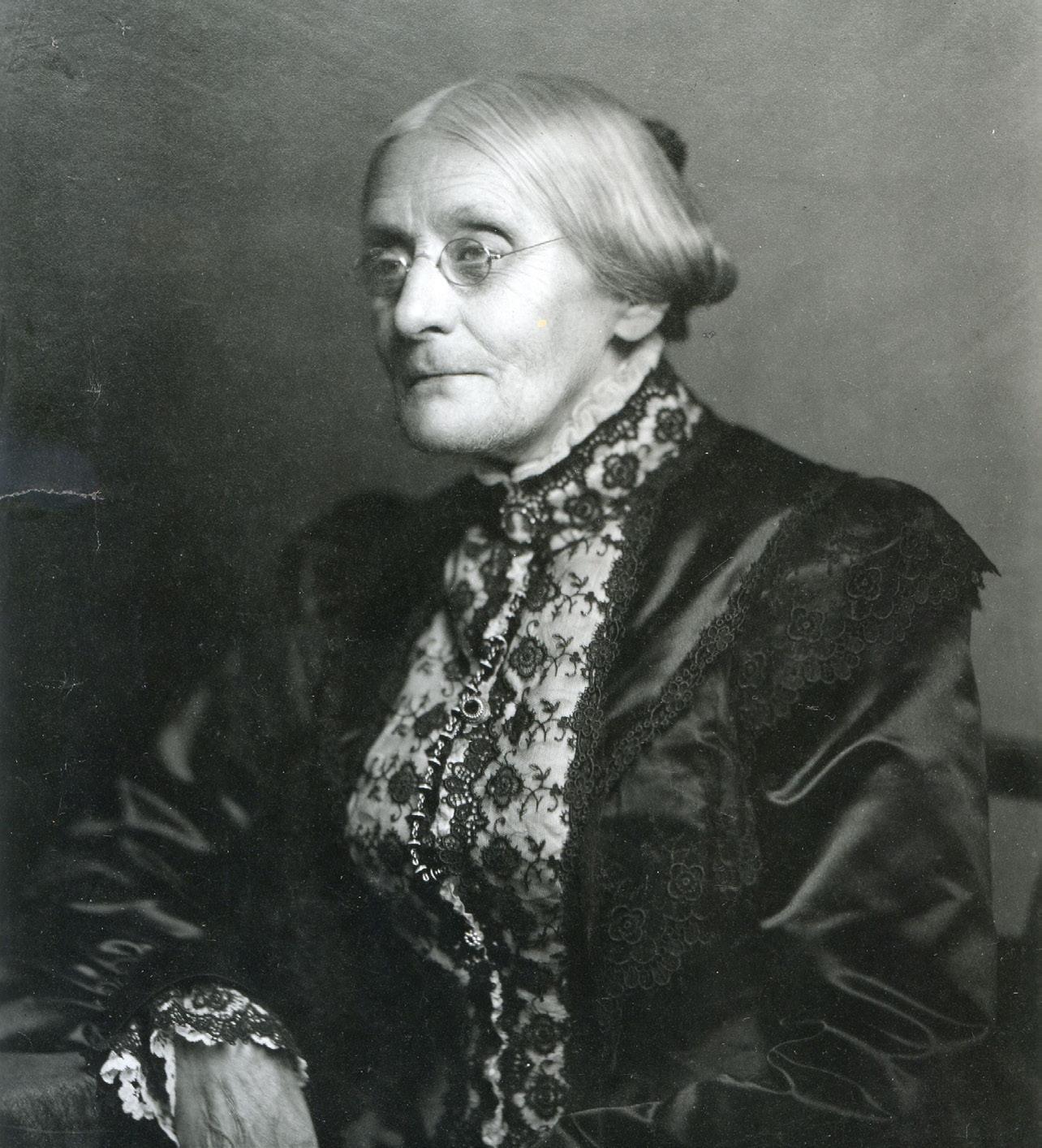
SUSAN B. ANTHONY was a fearless and determined leader who dedicated her life to the fight for women’s rights and civil liberties in the United States.
Born on February 15, 1820, in Adams, Massachusetts, Anthony grew up in a Quaker family that valued equality and social justice. These beliefs shaped her views early on and inspired her to take a stand against the injustices faced by women in 19th-century America.
Anthony began her career as a teacher, where she quickly became aware of the inequality women faced in the workforce. Despite doing the same work as men, she was paid only a fraction of their wages. This personal experience fueled her commitment to advocating for women’s rights, especially the right to vote. At the time, women had very little power or representation.
They could not vote, had limited property rights, and were often expected to stay silent in political matters.
In the 1850s, Anthony met Elizabeth Cady Stanton, another powerful voice for women’s rights. The two formed a lifelong partnership, working together to change laws and raise awareness. In 1869, they founded the National Woman Suffrage Association (NWSA), focused on achieving a constitutional amendment that would grant women the right to vote.
Susan B. Anthony was a tireless speaker and organizer. She traveled across the country, giving speeches, organizing rallies, and petitioning lawmakers. Her dedication was unmatched, and she often faced criticism, ridicule, and even threats. Still, she remained committed to the cause, believing
deeply that women deserved the same rights as men.
One of Anthony’s most famous acts of protest occurred in 1872, when she voted in the presidential election in her hometown of Rochester, New York—a bold move, since women were not legally allowed to vote. She was arrested and fined $100, which she refused to pay. This act of civil disobedience brought national attention to the women’s suffrage movement and highlighted the injustice of denying women the vote.
Beyond voting rights, Anthony was a strong advocate for other civil rights issues. She supported the abolition of slavery and worked closely with activists like Frederick Douglass. She also fought for women’s property rights, access to education, and legal equality. Her vision for justice included all people, regardless of gender or race.
Though Susan B. Anthony did not live to see the victory she worked so hard for—she died in 1906—her efforts laid the foundation for the 19th Amendment to the U.S. Constitution, ratified in 1920, which granted women the right to vote. In recognition of her legacy, she became the first woman to be featured on U.S. currency when her image appeared on the dollar coin in 1979.
Susan B. Anthony’s life was one of courage, dedication, and unshakable belief in justice. Her work transformed the nation and continues to inspire generations to fight for equality and civil rights for all.
MARGARET ATWOOD is a celebrated Canadian author, poet, and activist whose powerful writing and outspoken advocacy have made her a leading voice in the fight for gender equality and civil rights. Born
on November 18, 1939, in Ottawa, Ontario, Atwood developed an early love for reading and storytelling. Her sharp intellect and passion for literature led her to study English literature at the University of Toronto and later at Harvard University.
Atwood’s literary career began in the 1960s, and she quickly gained recognition for her keen insights into human nature, society, and power. Over the decades, she has written dozens of novels, short stories, poems, and essays. Her work often explores themes such as gender, identity, oppression, and environmental issues. Through her writing, Atwood has become a powerful advocate for women’s rights, using fiction as a way to illuminate the struggles and resilience of women throughout history and in imagined futures.
One of Atwood’s most famous works, The Handmaid’s Tale (1985), is a dystopian novel that explores the consequences of a society in which women are stripped of their rights and reduced to their reproductive functions. The book became a global sensation, praised for its chilling vision and powerful critique of patriarchal control. It has since been adapted into a successful television series, sparking renewed interest in women’s rights and reproductive freedom, particularly in times of political uncertainty. Atwood has said that everything in The Handmaid’s Tale was inspired by real events from history, emphasizing that such oppression is not just fiction—it is a warning.
Throughout her career, Atwood has used her platform to speak out on issues of equality, censorship, and social justice. She has consistently defended the rights of women to control their own bodies, express their ideas freely, and live without fear or discrimi-
nation. Atwood has been involved in numerous human rights organizations and initiatives, including PEN International, which works to protect writers and freedom of expression around the world.
Despite her serious subject matter, Atwood’s writing is known for its wit, clarity, and deep empathy. Her characters are complex and realistic, and she often challenges readers to question societal norms and imagine a more just and equal world. Her influence goes far beyond literature—she has inspired generations of readers, writers, and activists to think critically about the systems that shape our lives.
Margaret Atwood’s contributions to literature and civil rights have earned her numerous awards and honors, including the Booker Prize, the Arthur C. Clarke Award, and the Peace Prize of the German Book Trade. She remains a vital cultural figure, continuing to write, speak, and advocate well into her 80s.
In both her art and her activism, Atwood has shown that stories have the power to challenge injustice and ignite change. She stands as a powerful example of how literature can be a force for truth, resis-
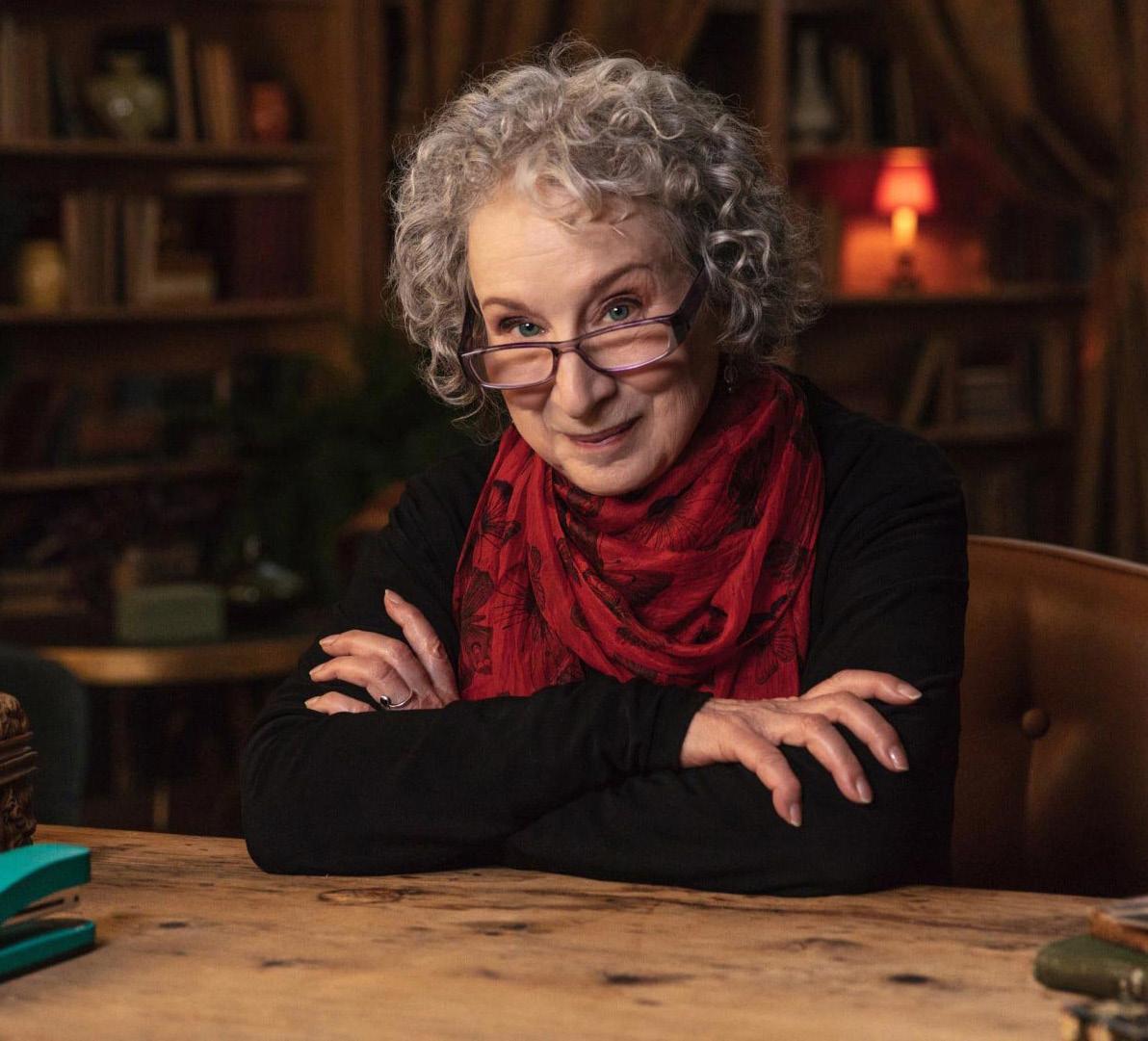
tance, and hope in the struggle for women’s rights and human dignity.
JAMES BALDWIN was a brilliant writer, thinker, and activist whose work continues to inspire generations fighting for justice and equality. Born on August 2, 1924, in Harlem, New York, Baldwin grew up in a challenging environment marked by poverty and racism. Despite these hardships, he developed a passion for reading and writing at an early age. His talent and determination would soon make him one of the most powerful voices of the 20th century, advocating for the civil rights of African Americans, women, and the LGBTQ+ community.
Baldwin’s early experiences in a racially divided America shaped much of his writing. He moved to France in 1948 to escape the racism and homophobia he faced in the United States, but his work remained deeply rooted in American life and struggles. Through essays, novels, plays, and speeches, Baldwin explored the complex intersections of race, gender, and sexuality, always with honesty, empathy, and deep moral clarity.
His first novel, Go Tell It on the Mountain (1953), was a semi-autobiographical account of growing up in Harlem and grappling with faith, family, and identity. It established him as a literary force. In his landmark essay collections such as Notes of a Native Son (1955) and The Fire Next Time (1963), Baldwin confronted the realities of racism in America, urging the country to reckon with its history and embrace true equality.
During the civil rights movement, Baldwin emerged as a vital voice and moral leader. While he was not formally affiliated with any specific organization, he marched
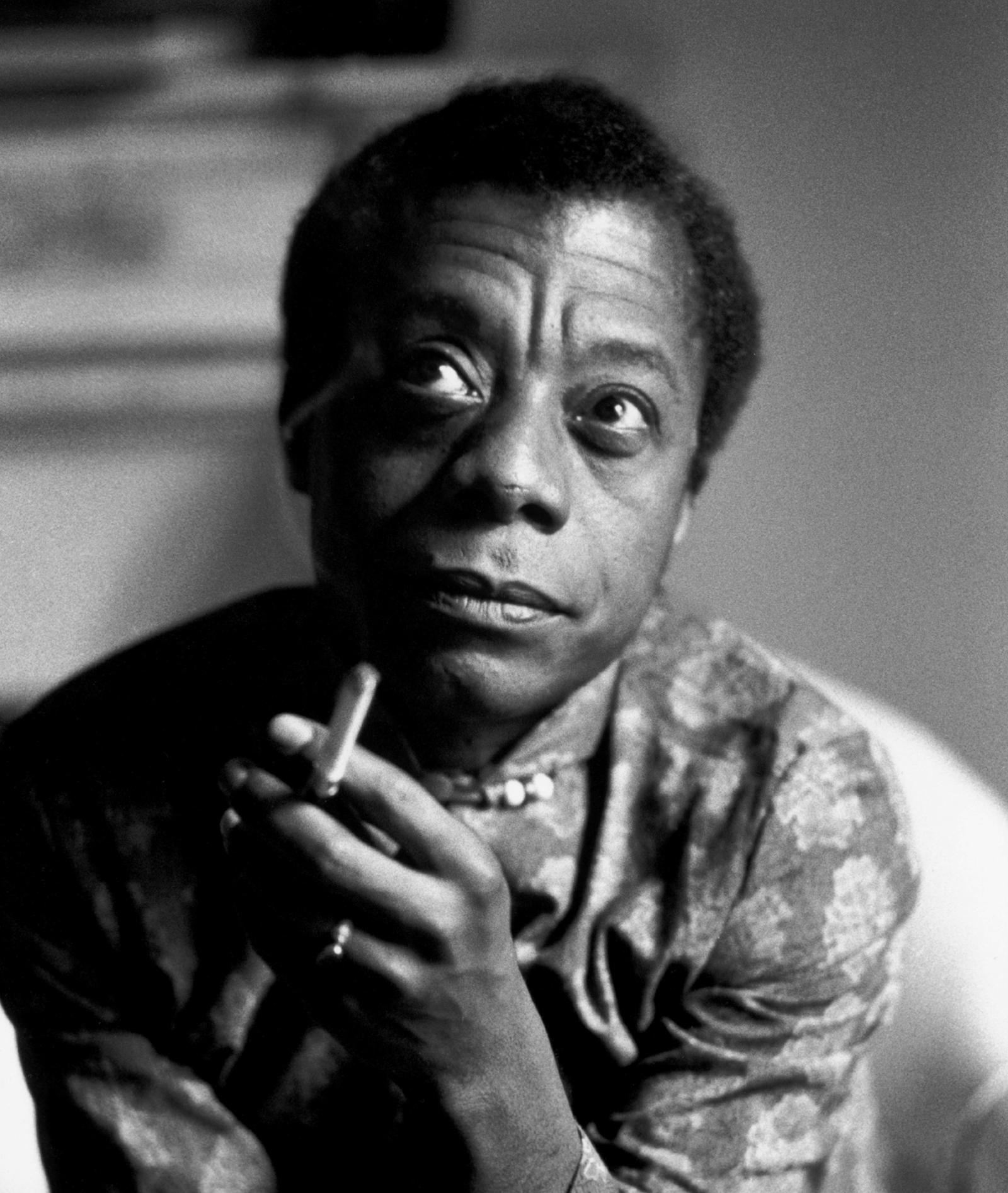
with Martin Luther King Jr., debated segregationist leaders, and spoke fearlessly about injustice. His words carried the weight of truth and compassion. He used his platform to show the human cost of racism, not just in laws and policies but in everyday lives.
Baldwin also broke ground as one of the first openly gay Black writers in American literature. At a time when few dared to speak openly about LGBTQ+ issues, Baldwin courageously wrote about love, identity, and desire in ways that defied stereotypes and celebrated complexity. His 1956 novel Giovanni’s Room was a daring exploration of same-sex love and emotional struggle, and it remains a landmark in queer literature.
Equally significant was Bald-
win’s advocacy for women and gender equality. He consistently highlighted how oppression is interconnected and argued that the fight for racial justice must also include the liberation of women and queer individuals. His inclusive vision helped lay the groundwork for future intersectional movements.
James Baldwin’s legacy lives on in literature, social justice, and activism. He believed in the transformative power of love, truth, and empathy—and he never stopped urging America to live up to its ideals. Through his fearless writing and advocacy, Baldwin gave voice to those who were too often silenced. He died in 1987, but his words remain as urgent and inspiring today as ever.
James Baldwin showed the
world that to speak truthfully is a radical act—and that real change begins with courage.
SIMONE DE BEAUVOIR was a groundbreaking French philosopher, writer, and feminist whose ideas helped shape the modern women’s rights movement. Born on January 9, 1908, in Paris, France, de Beauvoir grew up in an educated but conservative family. From a young age, she showed an exceptional intellect and a deep curiosity about the world. She pursued higher education in philosophy, becoming one of the first women in France to achieve such academic success in a male-dominated field.
De Beauvoir’s early work in philosophy focused on ethics and existentialism, and she was a close collaborator and lifelong partner of fellow philosopher Jean-Paul Sartre. Together, they developed existentialist ideas centered on freedom, responsibility, and the individual’s role in shaping their own life. However, Simone de Beauvoir
made her own unique and lasting contribution to philosophy and society through her examination of gender and women’s oppression.
In 1949, de Beauvoir published The Second Sex (Le Deuxième Sexe), a revolutionary book that examined the treatment of women throughout history. In it, she famously wrote, “One is not born, but rather becomes, a woman,” arguing that gender roles are not determined by biology but by social conditioning. This powerful idea challenged traditional beliefs and became a cornerstone of feminist thought. The Second Sex explored how women had been systematically denied autonomy, education, and opportunity, and it called for equal rights, freedom, and dignity for all women.
The book was controversial when it was first published, but over time, it became one of the most important feminist texts of the 20th century. It influenced not only scholars and activists but also everyday women who saw their lives and struggles reflected in its pages. De Beauvoir helped spark
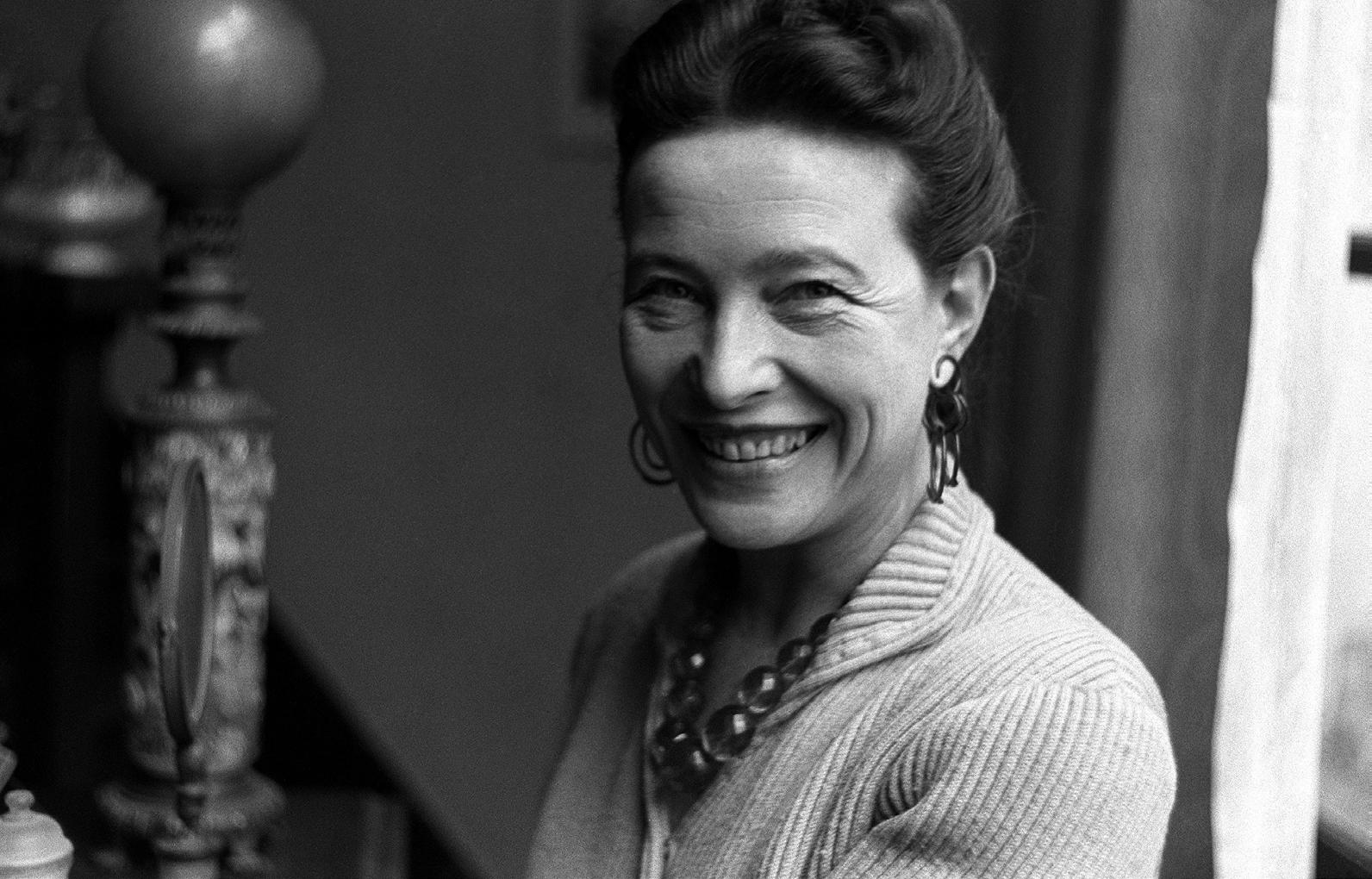
the second wave of feminism in the 1960s and 70s, especially in Europe and North America.
Beyond her writing, Simone de Beauvoir was deeply engaged in social and political issues. She supported abortion rights, equal pay, and legal reforms to protect women’s autonomy. She also worked to raise awareness about the lived experiences of women in different parts of the world, highlighting the importance of global solidarity in the fight for gender equality. In the later years of her life, she remained an outspoken critic of sexism, inequality, and injustice.
De Beauvoir was also a novelist, memoirist, and public intellectual. Her novels and autobiographies explored themes of freedom, identity, and moral responsibility. She used her literary voice to explore how individuals, especially women, navigate a world shaped by power and tradition.
Simone de Beauvoir died in 1986, but her legacy continues to inspire people around the world. She helped create the intellectual foundation for modern feminism and pushed society to reconsider what it means to be equal and free. Through her fearless writing and commitment to justice, she changed the way the world thinks about women — not as passive beings, but as full, independent individuals deserving of every human right.
ALISON BECHDEL is an acclaimed American cartoonist, graphic memoirist, and LGBTQ+ activist whose groundbreaking work has made a lasting impact on both the literary world and the broader fight for civil rights. Best known for her comic strip Dykes to Watch Out For and her autobiographical graphic novel
Fun Home, Bechdel has used storytelling, wit, and honesty to explore themes of identity, gender, sexuality, and family. Her contributions have helped reshape cultural conversations around feminism and LGBTQ+ visibility, making her a vital figure in the push for equality and representation.
queer life at a time when such representation was extremely rare in mainstream media. Bechdel’s work resonated with readers and earned her a devoted following, particularly within LGBTQ+ circles. The strip is widely considered a landmark in queer literature and helped pave
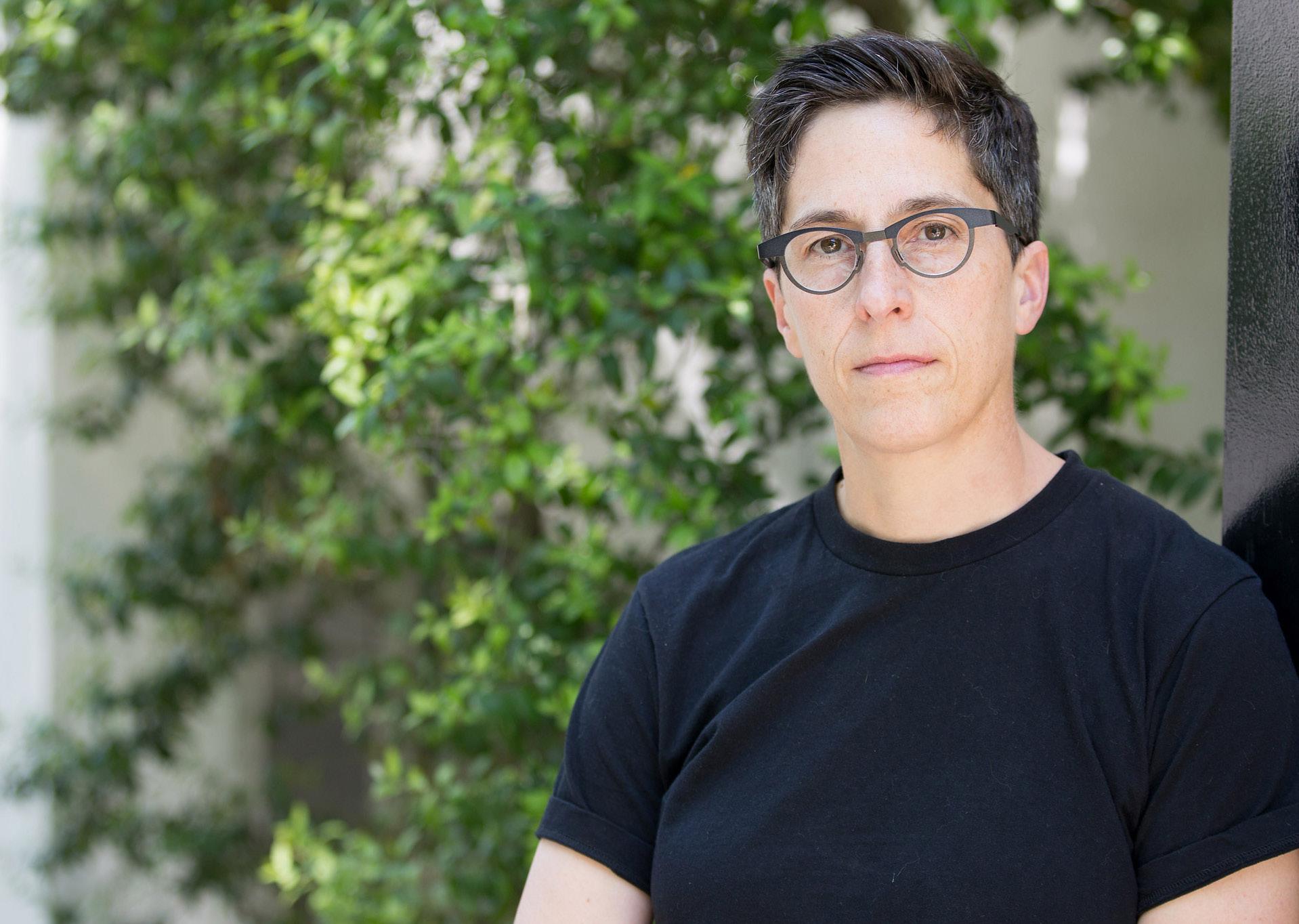
Born on September 10, 1960, in Lock Haven, Pennsylvania, Bechdel grew up in a small town in a family that would later become central to her memoirs. She attended Oberlin College, a progressive liberal arts school where she began to fully embrace her identity as a lesbian and explore her passion for art and writing. After graduating in 1981, she moved to New York City, where she began working on what would become her most influential early creation: Dykes to Watch Out For.
First published in 1983, Dykes to Watch Out For was a long-running comic strip that followed a diverse group of lesbian characters as they navigated relationships, politics, work, and community life. With humor and depth, the strip offered an honest portrayal of
the way for more inclusive storytelling in comics and beyond. From this comic came the now-famous “Bechdel Test,” a simple but revealing measure of gender representation in film and media. The test asks whether a work of fiction features at least two women who talk to each other about something other than a man. Though originally introduced as a joke in one of her strips, the Bechdel Test has since become a widely used tool in discussions about sexism in media and continues to influence how creators and critics think about gender representation.
Bechdel gained international acclaim with the publication of her 2006 graphic memoir Fun Home: A Family Tragicomic. The book explores her relationship with her father, her coming out as a lesbian, and the discovery that
her father was also closeted. Fun Home was hailed as a masterpiece and became a best-seller, earning numerous awards and a place in college curriculums. Its Broadway adaptation won five Tony Awards, including Best Musical, further cementing its cultural significance.
In her work, Bechdel gives voice to the personal struggles and triumphs of LGBTQ+ individuals, showing the humanity and complexity of queer lives. She continues to be a strong advocate for both women’s rights and LGBTQ+ rights, using her platform to promote visibility, challenge stereotypes, and foster empathy.
Alison Bechdel’s contributions as an artist and activist have reshaped the literary landscape and opened doors for more inclusive, authentic storytelling. Her work remains a beacon of honesty, courage, and equality.
KATE BORNSTEIN is a pioneering author, performer, and activist who has become an influential voice in the LGBTQ+ community, especially in advocating for gender diversity and the rights of transgender and nonbinary people. Through her writing, speaking, and personal courage, Bornstein has helped break down rigid gender norms and build a more inclusive understanding of identity and self-expression.
Born in 1948 in New Jersey, Bornstein was assigned male at birth and raised in a traditional Jewish family. For many years, she struggled to fit into societal expectations of gender and identity. After a period in the Church of Scientology, where she attained a high-ranking position before leaving the organization in the early 1980s, Bornstein began to come to terms with her gender identity. In
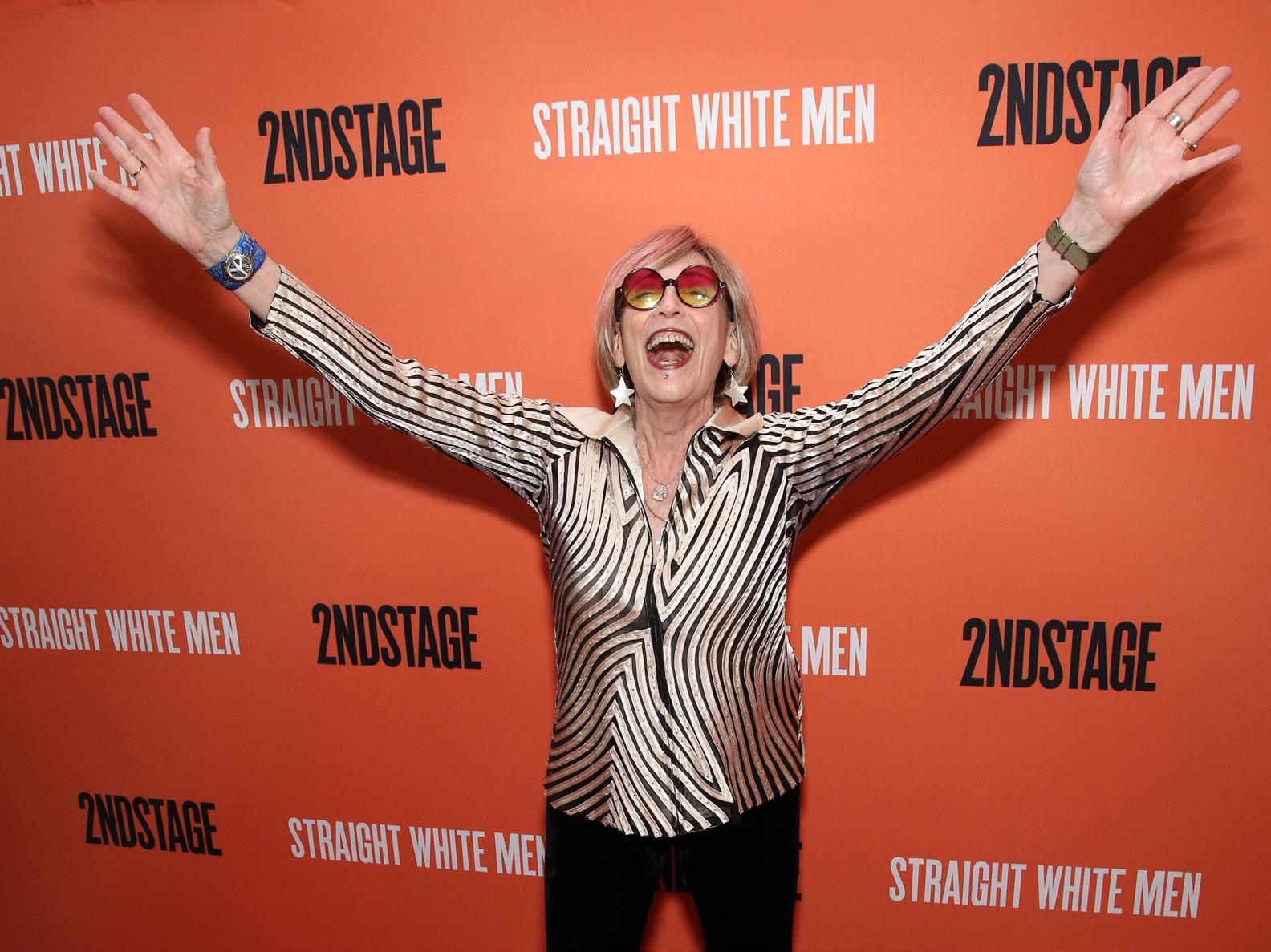
1986, she transitioned and began living openly as a woman. However, she later rejected a binary understanding of gender altogether, identifying as nonbinary and using she/they pronouns. This bold stance—especially at a time when few people openly discussed gender beyond male or female—made Bornstein a groundbreaking figure in LGBTQ+ activism.
One of Bornstein’s most influential contributions is her 1994 book Gender Outlaw: On Men, Women and the Rest of Us. In it, she combines memoir, theory, humor, and performance art to challenge traditional concepts of gender. The book became a foundational text in queer and gender studies and inspired many people to question societal norms and embrace the complexity of their identities. Her follow-up works, including My Gender Workbook and Hello, Cruel World: 101 Alternatives to Suicide for Teens, Freaks and Other Outlaws, have continued to support young people and others struggling with self-acceptance, discrimination, and mental health.
Kate Bornstein’s activism has always been rooted in compassion, honesty, and a refusal to conform
to labels that don’t fit. Her approach is deeply personal and often deeply vulnerable. She speaks openly about her experiences with gender dysphoria, mental illness, addiction, and surviving cancer, making her an especially relatable and supportive figure for those facing similar challenges.
In addition to writing, Bornstein has worked as a performance artist and public speaker, using theater and storytelling to educate audiences around the world about gender and LGBTQ+ rights. Her performances are known for blending activism with humor, emotion, and a message of radical acceptance.
Over the years, Bornstein has received widespread recognition for her work. She has inspired countless individuals to live authentically and to stand up for a more inclusive and accepting world. Her life and activism challenge society to move beyond rigid categories and to embrace the richness of human diversity.
Kate Bornstein continues to be a fearless advocate for LGBTQ+ civil rights. Her courage, creativity, and kindness have helped pave the way for a more understanding and
compassionate world. She reminds us that being yourself—exactly as you are—is a powerful act of resistance and a source of strength.
JUDITH BUTLER is a renowned philosopher, gender theorist, and civil rights advocate whose groundbreaking work has transformed the way we understand gender, identity, and power. Through both academic writing and public activism, Butler has played a pivotal role in advancing civil rights for women and the LGBTQ+ community, challenging societal norms and championing a more inclusive and equitable world.
Born on February 24, 1956, in Cleveland, Ohio, Butler was raised in a Jewish household and showed an early interest in philosophy, ethics, and justice. They went on to study at Bennington College and later earned their Ph.D. in philosophy from Yale University. Over the decades, Butler has taught at several prestigious universities and is currently a professor at the Univer-
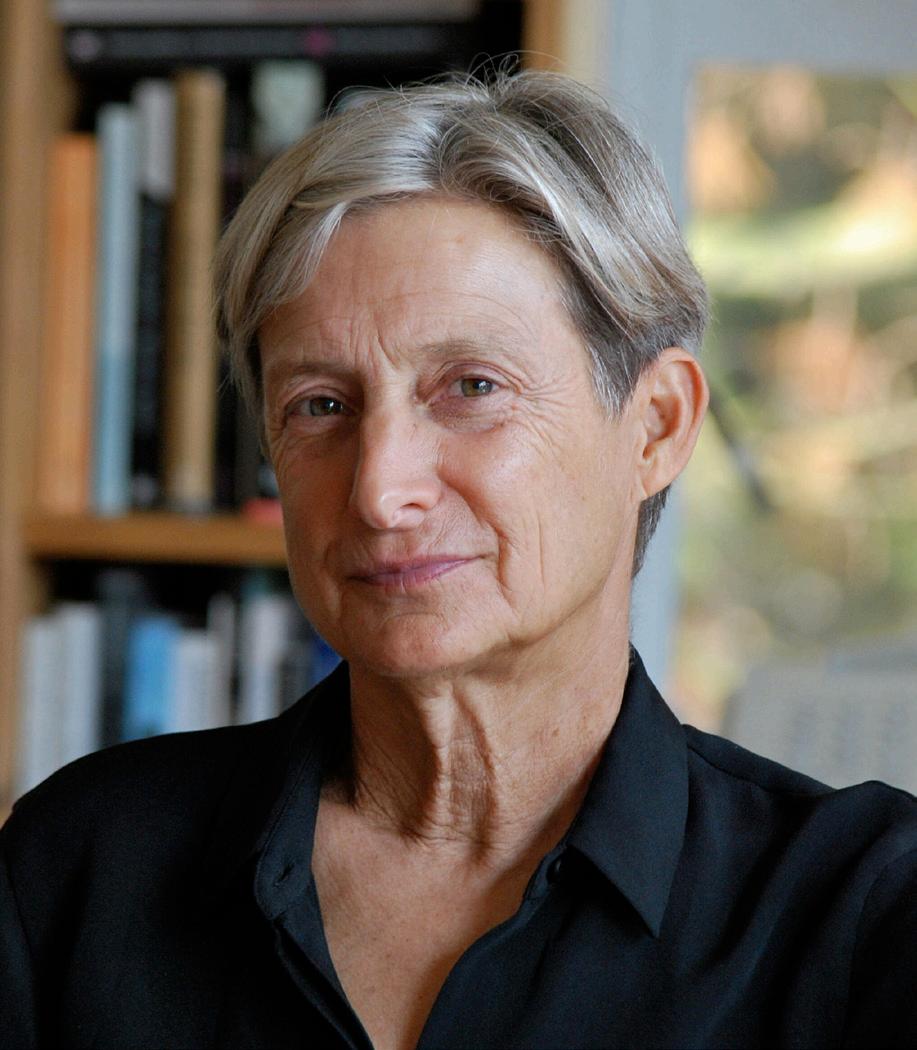
sity of California, Berkeley.
Butler rose to international prominence with the publication of their 1990 book, Gender Trouble: Feminism and the Subversion of Identity. The book introduced a radical new understanding of gender—not as something we are, but something we do. Butler argued that gender is “performative,” meaning that it is constructed through repeated actions, behaviors, and societal expectations. This idea challenged traditional views that linked gender directly to biological sex and opened up new possibilities for how individuals could express and understand their identities.
Gender Trouble became a foundational text in queer theory and feminist thought, reshaping discussions around gender, sexuality, and identity. Butler’s work gave language and legitimacy to nonbinary, transgender, and gender-nonconforming experiences, empowering individuals to resist limiting gender norms and live more authentically.
Beyond their academic influence, Butler has been an outspoken advocate for civil rights, particularly for LGBTQ+ people, women, and other marginalized groups. They have written and spoken out against homophobia, transphobia, sexism, and racism, using their platform to defend the rights of those whose voices are often silenced. Butler has consistently argued that the fight for LGBTQ+ equality must be linked to broader struggles for justice, including racial and economic equity.
Throughout their career, Butler has been active in social movements around the globe. They have supported same-sex marriage, transgender rights, and efforts to protect gender-nonconforming individuals from violence and discrimination. They have also spoken
out on international issues such as war, occupation, and refugee rights, emphasizing the need for a global approach to human dignity.
In recognition of their contributions, Butler has received numerous honors and awards, including the Adorno Prize and honorary degrees from institutions around the world. Yet perhaps their greatest legacy lies in how their ideas have helped people understand themselves and others in deeper, more compassionate ways.
Judith Butler’s work continues to challenge injustice and inspire change. Through their powerful blend of theory and activism, they have expanded the boundaries of feminism and LGBTQ+ advocacy, encouraging people everywhere to question harmful norms and imagine new ways of being. Their voice remains one of the most vital in the ongoing pursuit of equality and human rights.
HILLARY RODHAM CLIN-
TON is one of the most prominent and influential figures in American political history. As a former First Lady, U.S. Senator, Secretary of State, and the first woman nominated for president by a major political party, Clinton has spent her career breaking barriers and advocating for the civil rights of women and the LGBTQ+ community. Through her work in public service, law, and global diplomacy, she has championed equality, inclusion, and human rights, leaving a lasting legacy on both national and international stages.
Born on October 26, 1947, in Chicago, Illinois, Hillary Rodham was raised in a middle-class household where she learned the values of hard work, service, and resilience. She attended Wellesley Col-
lege, where she served as student body president and delivered a widely acclaimed commencement speech that signaled her emerging leadership. She went on to study law at Yale University, where she met her future husband, Bill Clinton.
Even early in her career, Clinton showed a strong commitment to social justice. After graduating from Yale Law School in 1973, she worked as a staff attorney for the Children’s Defense Fund, advocating for children with disabilities and those living in poverty. Her early work reflected her lifelong belief that the government should play a role in protecting society’s most vulnerable citizens.
As First Lady of the United States from 1993 to 2001, Hillary Clinton redefined the role, becoming an active and influential policy advocate. One of her most famous moments came in 1995, when she delivered a powerful speech at the United Nations Fourth World Conference on Women in Beijing. Her declaration that “human rights are women’s rights and women’s rights are human rights” resonated across the globe and became a rallying cry for women’s empowerment and equality.
Throughout her time in the White House and beyond, Clinton focused on improving health care, access to education, and economic opportunities for women and families. She also worked to combat gender-based violence, promote reproductive rights, and support women’s leadership around the world.
Her commitment to civil rights extended to the LGBTQ+ community as well. While her views evolved over time—as did much of American society—Clinton became a vocal and committed advocate for LGBTQ+ rights, especially during
her tenure as Secretary of State under President Barack Obama from 2009 to 2013. In 2011, she delivered a landmark speech to the United Nations in Geneva, stating unequivocally that “gay rights are human rights and human rights are gay rights.” Under her leadership, the State Department made significant progress in supporting LGBTQ+ diplomats and promoting equality in U.S. foreign policy, including offering benefits to samesex partners of foreign service employees and speaking out against anti-LGBTQ+ laws abroad.
In 2016, Hillary Clinton made history by becoming the first woman nominated for president by a major U.S. political party.
Her candidacy was a milestone in American politics and symbolized decades of progress for women’s rights. Her platform included strong support for gender equality, LGBTQ+ rights, affordable health care, paid family leave, and equal pay. She campaigned on a vision of a more inclusive America, where people of all backgrounds, genders, and identities could thrive.
Although she narrowly lost the election, Clinton won the popular vote by nearly 3 million votes, and her campaign inspired millions of women and girls to believe in their potential to lead. She continued her work after the election by founding Onward Together, a political action organization that supports progres-
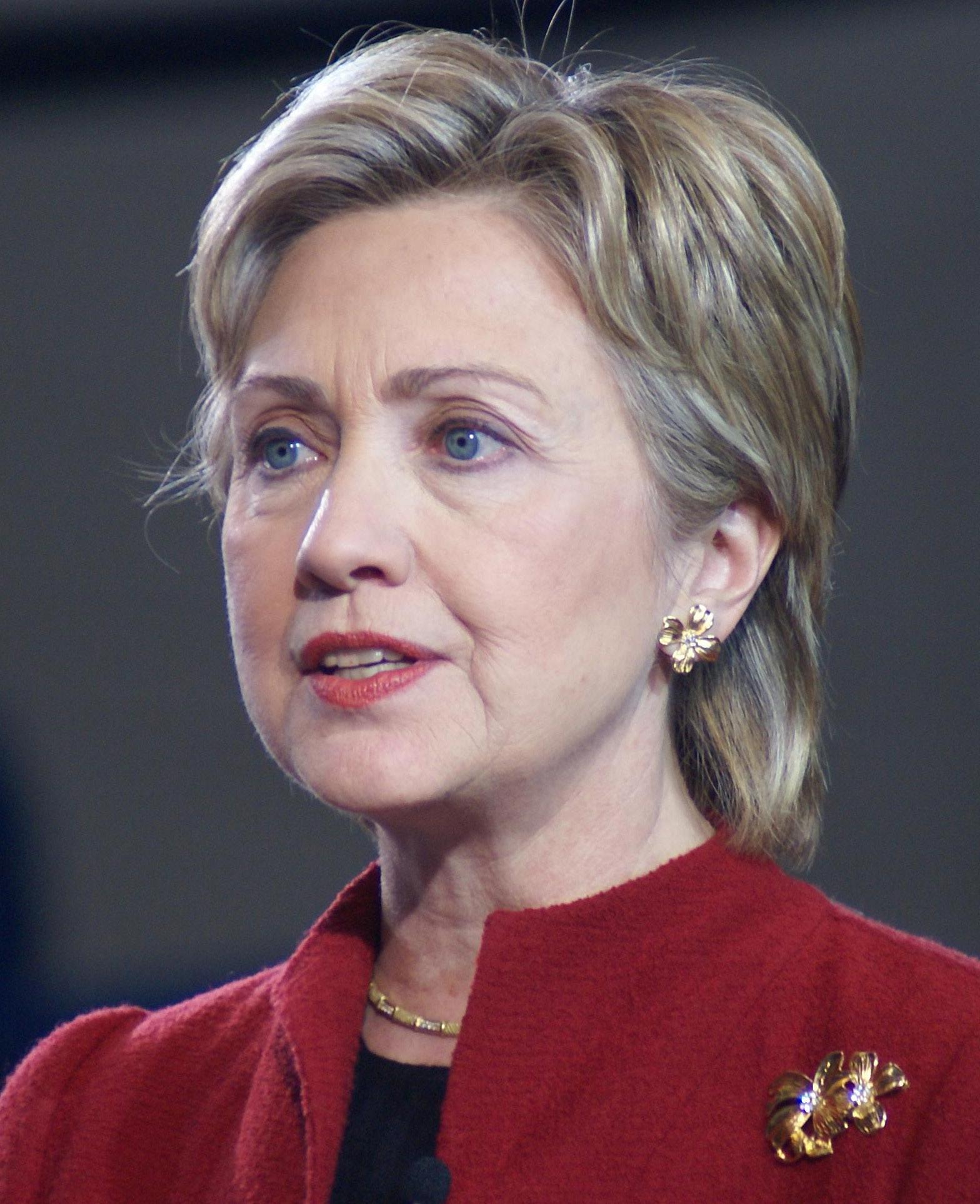
sive groups working for justice, equity, and democratic participation. Clinton has also continued to write, speak, and advocate on behalf of the causes she has long championed. Her books—including Living History, Hard Choices, and What Happened—offer insight into her public life and the challenges of leadership, especially as a woman navigating the highest levels of power. Through her words and actions, she has encouraged future generations to speak out, stand strong, and pursue change.
Hillary Rodham Clinton’s legacy is defined by her tireless advocacy for civil rights, especially for women and the LGBTQ+ community. She has opened doors, challenged norms, and pushed forward the idea that every person— regardless of gender, orientation, or background—deserves equal opportunity, dignity, and respect. Her life’s work continues to inspire those who fight for a more just and inclusive society.
ANGELA DAVIS is a renowned scholar, author, and activist who has spent decades at the forefront of the struggle for justice, equality, and liberation. With her lifelong commitment to civil rights, she has become an enduring symbol of resistance and a powerful advocate for women, the LGBTQ+ community, and all marginalized people.
Born on January 26, 1944, in Birmingham, Alabama, Angela Yvonne Davis grew up in the deeply segregated South. Her early life was shaped by the violence and racism of the Jim Crow era, as well as by the activism of her community. She became politically aware at a young age, joining youth organizations and reading revolutionary literature. These formative experi-
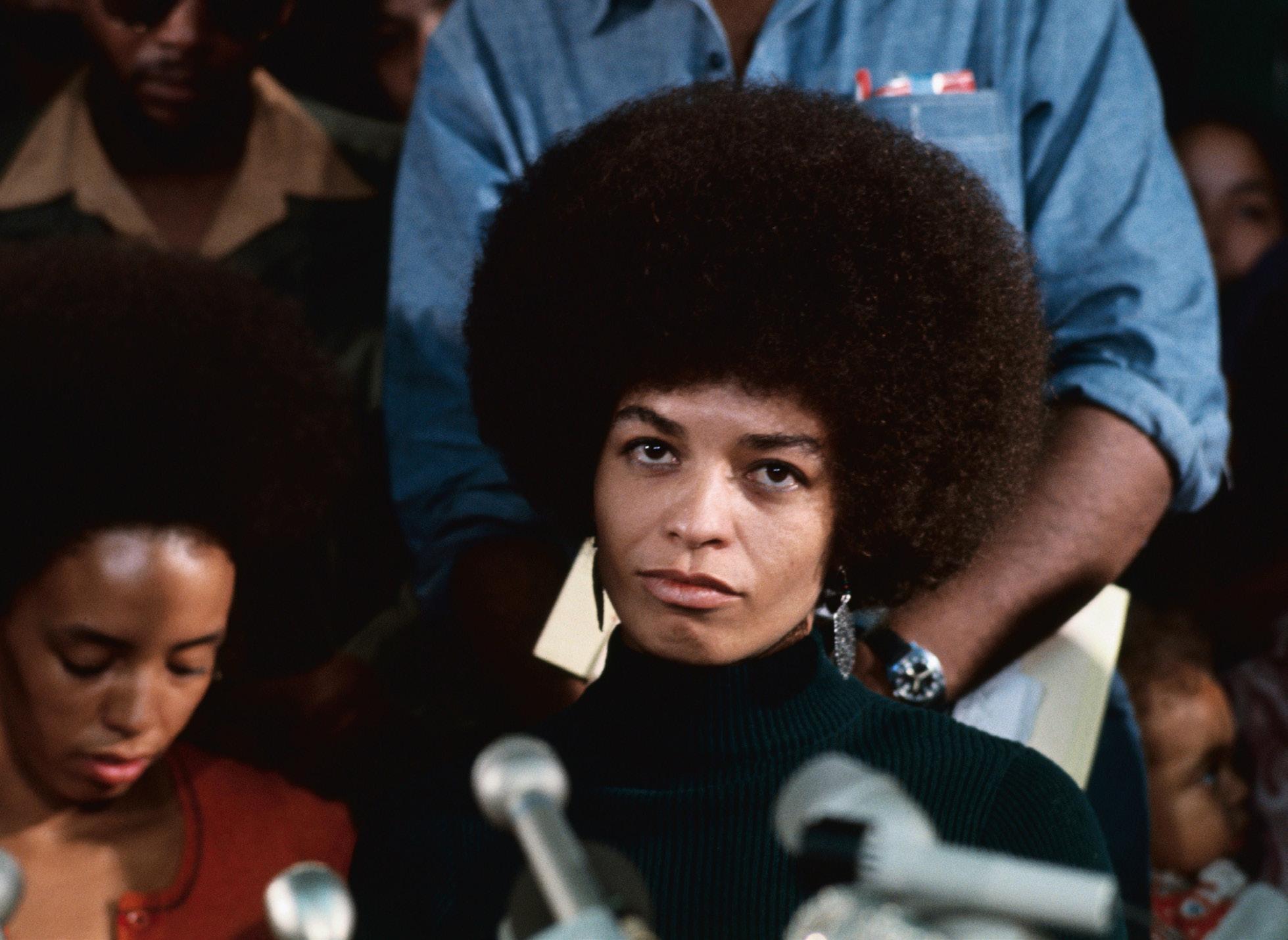
ences laid the foundation for a lifetime of activism.
Davis studied philosophy in Europe and later earned a graduate degree from the University of California, San Diego. By the late 1960s, she had joined both the Communist Party USA and the Black Panther Party, recognizing the need to address capitalism, racism, and patriarchy as interconnected systems of oppression.
Angela Davis became internationally known in the early 1970s when she was falsely accused of involvement in a courtroom incident that resulted in several deaths. After a highly publicized trial, she was acquitted of all charges. Her imprisonment and trial sparked a global movement to “Free Angela,” uniting people across races, countries, and political movements in
solidarity.
Throughout her career, Davis has worked to dismantle systems of oppression that harm women, LGBTQ+ people, and communities of color. As a feminist thinker, she has consistently critiqued mainstream feminism for excluding the voices and experiences of Black, poor, and queer women. Her writing—particularly in books like Women, Race & Class and Freedom Is a Constant Struggle—has helped shape the framework of intersectional feminism, a movement that recognizes how race, gender, class, and sexuality overlap and influence each other.
Davis has also been a vocal ally of the LGBTQ+ community. Openly queer herself, she has spoken and written about the importance of including LGBTQ+ rights in the
broader fight for social justice. She has highlighted how queer and trans people—especially those of color—face disproportionate violence, incarceration, and poverty, and she advocates for their full inclusion in movements for liberation.
One of Davis’s most influential contributions has been her critique of the prison-industrial complex. She is a founding member of Critical Resistance, an organization working to abolish the prison system and replace it with models of restorative justice. Her belief that true justice cannot be found within systems designed to oppress is a central part of her work and activism.
Angela Davis continues to inspire new generations of activists around the world. Through her
writing, teaching, and organizing, she reminds us that the struggle for freedom is ongoing—and that it must include all people, regardless of race, gender, or sexuality. Her unwavering commitment to justice makes her one of the most important voices of our time.
GERALDINE FERRARO was a pioneering politician, lawyer, and advocate who broke barriers for women in American politics and stood as a powerful ally for the LGBTQ+ community. Best known as the first woman to be nominated for vice president on a major party ticket in the United States, Ferraro’s legacy is one of courage, dedication, and commitment to civil rights and equality.
Born on August 26, 1935, in Newburgh, New York, Geraldine Anne Ferraro was the daughter of Italian immigrants. After losing her father at a young age, she was raised by her mother, who emphasized the value of education and hard work. Ferraro went on to earn her degree from Marymount Man-
hattan College and, in 1960, her law degree from Fordham University—one of only two women in her class.
Ferraro began her career as a public school teacher before becoming an assistant district attorney in Queens, New York. There, she specialized in prosecuting crimes against women and children. Her work as a prosecutor revealed her passion for justice and her deep empathy for vulnerable populations, setting the stage for her later political career.
In 1978, Ferraro was elected to the U.S. House of Representatives, representing New York’s 9th congressional district. During her three terms in Congress, she championed issues such as equal pay, reproductive rights, and economic justice for women and working families. She was a strong supporter of the Equal Rights Amendment and advocated for policies that expanded access to healthcare, childcare, and education.
Ferraro’s most historic moment came in 1984 when Democratic presidential nominee Walter
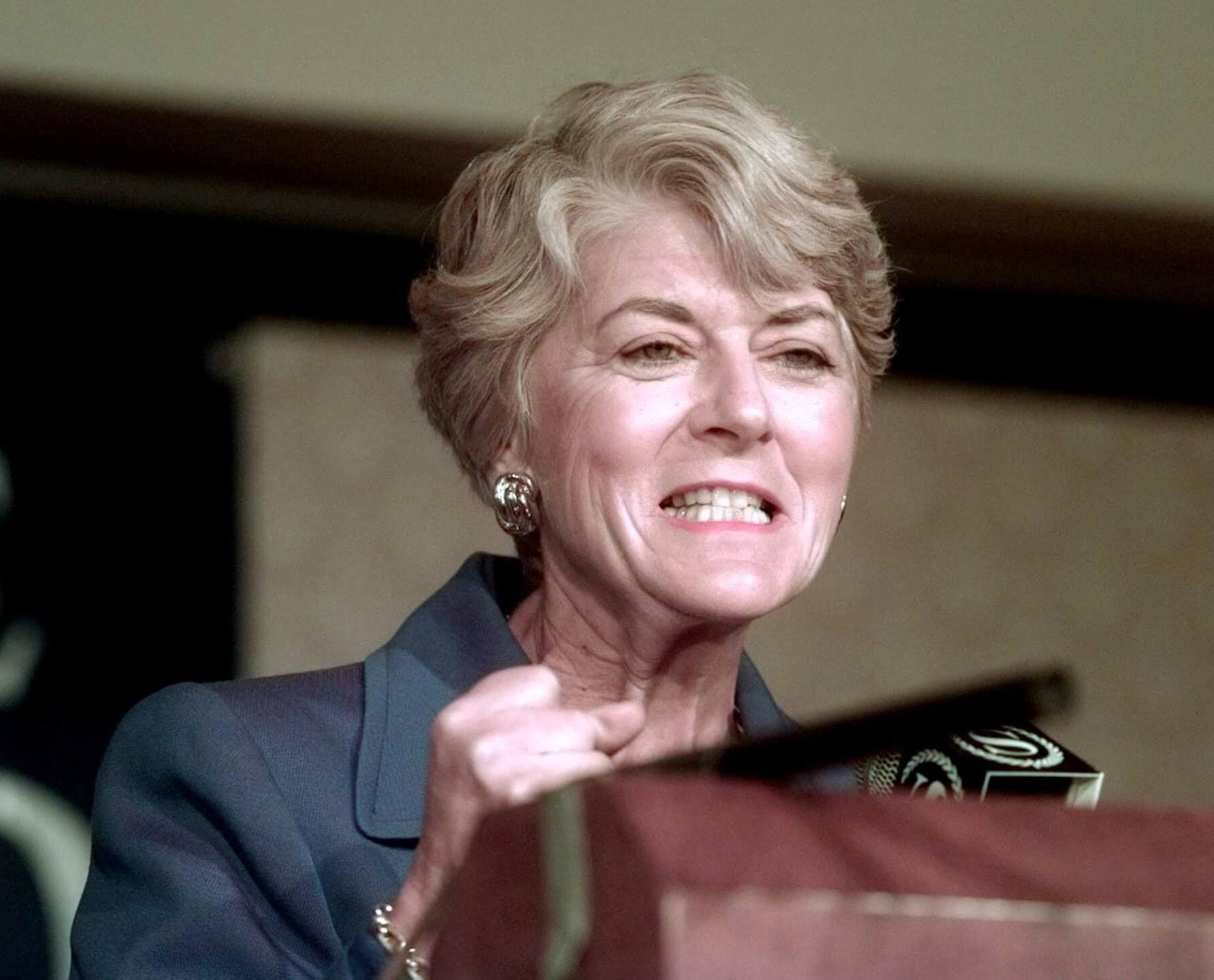
Mondale chose her as his running mate. With that nomination, Ferraro became the first woman to run for national office on a major party ticket in U.S. history. Her candidacy was a watershed moment for women in American politics, symbolizing a long-overdue recognition of women’s leadership and capabilities on the national stage. Though the Mondale-Ferraro ticket did not win the election, her candidacy opened doors and inspired countless women to run for office.
Throughout her political career and beyond, Ferraro was also a vocal ally of the LGBTQ+ community. At a time when LGBTQ+ rights were often ignored or politically risky to support, she stood in favor of equality. She supported funding for HIV/AIDS research during the height of the crisis, advocated for anti-discrimination protections, and spoke out in favor of civil rights for gay and lesbian Americans. Her inclusive approach to politics helped build bridges and emphasized that human rights should never be up for debate.
After leaving Congress, Ferraro continued to serve the public in various roles, including as U.S. Ambassador to the United Nations Human Rights Commission under President Bill Clinton. She remained active in politics, law, and advocacy until her passing in 2011.
Geraldine Ferraro’s legacy is one of bold leadership, integrity, and a deep commitment to justice. She changed the political landscape for women and fought for a more inclusive and equitable America for all.
BETTY FRIEDAN was a trailblazing writer, feminist, and activist whose work helped spark the modern women’s rights movement and advance
civil rights for both women and the LGBTQ+ community. Through her groundbreaking writing and tireless advocacy, she challenged deeply rooted societal norms and inspired millions to demand equality, freedom, and dignity. Her legacy endures as a cornerstone of American feminism and progressive social change.
Born on February 4, 1921, in Peoria, Illinois, Friedan (née Goldstein) excelled academically from a young age. She studied psychology at Smith College, graduating in 1942, and went on to attend graduate school at the University of California, Berkeley. Though she initially pursued journalism and writing, her most enduring impact would come through activism. As she navigated the roles of wife and mother in post-World War II America, she began to sense a deep dissatisfaction shared by many women of her generation—a feeling that their ambitions, intellect, and potential were being stifled by a culture that defined their worth solely in terms of domestic roles.
This insight led to the publication of her landmark 1963 book, The Feminine Mystique. In it, Friedan coined the phrase “the problem that has no name,” describing the widespread unhappiness of women who felt unfulfilled despite living in comfort and apparent privilege. The book struck a powerful chord across the country and is widely credited with igniting the second wave of feminism in the United States. The Feminine Mystique challenged the prevailing notion that women could only find identity and purpose through marriage and motherhood. It encouraged women to pursue education, careers, and personal growth—fundamentally reshaping public discourse around gender roles.
In 1966, Friedan co-found-
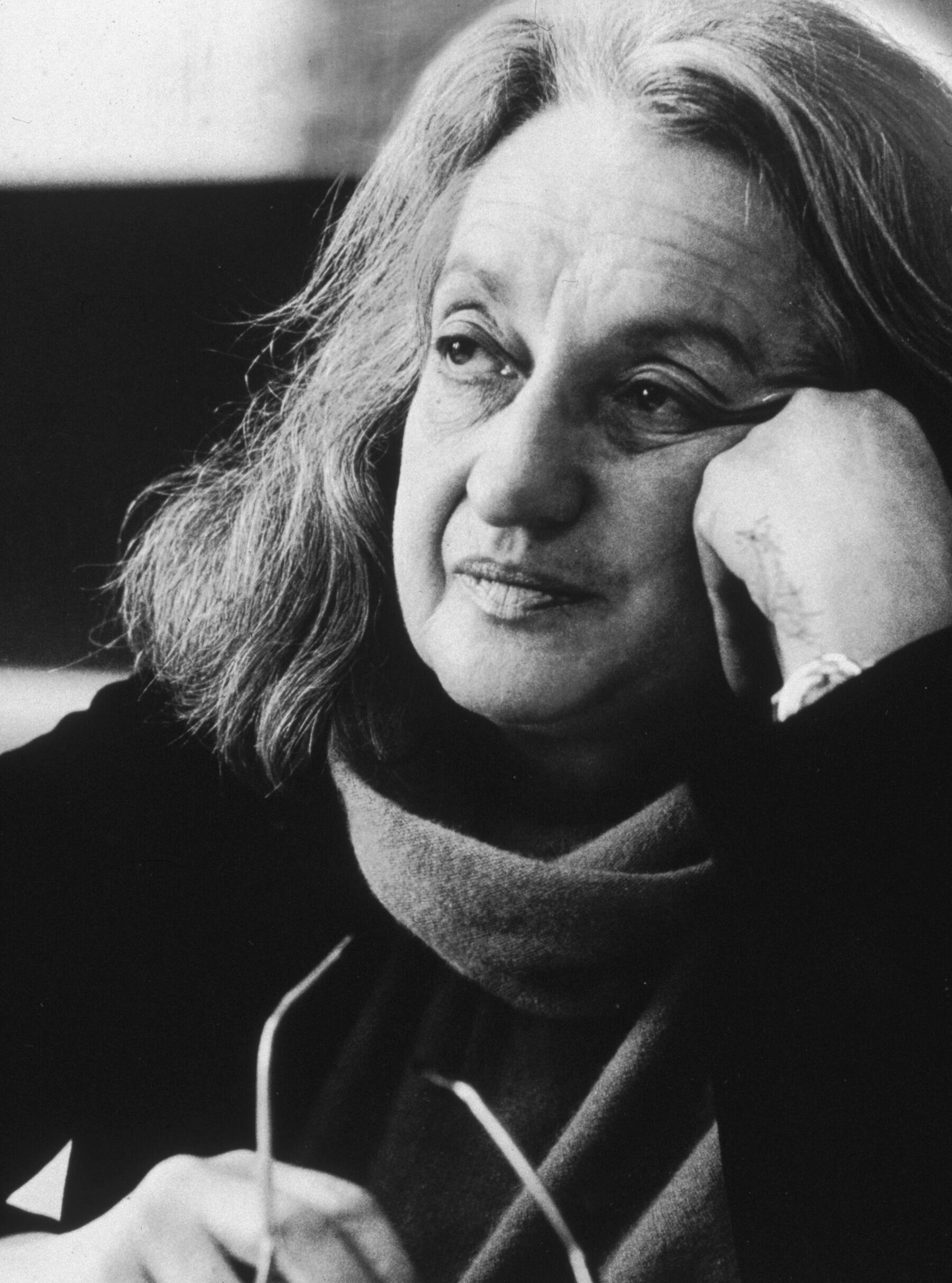
ed the National Organization for Women (NOW), becoming its first president. Under her leadership, NOW focused on advocating for gender equality in employment, education, reproductive rights, and politics. The organization quickly became the leading voice for women’s civil rights, pushing for the enforcement of Title VII of the Civil Rights Act, which banned discrimination based on sex, and advocating for the Equal Rights Amendment. Friedan’s efforts helped transform the legal and social status of American women, opening doors that had long been closed. While Friedan’s early work pri-
marily centered on issues facing white, middle-class women, she evolved in her views and approach as the movement expanded. In later years, she emphasized coalition-building and sought to unify various feminist voices, even when they differed in opinion or background.
Though her relationship with the LGBTQ+ community was complex and, at times, controversial, Friedan’s role in advancing civil rights cannot be overlooked. Initially, she expressed concerns that including lesbian issues might hinder the women’s movement’s mainstream acceptance. However,
she later acknowledged the importance of inclusivity and LGBTQ+ rights as integral to the feminist cause. By the 1980s, Friedan publicly supported LGBTQ+ inclusion and rights, stating that the movement should embrace the diversity of women’s experiences, including sexual orientation. Her shift reflected a growing understanding that the struggle for equality must encompass all marginalized groups.
Beyond her activism, Friedan was a prolific writer and thinker. Her later books, such as The Second Stage (1981) and The Fountain of Age (1993), continued to explore the evolving roles of women in society. She tackled issues like work-life balance, aging, and intergenerational feminism, always encouraging reflection, growth, and empowerment.
Friedan also helped organize the 1970 Women’s Strike for Equality, a nationwide protest marking the 50th anniversary of women’s suffrage. Tens of thousands of women marched in cities across the country to demand equal opportunities in work, education, and political participation. This event symbolized a turning point in the women’s rights movement and helped bring feminist issues to the forefront of national consciousness.
Throughout her life, Betty Friedan remained a passionate advocate for justice, equality, and human dignity. She believed in the power of ordinary people—especially women—to change the world through action, unity, and vision. Her work laid the foundation for countless legal, cultural, and societal advances, and she inspired generations to fight for a better, fairer future.
Betty Friedan passed away in 2006 on her 85th birthday, but her
influence remains profound. As a pioneer of modern feminism and a voice for social change, she empowered people of all genders and identities to speak out, demand their rights, and live authentically. Her legacy is one of courage, transformation, and enduring hope for equality for all.
ALLEN GINSBERG was a revolutionary poet, activist, and cultural icon whose words and actions helped shape the American counterculture and civil rights movements of the 20th century. As one of the leading figures of the Beat Generation, Ginsberg used poetry to challenge social norms, advocate for personal freedom, and promote justice for women, the LGBTQ+ community, and other marginalized groups. His fearless commitment to truth, equality, and compassion made him a powerful force in the struggle for civil rights.
Born on June 3, 1926, in Newark, New Jersey, Irwin Allen Ginsberg was raised in a Jewish household by politically engaged parents. His mother’s struggles with mental illness and his father’s love of poetry had a profound impact on his early life and creative development. Ginsberg attended Columbia University, where he met other key figures of the Beat movement, including Jack Kerouac, William S. Burroughs, and Neal Cassady. Together, they sought to break free from the conformity of postwar America and explore new ways of thinking, writing, and living.
Ginsberg rose to fame in 1956 with the publication of his groundbreaking poem “Howl.” The poem, with its raw and unfiltered language, denounced the materialism, oppression, and hypocrisy of modern society. It also celebrated queer
identity and personal liberation, boldly addressing themes of sexuality at a time when doing so was considered taboo—and even criminal. “Howl” became the subject of a landmark obscenity trial, and when the court ruled in Ginsberg’s favor, it marked a major victory for freedom of expression and artistic innovation.
As an openly gay man in a time of widespread homophobia, Ginsberg was a fearless advocate for LGBTQ+ rights. He used his platform not only to celebrate queer love and identity in his work but also to speak out against the laws and social norms that discriminated against LGBTQ+ people. His openness helped pave the way for future generations of queer artists and activists to live authentically and fight for equality.
Ginsberg’s activism extended far beyond LGBTQ+ issues. He was a passionate advocate for women’s rights and gender equality. He
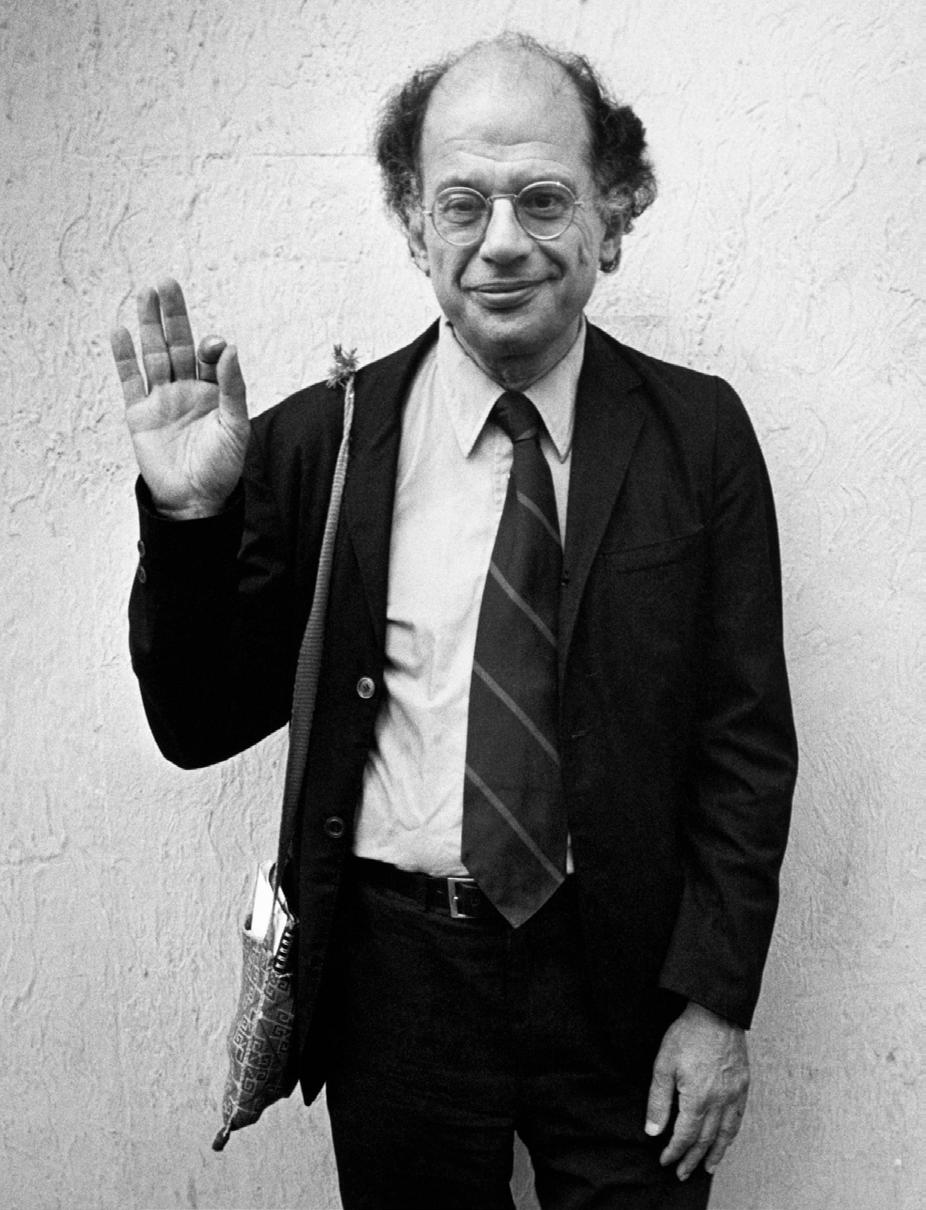
spoke out against sexism and supported feminist causes throughout his life. He also opposed the Vietnam War, protested nuclear weapons, and championed the rights of oppressed people around the world. His belief in nonviolence, free speech, and human dignity made him a natural ally in many civil rights movements.
In addition to his activism, Ginsberg was a lifelong student of Eastern philosophy and a practitioner of Buddhism. His spiritual outlook informed much of his work and guided his vision of a more compassionate, peaceful, and interconnected world.
Allen Ginsberg passed away in 1997, but his influence lives on. Through his poetry and activism, he expanded the boundaries of American literature and helped shape a more inclusive and open society. Ginsberg’s legacy is one of courage, creativity, and an unwavering belief in the power of love and liberation.
RUTH BADER GINSBURG, affectionately known as RBG, was a pioneering legal mind, a fierce advocate for civil rights, and a tireless champion of justice. As the second woman ever appointed to the U.S. Supreme Court, Ginsburg used her voice and intellect to challenge inequality and expand protections for women, African Americans, the LGBTQ+ community, and other marginalized groups. Her legacy is one of profound legal and cultural impact—a testament to the power of perseverance, intellect, and principle.
Born on March 15, 1933, in Brooklyn, New York, Joan Ruth Bader grew up in a working-class Jewish family. Her mother, Celia, instilled in her a love of learning
and a belief in the power of education, even as she battled cancer and passed away just before Ruth’s high school graduation. Ginsburg went on to attend Cornell University, where she graduated at the top of her class and met her future husband, Martin Ginsburg. She later enrolled at Harvard Law School, one of only nine women in a class of over 500 men, and faced frequent gender-based discrimination. When her husband’s career brought them to New York,
she transferred to Columbia Law School, where she graduated first in her class in 1959.
Despite her academic excellence, Ginsburg struggled to find employment due to her gender, a reality that deeply shaped her understanding of systemic bias. She eventually began teaching law at Rutgers University and later Columbia, becoming one of the first female law professors in the country. During this time, she also co-founded the Women’s Rights
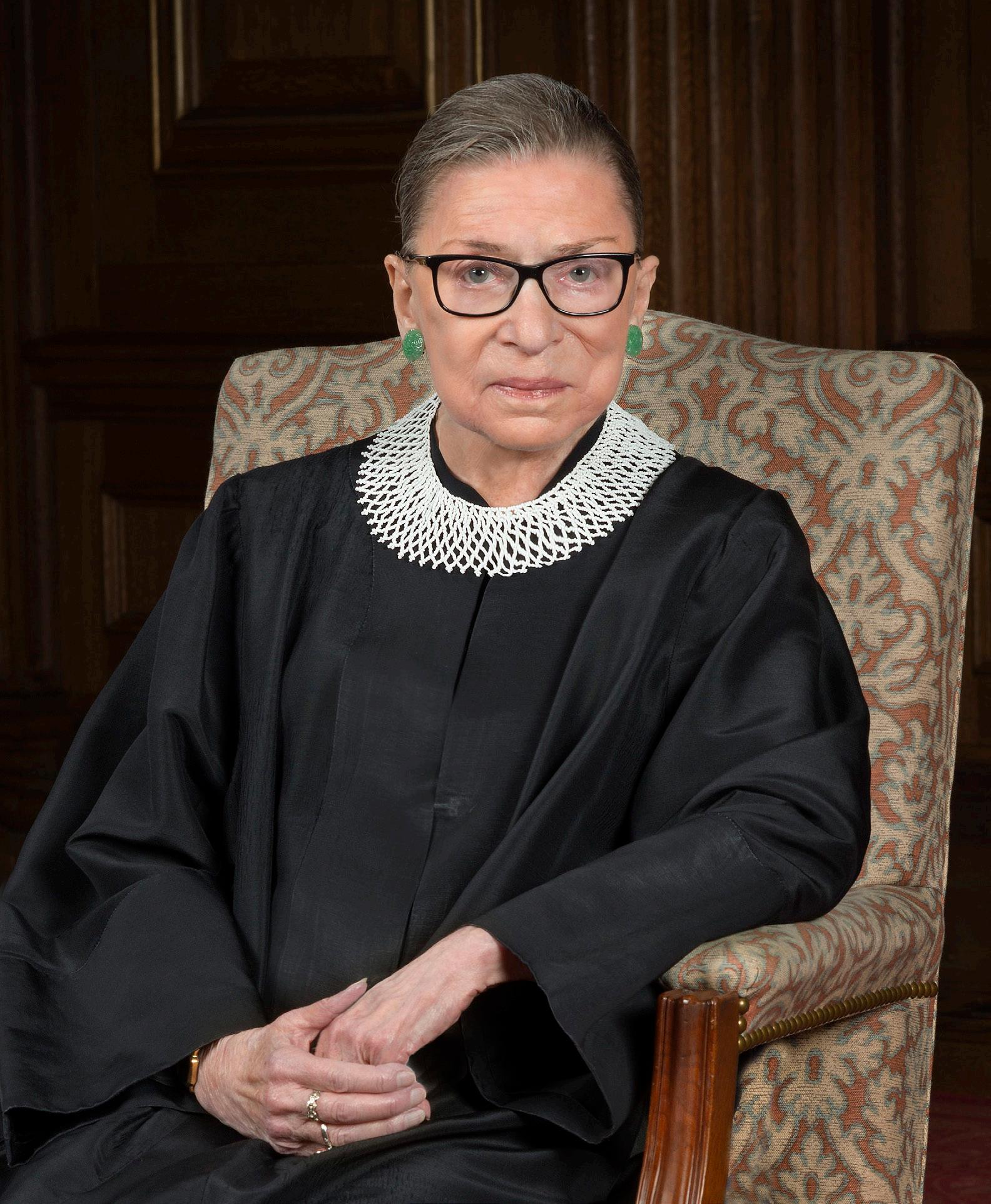
Project at the American Civil Liberties Union (ACLU), where she led a legal strategy to dismantle gender discrimination one case at a time.
Ginsburg’s approach to advancing women’s rights was methodical and deeply strategic. She argued six landmark cases before the U.S. Supreme Court in the 1970s, winning five. Rather than advocate for sweeping changes overnight, she chose cases that would highlight how gender-based laws harmed everyone, not just women. In Weinberger v. Wiesenfeld (1975), she represented a widower denied Social Security benefits because he was a man—showing that rigid gender roles were detrimental to both sexes. Her careful, incremental approach laid the groundwork for modern gender equality under the law.
In 1993, President Bill Clinton appointed Ginsburg to the Supreme Court. From the bench, she became a powerful voice for civil liberties, fairness, and equality. She wrote majority opinions that protected reproductive rights, strengthened anti-discrimination laws, and expanded access to education. One of her most famous dissents came in Ledbetter v. Goodyear Tire & Rubber Co. (2007), where the Court ruled against a woman who sued for pay discrimination. Ginsburg’s passionate dissent called on Congress to act—and it did. The Lilly Ledbetter Fair Pay Act of 2009 was the first bill signed into law by President Barack Obama.
Beyond women’s rights, Ginsburg was also a strong supporter of racial justice. She joined rulings that upheld the Voting Rights Act, fought racial gerrymandering, and protected the civil rights of African Americans. She understood the interconnectedness of different forms of oppression and often drew parallels between the strug-
gles of women and people of color. In her legal philosophy, equality was indivisible—no one group could be truly free while others were oppressed.
Ginsburg was also a pivotal figure in advancing LGBTQ+ rights. She consistently supported decisions that affirmed the dignity and rights of LGBTQ+ individuals. In United States v. Windsor (2013), she joined the majority in striking down the Defense of Marriage Act (DOMA), a decision that paved the way for nationwide marriage equality. Two years later, in Obergefell v. Hodges (2015), she again voted with the majority to legalize same-sex marriage across the United States. Her support extended beyond the bench—she officiated same-sex weddings and publicly voiced her belief in the right to love and marry freely.
Despite health challenges, including multiple bouts of cancer, Ginsburg remained committed to her work. Her resilience, work ethic, and dedication earned her a devoted following. She became a pop culture icon in her later years, affectionately dubbed “The Notorious RBG,” celebrated for her sharp wit, powerful dissents, and stylish lace collars.
Ruth Bader Ginsburg passed away on September 18, 2020, at the age of 87. Her death marked the end of an era, but her legacy continues to shape American law and society. She broke barriers not only through her judicial opinions but through her very presence on the Court—a woman, a Jew, a mother, and a lifelong fighter for justice. Ginsburg once said, “Fight for the things that you care about, but do it in a way that will lead others to join you.” Through her intellect, integrity, and unshakable belief in equality, she brought people together and moved the nation closer
to its founding promise of liberty and justice for all. Ruth Bader Ginsburg’s life was a testament to the enduring power of the law as a force for good, and her influence will be felt for generations to come.
KAMALA HARRIS is a groundbreaking political leader, lawyer, and advocate for civil rights who has dedicated her life to advancing justice and equity for all. As the first woman, the first Black person, and the first person of South Asian descent to serve as Vice President of the United States, Harris has shattered historic barriers and become a powerful symbol of progress. Her career has been marked by a strong commitment to women’s rights, LGBTQ+ equality, and social justice.
Born on October 20, 1964, in Oakland, California, Kamala Devi Harris was raised in a diverse and politically active household. Her mother, a breast cancer researcher from India, and her father, an economist from Jamaica, instilled in her a deep respect for education, justice, and community involvement. From an early age, Harris was inspired by the civil rights movement and attended marches and protests with her parents. After earning degrees from Howard University and the University of California, Hastings College of the Law, Harris began her career as a prosecutor. In 2003, she was elected District Attorney of San Francisco, becoming the first woman and first person of color to hold that position. She later served as California’s Attorney General—the first Black woman to do so—and then as a U.S. Senator beginning in 2017.
Throughout her career, Harris has been a consistent advocate

for women’s rights. As Attorney General, she worked to combat human trafficking and protect victims of domestic violence. She also supported legislation aimed at ensuring equal pay for women and expanding access to reproductive healthcare. In the Senate, she fought to defend women’s rights to make their own medical decisions and supported policies that would increase opportunities for women in the workforce.
Harris has also been a strong ally of the LGBTQ+ community. As Attorney General, she declined to defend Proposition 8, California’s ban on same-sex marriage, helping pave the way for its eventual overturn by the courts. She personally officiated some of the first samesex marriages in California after the Supreme Court ruling in 2013. In the Senate, she co-sponsored the Equality Act, which seeks to provide federal anti-discrimination protections for LGBTQ+ individuals, and has been a vocal opponent of discriminatory policies, including the transgender military ban.
As Vice President, Harris continues to support policies that promote equity and inclusion. She has championed efforts to address maternal mortality, particularly among Black and Indigenous women, and has advocated for LGBTQ+ rights both domestically and in-
ternationally. Her presence in the highest levels of government sends a powerful message about representation and the importance of diverse voices in leadership.
Kamala Harris’s life and career are testaments to the power of determination, service, and courage. She has used her platform to uplift others, break down systemic barriers, and fight for a more just and inclusive America. Her achievements have opened doors for countless individuals and set a powerful example for future generations of leaders.
BELL HOOKS was a transformative writer, teacher, and activist whose work reshaped the landscape of feminism, education, and civil rights. Known for her powerful critiques of racism, sexism, and homophobia, Hooks dedicated her life to building a more just, compassionate, and inclusive world. Her profound insights into the intersections of race, gender, class, and sexuality made her a guiding light for generations of activists and thinkers, especially within the women’s and LGBTQ+ rights movements.
Born Gloria Jean Watkins on September 25, 1952, in Hopkinsville, Kentucky, Hooks grew up in a working-class African American
family during the era of segregation. Her early experiences with racism and discrimination deeply influenced her worldview and would later become central to her writing and advocacy. She adopted the pen name “Bell Hooks”—in honor of her great-grandmother— as a way to honor her heritage and to emphasize the importance of her message over her identity.
Hooks earned her undergraduate degree at Stanford University, followed by a master’s from the University of Wisconsin-Madison and a Ph.D. from the University of California, Santa Cruz. Her academic journey laid the groundwork for a prolific career that would span over 30 books and numerous essays on feminism, race, culture, education, and love.
Her groundbreaking book Ain’t I a Woman: Black Women and Feminism (1981) challenged mainstream feminist thought by exposing how it often excluded Black women and women of color. In it, Hooks argued that the feminist movement must be intersectional—that it must address the interconnected systems of racism, sexism, and classism. Her work created space for Black
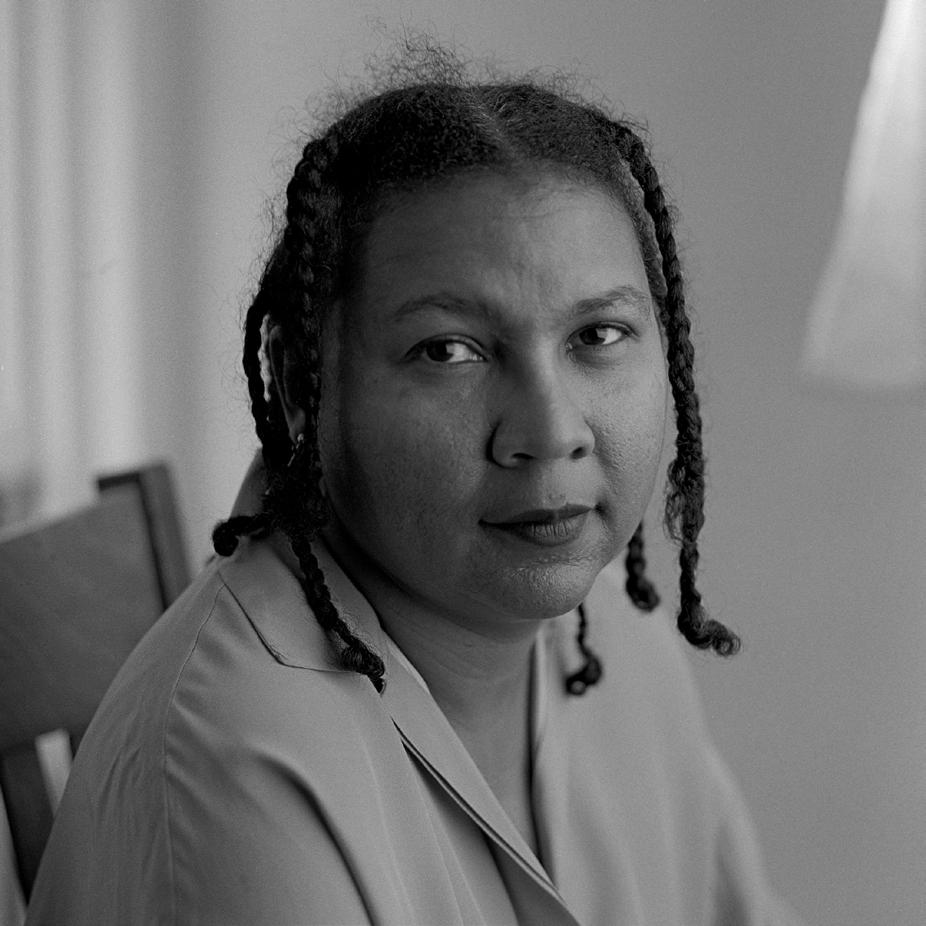
feminist voices and helped reshape feminism into a more inclusive and equitable movement.
Hooks was also a passionate advocate for LGBTQ+ rights. She believed that love and acceptance must be central to all forms of liberation. She supported queer theory and was an early proponent of the idea that gender and sexuality are not fixed, but fluid and socially constructed. Her writing welcomed and celebrated LGBTQ+ identities, and she called on feminists and activists to ensure that LGBTQ+ individuals—especially queer people of color—were not left out of the struggle for justice.
Throughout her career, Hooks emphasized the transformative power of education. She believed that classrooms should be spaces of liberation, not domination, and she championed a teaching style rooted in dialogue, respect, and critical thinking. As a professor, she inspired countless students to challenge oppression and imagine new possibilities for themselves and their communities.
Bell Hooks passed away on December 15, 2021, but her legacy lives on in the hearts of those she inspired. Her work continues to guide movements for gender justice, racial equality, and LGBTQ+ liberation. With her clarity, courage, and unwavering belief in love as a radical force, Bell Hooks showed the world that personal healing and social transformation go hand in hand. She leaves behind a body of work that continues to enlighten, challenge, and uplift those striving to create a more just and loving world.
MARSHA P. JOHNSON was a beloved and fearless advocate for LGBTQ+ rights, an outspoken voice for
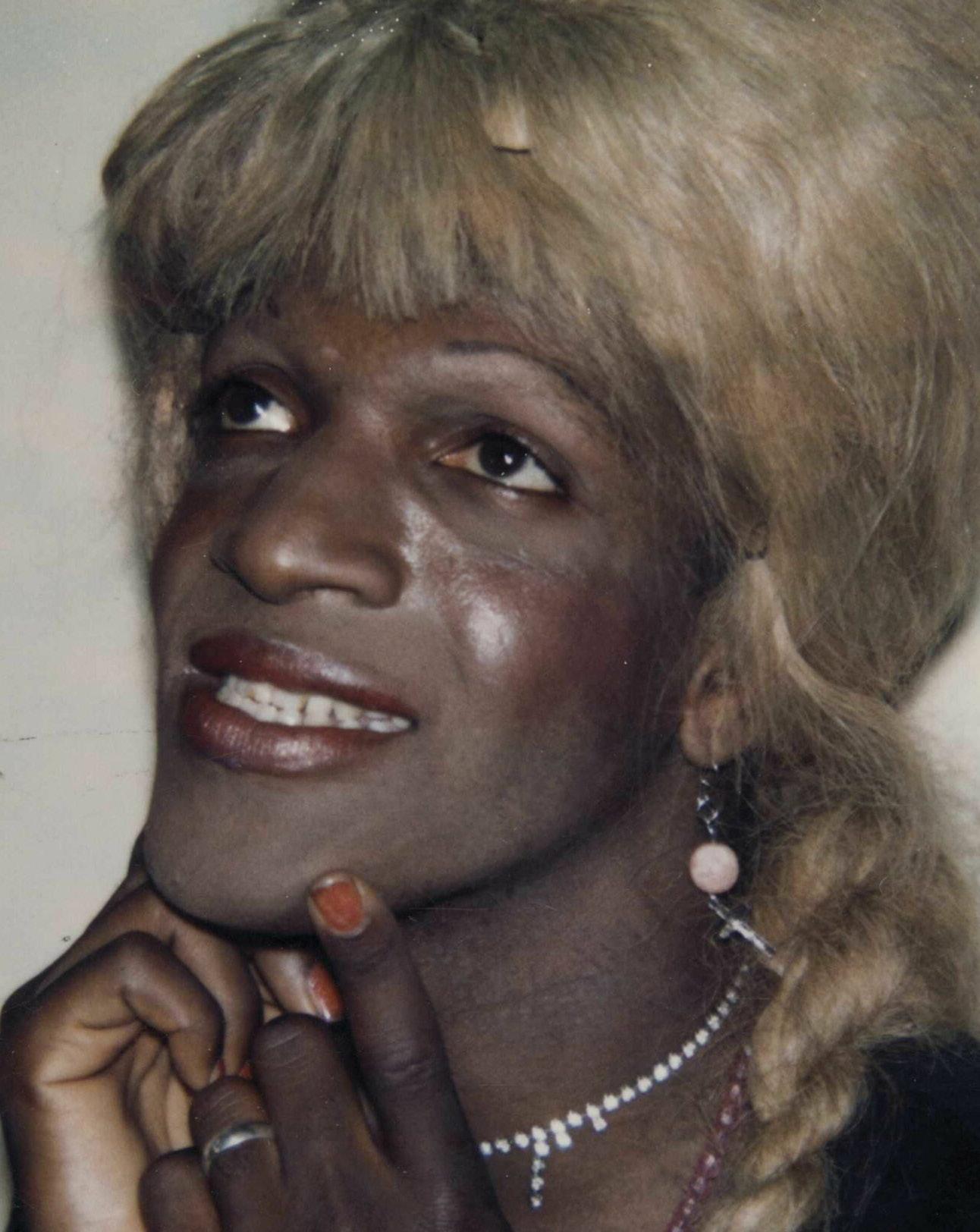
transgender women and people of color, and one of the most iconic figures in the modern civil rights movement. Best known for her role in the 1969 Stonewall uprising and for co-founding one of the first organizations to support transgender people, Johnson’s life was defined by compassion, resilience, and a tireless commitment to justice. Today, she is celebrated as a trailblazer whose legacy has inspired generations of activists fighting for equality.
Born Malcolm Michaels Jr. on August 24, 1945, in Elizabeth, New Jersey, Marsha P. Johnson grew up in a working-class African American family. From an early age, Marsha displayed a love of fash-
ion and creativity, often dressing in women’s clothing despite facing bullying and social stigma. After finishing high school, she moved to New York City with little more than a bag of clothes and a big dream: to live openly and authentically as a gay, gender-nonconforming person in a world that did not yet accept her.
Once in New York, Marsha became part of the vibrant, yet marginalized, LGBTQ+ community centered around Greenwich Village. She adopted the name Marsha P. Johnson, famously stating that the “P” stood for “Pay It No Mind”—a defiant response to anyone questioning her gender identity. This phrase became her
signature attitude toward discrimination, embodying her spirit of defiance and pride in who she was.
Marsha quickly became known for her joyful personality, generosity, and unique sense of style, often wearing crowns of flowers and glamorous, homemade outfits. She was a fixture in the drag and trans communities and became known as a “drag mother” to many homeless and queer youth, offering them emotional support and whatever resources she could.
Johnson’s most well-known act of resistance came on the night of June 28, 1969, during the Stonewall uprising. When police raided the Stonewall Inn, a gay bar in Greenwich Village, the patrons—many of them transgender people, drag queens, lesbians, and people of color—fought back. While accounts vary, Marsha is widely believed to have been one of the first to resist the police, sparking several days of protests and riots. The Stonewall uprising became a turning point in LGBTQ+ history, igniting the modern gay rights movement.
In the aftermath of Stonewall, Johnson and her close friend and fellow activist Sylvia Rivera co-founded STAR (Street Transvestite Action Revolutionaries) in 1970. STAR was one of the first organizations in the United States to focus on the needs of homeless transgender people, especially transgender women of color. The pair opened STAR House, a shelter that provided food, clothing, and support to LGBTQ+ youth who had been rejected by their families and society.
Through STAR, Johnson became a tireless advocate not just for LGBTQ+ rights, but for broader issues of poverty, police violence, and homelessness—issues that disproportionately affected queer and trans communities. She often
marched in protests, organized community events, and spoke out against injustice wherever she saw it. She also championed women’s rights, understanding that the fight for gender equality must include all women, including transgender women.
Despite enduring frequent harassment, homelessness, and physical violence, Johnson remained committed to activism and kindness. Her Christian faith informed much of her worldview; she often spoke of love, forgiveness, and service to others. She was known for giving away the little money she had to others in need and for standing up for those who had no voice.
In the 1980s, Marsha became involved with ACT UP (AIDS Coalition to Unleash Power), joining protests demanding government action to fight the AIDS crisis. Though she herself was HIV-positive, she remained focused on helping others, raising awareness about the disease and supporting her community during its darkest days.
Marsha P. Johnson’s life was tragically cut short in 1992 when her body was found in the Hudson River under suspicious circumstances. Though her death was initially ruled a suicide, friends and activists long believed foul play was involved. Her case was reopened in 2012, and her story has since received renewed attention from scholars, filmmakers, and activists.
In the years following her death, Johnson’s legacy has only grown. She has been the subject of documentaries such as The Death and Life of Marsha P. Johnson, and in 2019, New York City announced a public monument in her and Sylvia Rivera’s honor—the first in the world to recognize transgender activists. That same year, she was named one of the inaugural honorees for the National LGBTQ Wall of
Honor at the Stonewall Inn.
Marsha P. Johnson was more than just a figurehead—she was a deeply caring and courageous individual who believed in the power of love and community. Her life and activism not only helped spark a movement but also modeled what it means to fight for justice with joy and compassion. Her legacy endures in every pride march, in every shelter for LGBTQ+ youth, and in the ongoing fight for equality, dignity, and freedom for all.
CLEVE JONES is a lifelong activist, writer, and human rights advocate whose tireless work has helped shape the LGBTQ+ civil rights movement in the United States. From the early days of the gay rights struggle in San Francisco to the creation of the iconic AIDS Memorial Quilt, Jones has been a powerful voice for compassion, dignity, and justice for LGBTQ+ people and those affected by HIV/AIDS.
Born on October 11, 1954, in West Lafayette, Indiana, Cleve Jones moved with his family to Arizona and later to San Francisco in the early 1970s—a time when the city was becoming a center of LGBTQ+ activism and community. As a young gay man seeking freedom and acceptance, Jones quickly became involved in the growing movement for LGBTQ+ rights.
Jones began his activism as an intern in the office of Harvey Milk, the first openly gay elected official in California. Milk became a mentor and close friend, and Jones was deeply affected by Milk’s assassination in 1978. This tragic event strengthened his resolve to continue the fight for justice and equality. Following Milk’s death, Jones helped organize the annual candlelight vigil in San Francisco, which
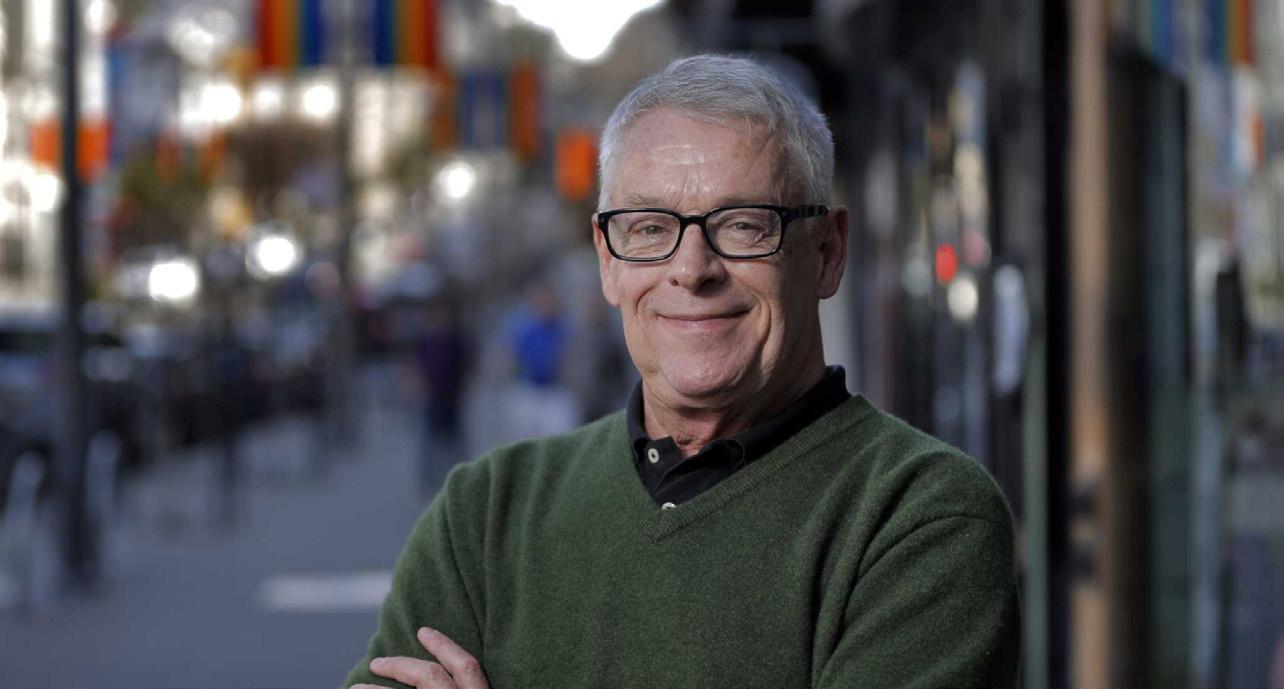
became an important moment of remembrance and solidarity for the LGBTQ+ community.
In the 1980s, as the HIV/AIDS epidemic devastated the gay community, Cleve Jones emerged as a leading voice in the fight for awareness, healthcare access, and government action. He co-founded the San Francisco AIDS Foundation, one of the earliest organizations to provide education, resources, and support for those living with HIV/ AIDS.
Jones’s most enduring and powerful contribution came in 1987 when he conceived the idea for the AIDS Memorial Quilt. Originally inspired by the traditional American quilt as a symbol of comfort and memory, Jones and a group of volunteers created individual fabric panels to honor loved ones lost to AIDS. What began as a grassroots memorial quickly grew into a national and global movement. The Quilt became a stunning visual representation of the human toll of the epidemic—each panel a name, a life, a story—and it played a crucial role in changing public perceptions of AIDS and the LGBTQ+ community.
In addition to his work on the Quilt, Jones has been a vocal advocate for LGBTQ+ rights more broadly. He has fought against discrimination, supported marriage
equality, and spoken out for the inclusion of LGBTQ+ people in all areas of society. His activism has always emphasized unity and intersectionality, recognizing that LGBTQ+ liberation is deeply connected to broader struggles for justice, including racial, economic, and gender equality.
Cleve Jones is also the author of the memoir When We Rise, which chronicles his life in activism and was adapted into a major television miniseries. Today, he continues to speak, write, and inspire new generations of advocates with his message of love, remembrance, and resilience.
Cleve Jones’s life stands as a testament to the power of community, storytelling, and unwavering commitment to justice. His legacy is one of courage, compassion, and enduring hope for a more inclusive and compassionate world.
BARBARA JORDAN was a trailblazing lawyer, educator, and politician who made history as a powerful advocate for civil rights, justice, and democratic values. As the first African American woman elected to the Texas Senate and the first Black woman from the South elected to the U.S. House of Representatives, Jordan broke barriers throughout her ca-
reer and left an indelible mark on American politics. Her work advanced civil rights for women, African Americans, and the LGBTQ+ community, and her voice remains one of moral clarity and courage in the ongoing fight for equality.
Born on February 21, 1936, in Houston, Texas, Barbara Charline Jordan grew up in a segregated neighborhood and attended allBlack schools. Her parents instilled in her a strong sense of discipline and civic responsibility. Inspired by a speech she heard as a teenager from lawyer Edith Sampson, Jordan decided to pursue a career in law and public service. She graduated from Texas Southern University and earned her law degree from Boston University.
In 1966, Jordan made history as the first Black woman elected to the Texas State Senate. During her time there, she championed fair employment practices, minimum wage laws, and anti-discrimination policies. Her intelligence, integrity, and command of legal and legislative issues quickly set her apart as a rising star.
In 1972, she was elected to the U.S. House of Representatives, becoming the first African American woman from the South to serve in Congress. She gained national at-
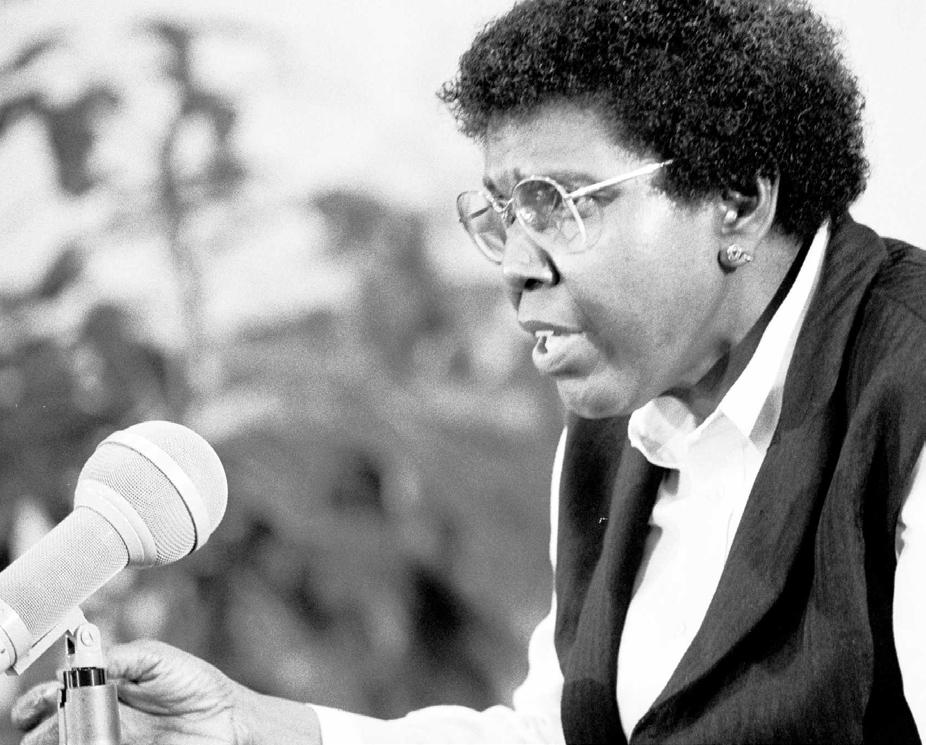
tention in 1974 with her powerful speech during the House Judiciary Committee hearings on the impeachment of President Richard Nixon. Her eloquence and firm defense of the Constitution made her a symbol of integrity and a trusted moral voice in American politics.
Barbara Jordan was a staunch advocate for civil rights and social justice. She fought tirelessly for voting rights, supported legislation to end discrimination in housing and employment, and promoted equal access to education. While she was not publicly out as a member of the LGBTQ+ community during her lifetime, Jordan had a long-term partner, Nancy Earl, who was by her side for over 20 years. Their quiet but enduring partnership has since been acknowledged as a meaningful part of Jordan’s life and identity, making her a figure of significance in LGBTQ+ history.
Her advocacy extended to women’s rights as well. Jordan supported the Equal Rights Amendment and worked to ensure that women had equal opportunities in all areas of public life. She recognized the importance of lifting up marginalized voices and consistently promoted policies that supported gender equity and social justice.
After retiring from politics due to health challenges, Jordan became a professor at the University of Texas at Austin and continued to inspire future leaders with her wisdom and example. In 1994, she received the Presidential Medal of Freedom, one of the nation’s highest civilian honors.
Barbara Jordan passed away in 1996, but her legacy lives on. She remains a role model for courage, leadership, and integrity. Her commitment to justice and equality continues to inspire generations to speak truth to power and work to-
ward a more inclusive democracy.
FRIDA KAHLO was a visionary Mexican artist whose life and work have inspired millions around the world. Renowned for her deeply personal and emotionally raw self-portraits, Kahlo used art as a means of self-expression and political resistance. Beyond her extraordinary paintings, she is celebrated as a symbol of resilience, feminism, and LGBTQ+ pride. Her unapologetic individuality and commitment to authen-
ticity made her a trailblazer in the fight for civil rights for women and the LGBTQ+ community.
Born on July 6, 1907, in Coyoacán, Mexico City, Frida Kahlo faced immense physical and emotional challenges from a young age. At six, she contracted polio, which left one of her legs shorter than the other. At 18, she suffered a near-fatal bus accident that caused severe injuries and lifelong pain. During her recovery, Kahlo began painting, using a special easel to work from her bed. Her physical suffering became a major theme in her
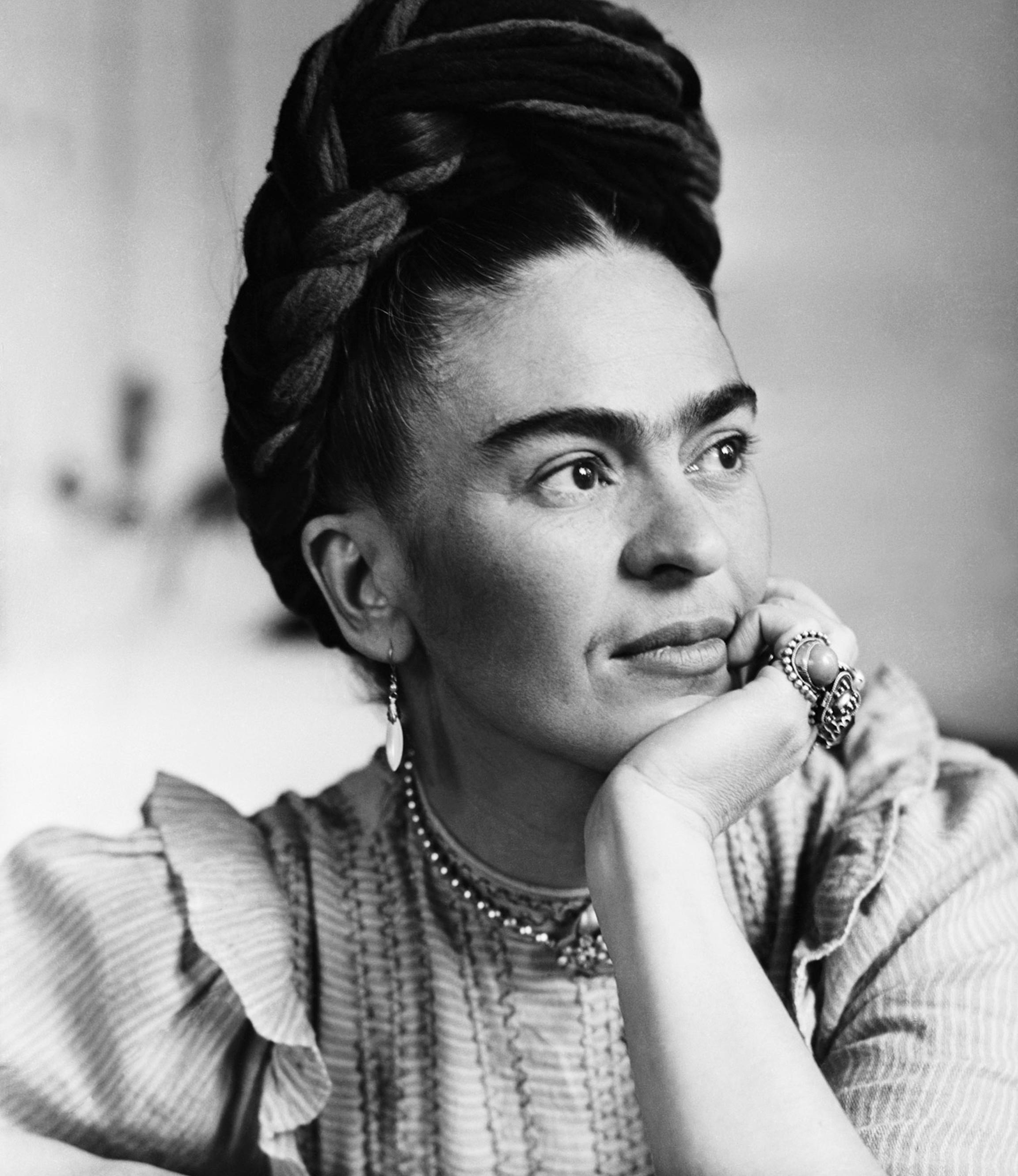
art, but it was always paired with fierce strength and vibrant self-expression.
Kahlo’s paintings often explored themes of identity, gender, pain, politics, and love. Her vivid self-portraits did not shy away from depicting the realities of her body and emotions. She defied traditional notions of femininity, portraying herself with facial hair, traditional indigenous clothing, and sometimes dressed in men’s suits. These bold choices challenged gender norms and presented a powerful image of female autonomy and complexity.
As a bisexual woman, Kahlo also broke taboos by embracing her sexuality openly. She had relationships with both men and women throughout her life, including wellknown figures like Josephine Baker and Leon Trotsky. In a time when LGBTQ+ identities were widely repressed, Kahlo’s openness was revolutionary. Her art and life created space for conversations around queerness, identity, and freedom of expression long before they entered mainstream discourse.
Kahlo was also politically active. A passionate supporter of Marxist and anti-imperialist causes, she often used her platform to advocate for social justice. Her commitment to indigenous Mexican culture, working-class struggles, and women’s rights placed her at the intersection of artistic and political resistance. She believed in uplifting marginalized voices and made her art a canvas for challenging oppression.
Though much of her fame grew after her death in 1954, Kahlo has become a global icon of empowerment. Feminist movements worldwide have embraced her as a symbol of strength, creativity, and defiance. LGBTQ+ communities celebrate her as a pioneer who
lived her truth without apology. Her image—strong, unyielding, adorned with flowers and color— has become a lasting emblem of resilience and pride.
Today, Frida Kahlo’s legacy continues to inspire artists, activists, and dreamers across the globe. Her life was a testament to the power of self-expression, the importance of challenging societal norms, and the beauty of embracing one’s full identity. Through her art and her fearless life, Frida Kahlo remains a beacon for all who fight for equality, authenticity, and liberation.
BILLIE JEAN KING is not only one of the greatest tennis players in history, but also one of the most influential advocates for gender equality and LGBTQ+ rights in the world. Over the course of her remarkable career, King broke barriers, shattered stereotypes, and used her platform to demand fairness and inclusion in sports and society. Her courage and leadership helped transform the landscape for women and LGBTQ+ individuals in ways that continue to resonate today.
Born on November 22, 1943, in Long Beach, California, Billie Jean Moffitt grew up in a working-class family that encouraged her to pursue her passions. She picked up a tennis racket at age 11 and quickly discovered her natural talent for the game. But even as a young player, King was aware of the inequities that women faced in sports. She noticed the lack of support, funding, and respect for female athletes compared to their male counterparts, and she made it her mission to change that.
King’s tennis career was extraordinary by any measure. She won 39 Grand Slam titles—12 in
singles, 16 in women’s doubles, and 11 in mixed doubles. Her aggressive style, fierce competitiveness, and strategic intelligence made her a dominant force on the court. Yet it was her actions off the court that would come to define her legacy.
In 1973, King played one of the most famous matches in sports history: the “Battle of the Sexes” against Bobby Riggs, a former Wimbledon champion who claimed that even at 55, he could beat any top female player. Riggs publicly mocked women’s tennis, framing the match as proof of male superiority. King rose to the challenge and defeated Riggs in front of more than 30,000 spectators and 90 million television viewers worldwide. The match became a cultural milestone, showing the world that women belonged in competitive sports and deserved equal respect.
But King’s fight for gender equality didn’t stop there. That same year, she founded the Women’s Tennis Association (WTA) to give female players a unified voice. She had already co-founded the Virginia Slims Circuit in 1970, a breakaway tour created to demand equal prize money for women. These bold moves laid the foundation for the professional women’s tennis tour as we know it today.
King also founded the Women’s Sports Foundation in 1974 to promote access and opportunity for girls and women in all sports. Through these initiatives, she advocated for equal pay, media representation, and Title IX enforcement, helping to create opportunities that have empowered generations of female athletes.
In addition to her groundbreaking work for women’s rights, Billie Jean King has been a powerful advocate for LGBTQ+ equality. In 1981, she was publicly outed as a lesbian—becoming the first prom-

inent female athlete to be open about her sexuality. At the time, the revelation cost her endorsements and support, but King refused to retreat. Instead, she chose honesty and integrity, continuing her activism and using her visibility to speak out for LGBTQ+ rights.
Over the years, King has become a role model for LGBTQ+ athletes and allies. She has supported same-sex marriage, spoken out against anti-LGBTQ+ legislation, and worked with organizations such as the Human Rights Campaign and GLAAD. She has emphasized the importance of living
authentically and creating safe, inclusive environments in sports, schools, and workplaces.
King’s advocacy has not gone unrecognized. She received the Presidential Medal of Freedom in 2009 from President Barack Obama, honoring her contributions to gender equality and LGBTQ+ rights.
The USTA Billie Jean King National Tennis Center in New York, home of the U.S. Open, was renamed in her honor—an unprecedented tribute for a living female athlete. In 2021, she was awarded the French Legion of Honor, one of France’s highest distinctions.
Today, Billie Jean King remains a passionate advocate for justice and equality. She continues to mentor young athletes, champion social change, and speak truth to power. Her foundation, the Billie Jean King Leadership Initiative, works to promote diversity and inclusion in the workplace and beyond.
Billie Jean King’s legacy is about more than victories on the tennis court. She has dedicated her life to leveling the playing field for all people—regardless of gender, sexual orientation, or background. Her courage, vision, and relentless pursuit of fairness have forever changed the world of sports and civil rights. She stands as a true champion—not just for herself, but for millions who have been inspired by her unwavering belief in equality, dignity, and justice.
LARRY KRAMER was a towering figure in the history of LGBTQ+ civil rights, renowned for his fearless activism, searing honesty, and unwavering commitment to justice. A playwright, novelist, and public health advocate, Kramer became one of the most influential and controversial voices in the fight against AIDS and a leading force in the struggle for LGBTQ+ equality in America.
Born on June 25, 1935, in Bridgeport, Connecticut, Lawrence David Kramer grew up in a conservative Jewish household. His early life was marked by isolation and struggle, especially as he came to terms with his sexual identity in an era when homosexuality was deeply stigmatized. He attended Yale University, where he studied English and became involved in theater, a passion that would shape his later work as a dramatist. After graduating in 1957, Kramer began
a career in the film industry, eventually earning an Academy Award nomination for his screenplay for Women in Love (1969).
Kramer’s life took a dramatic turn in the early 1980s, as the AIDS crisis began to devastate the gay community. At a time when government officials, medical institutions, and even some LGBTQ+ leaders were silent or slow to act, Kramer emerged as a relentless and uncompromising advocate for aware-
ness, accountability, and action. In 1982, he co-founded the Gay Men’s Health Crisis (GMHC), the first service organization for people living with HIV/AIDS. GMHC offered vital resources—hotlines, medical information, legal support, and compassionate care—at a time when such help was nearly nonexistent.
Frustrated by what he saw as a lack of urgency and political will, Kramer became increasingly vocal, calling out politicians, public
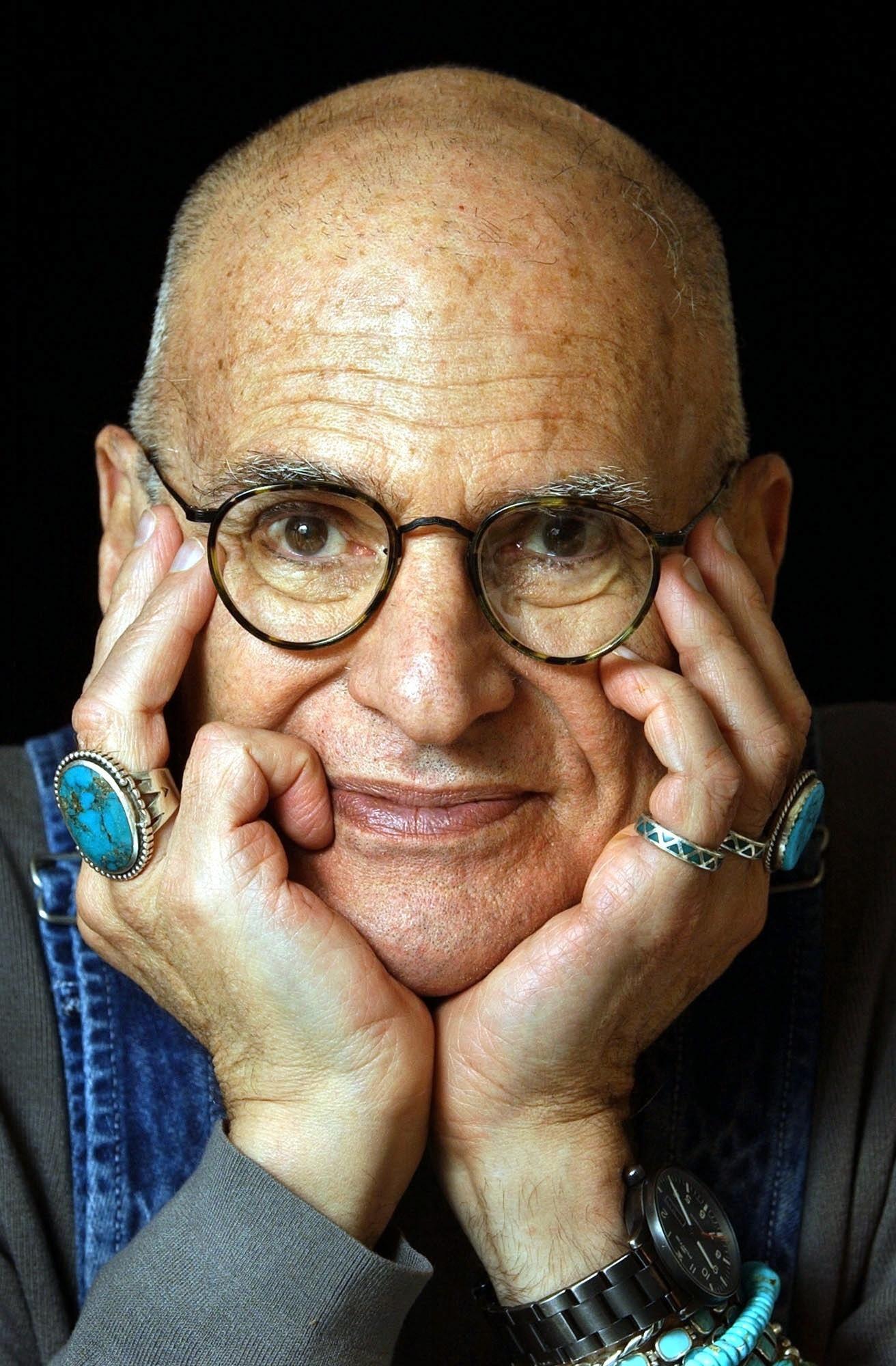
health officials, and members of the gay community for their inaction. His activism reached a new level of intensity in 1987, when he founded ACT UP (AIDS Coalition to Unleash Power), a grassroots movement dedicated to direct action and civil disobedience to demand better treatment, faster drug approval, and greater public awareness of AIDS. Under Kramer’s passionate leadership, ACT UP became one of the most effective and visible activist organizations of its time.
ACT UP’s protests—at the FDA, the National Institutes of Health, Wall Street, and even St. Patrick’s Cathedral—shocked the nation and often drew controversy. But these confrontational tactics led to tangible results: accelerated drug approvals, increased government funding for AIDS research, and broader public understanding of the epidemic. Kramer’s anger, while sometimes divisive, was fueled by love—for his community, for his friends who were dying, and for the future he envisioned for LGBTQ+ people.
Beyond activism, Kramer was also a gifted writer whose works helped shape the cultural understanding of AIDS and queer identity. His landmark 1985 play The Normal Heart is a semi-autobiographical drama that chronicles the early days of the AIDS epidemic and the personal and political conflicts it ignited. The play was a critical success and has since been revived many times, including a 2014 HBO adaptation that brought Kramer’s message to a new generation. The Normal Heart remains one of the most powerful artistic portrayals of the AIDS crisis, capturing both the heartbreak and the resilience of those who fought back.
Kramer was also a prolific author. His novel Faggots (1978), though controversial for its un-
flinching depiction of gay life in the pre-AIDS era, sparked important conversations about community, identity, and self-worth. Later in life, Kramer worked on The American People, an ambitious, two-volume fictionalized history of the United States from a queer perspective, aiming to reclaim the narrative of LGBTQ+ contributions to American history.
In his later years, Kramer continued to advocate fiercely for LGBTQ+ rights and public health. Though he battled illness—including HIV, liver disease, and a successful liver transplant—he never stopped writing, speaking out, and pushing for change. He was a relentless critic of complacency and remained deeply committed to fighting for the dignity, safety, and equality of LGBTQ+ people.
Larry Kramer passed away on May 27, 2020, at the age of 84. Tributes poured in from around the world, honoring him as a hero, a trailblazer, and a moral force. While he was often labeled as abrasive or confrontational, those who knew him best understood that his anger came from a deep place of compassion and urgency.
Kramer’s legacy is undeniable. He changed the course of history
by forcing the world to confront a deadly epidemic and recognize the humanity of those it affected. He gave voice to a community in crisis and demanded that every life be treated with value and respect. Through his words, his actions, and his unyielding spirit, Larry Kramer helped build a more just and compassionate world—and inspired countless others to do the same.
AUDRE LORDE was a groundbreaking poet, essayist, educator, and activist whose life and work championed civil rights for women, LGBTQ+ individuals, and communities of color.
A self-described “Black, lesbian, mother, warrior, poet,” Lorde used her voice as both a writer and an activist to confront injustice and empower marginalized people. Her words and vision continue to inspire generations in the fight for equality and liberation.
Born on February 18, 1934, in Harlem, New York, Audre Lorde was the daughter of Caribbean immigrants. From a young age, she expressed herself through poetry, finding refuge in language and literature. By high school, she was publishing her work and had devel-
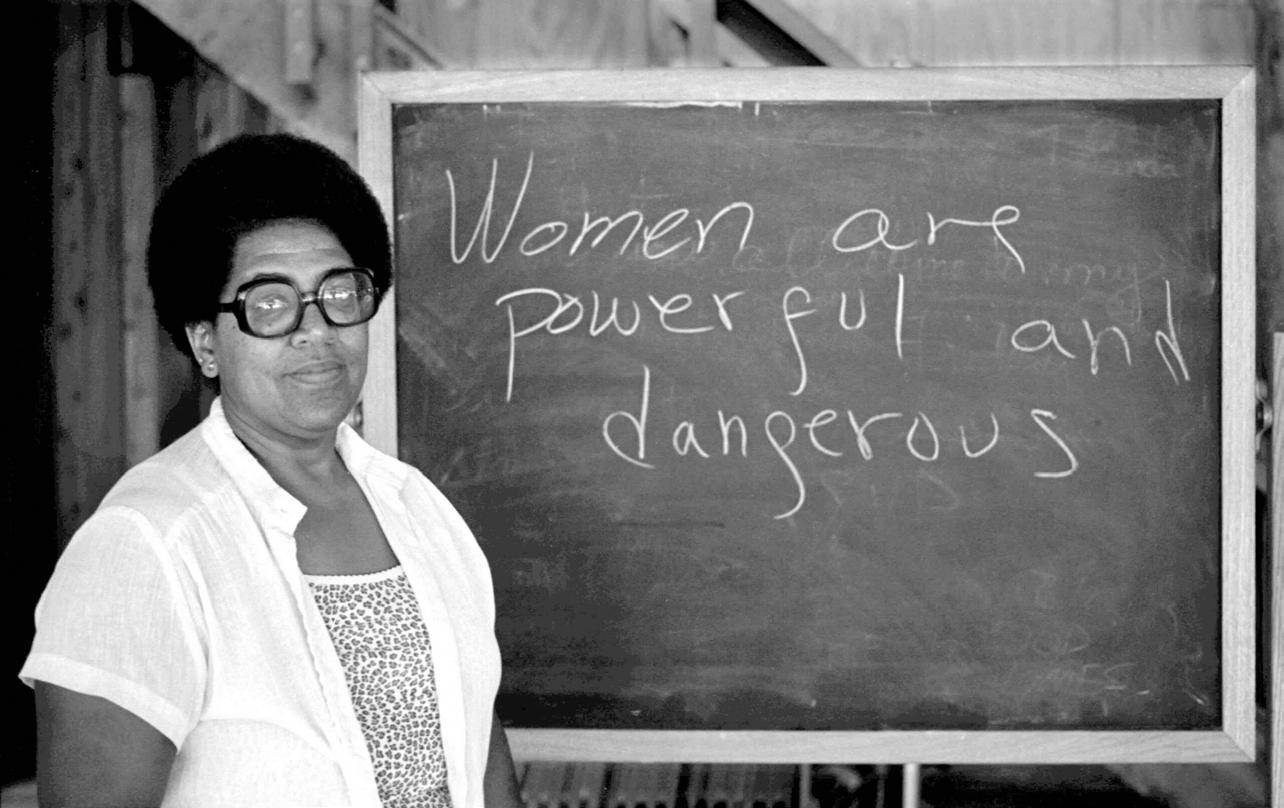
oped a fierce sense of identity and purpose. She went on to earn her master’s degree in library science at Columbia University and later worked as a librarian while continuing to write and publish poetry.
Lorde’s writing explored themes of race, gender, sexuality, and power. Her poetry was deeply personal and political, capturing the lived experiences of Black women and queer people with emotional clarity and intellectual force. Her works, including The Black Unicorn, Coal, and Sister Outsider, are celebrated for their bold honesty and refusal to be silenced or simplified.
As a civil rights activist, Lorde was at the forefront of many struggles. She was deeply involved in the women’s liberation movement but often challenged its predominantly white, middle-class leadership. She emphasized the importance of intersectionality—long before it became a widely used term—insisting that race, gender, class, and sexuality must all be addressed together in the fight for justice. In her words, “There is no such thing as a single-issue struggle because we do not live single-issue lives.”
Lorde was a powerful advocate for LGBTQ+ rights at a time when being openly queer, especially as a Black woman, was met with widespread discrimination. She spoke and wrote about her experiences as a lesbian with unapologetic clarity, paving the way for future generations of queer writers and activists. She helped create spaces where Black lesbians could speak freely and organize, including her involvement in founding Kitchen Table: Women of Color Press, a groundbreaking publishing house for women of color.
In addition to her activism and writing, Lorde was a devoted teacher who inspired countless students
through her work at institutions such as Hunter College and Spelman College. She also became an international figure, building solidarity with feminist movements across the globe, particularly in Africa and the Caribbean.
Even after being diagnosed with cancer, Lorde continued to write and speak with courage and wisdom. Her final years were marked by profound reflection and continued activism, captured in works like The Cancer Journals, where she reframed illness as part of her lifelong struggle for agency and truth.
Audre Lorde passed away in 1992, but her legacy is enduring. Her fearless voice challenged systems of oppression and celebrated the beauty and strength of marginalized identities. Lorde remains a guiding light for activists, writers, and anyone striving to create a more just and compassionate world.
PHYLLIS LYON was a groundbreaking activist, journalist, and feminist whose decades-long work helped shape the modern LGBTQ+ rights movement and advanced equality for women. Born on November 10, 1924, in Tulsa, Oklahoma, Lyon grew up in California and pursued a career in journalism, where she would eventually meet her lifelong partner and fellow activist, Del Martin.
In 1955, Lyon and Martin co-founded the Daughters of Bilitis (DOB) in San Francisco—the first social and political organization for lesbians in the United States. At a time when homosexuality was criminalized and LGBTQ+ people faced extreme discrimination and isolation, DOB provided a safe space for lesbian women to gather, organize, and support one another.
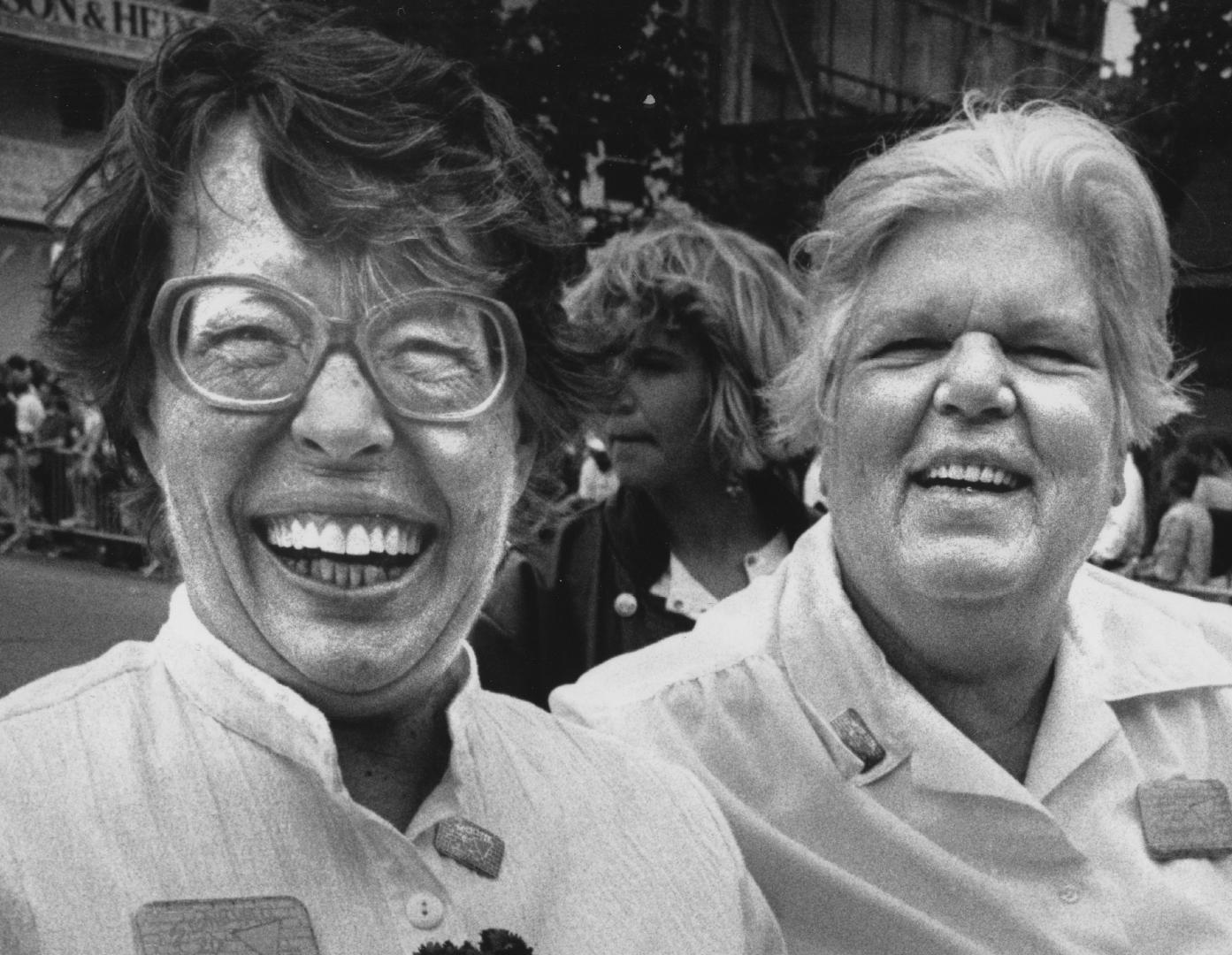
The group also published The Ladder, the first nationally distributed lesbian magazine in the U.S., which Lyon helped edit and write for. Lyon was a tireless advocate for civil rights, particularly at the intersection of gender and sexual identity. Through DOB and other organizations, she fought for visibility, legal protections, and healthcare access for LGBTQ+ people. She was also active in the feminist movement, working with the National Organization for Women (NOW) and pushing for the inclusion of lesbian rights within broader gender equality efforts.
In 2004, Phyllis Lyon and Del Martin made history as the first same-sex couple to be legally married in San Francisco—an act of love and defiance that symbolized decades of activism. Though the marriage was briefly annulled, they married again in 2008 when same-sex marriage was legalized in California.
Phyllis Lyon passed away in 2020 at age 95, leaving behind a powerful legacy of courage, compassion, and change. Her work opened doors for countless LGBTQ+ individuals and laid the
foundation for a more just and inclusive society.
DEL MARTIN was a courageous activist, writer, and feminist whose work helped shape the modern LGBTQ+ and women’s rights movements. Born Dorothy Louise Taliaferro Martin on May 5, 1921, in San Francisco, she dedicated her life to fighting for justice, equality, and dignity for marginalized communities—especially lesbian women.
In 1955, alongside her partner Phyllis Lyon, Martin co-founded the Daughters of Bilitis (DOB), the first lesbian civil rights organization in the United States. At a time when LGBTQ+ people faced widespread discrimination, DOB provided support, visibility, and a platform for organizing. Martin was also a key editor and contributor to The Ladder, the first nationally distributed lesbian magazine, using it to challenge social norms and build community.
Martin was deeply involved in the feminist movement and worked to include lesbian voices in broader women’s rights advocacy.
She was one of the first open lesbians to join the National Organization for Women (NOW) and fought to ensure that LGBTQ+ concerns were addressed within the feminist agenda. Her 1970 essay “If That’s All There Is” boldly confronted anti-lesbian bias in the movement.
She also advocated for victims of domestic violence, co-authoring Battered Wives in 1976 to bring attention to abuse and push for legal reform.
In 2008, Martin married Lyon legally, just months before her death. Their love and activism changed the course of history. Del Martin’s legacy lives on in the progress made toward equality and the continued fight for justice.
HARVEY MILK was a groundbreaking leader, activist, and icon in the fight for LGBTQ+ rights in America. As one of the first openly gay elected officials in the United States, Milk’s courage, optimism, and unwavering belief in equality helped ignite a movement that continues to shape the course of civil rights. His life, though tragically cut short, remains a symbol of hope and resilience for millions around the world.
Born on May 22, 1930, in Woodmere, New York, Harvey Bernard Milk grew up in a Jewish family during a time when being openly gay was not only socially unacceptable but also dangerous. After graduating from New York State College for Teachers (now SUNY Albany) in 1951, he served in the U.S. Navy during the Korean War. Following his honorable discharge, Milk pursued careers in teaching, finance, and theater, but it wasn’t until the 1970s, after relocating to San Francisco, that he began his journey into political activism.
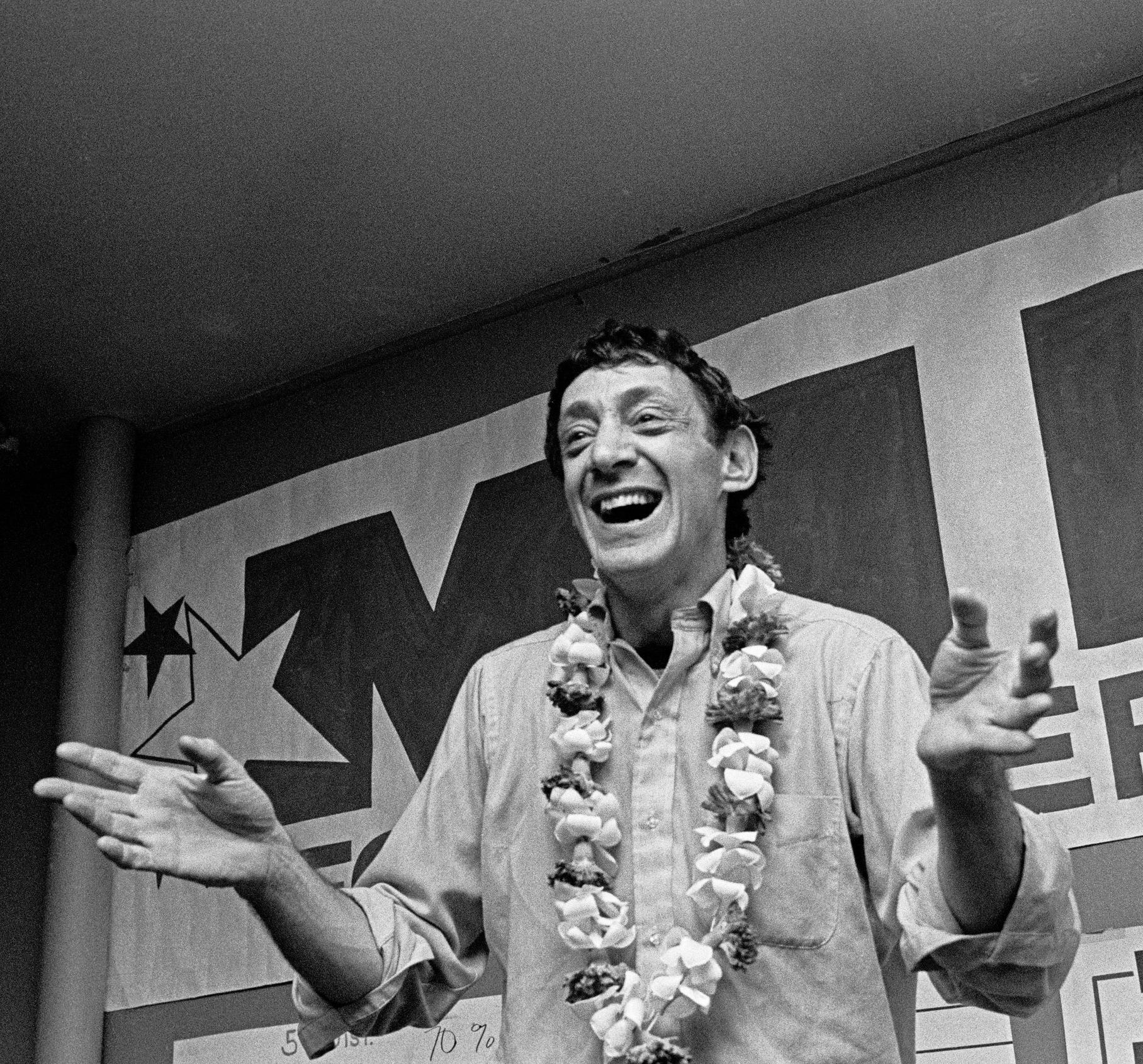
San Francisco in the early 1970s was becoming a hub for the gay rights movement, but the LGBTQ+ community still faced widespread discrimination, police harassment, and exclusion from public life. Milk, who had opened a camera shop in the Castro District, quickly became a visible and vocal advocate for gay rights and neighborhood issues. Known affectionately as the “Mayor of Castro Street,” he used his store as a community gathering place and launched grassroots efforts to support local businesses, protect tenants, and advocate for social justice.
Milk ran for public office several times before finally being elected to the San Francisco Board of Supervisors in 1977. His election was historic—not just for San Francisco, but for the entire country. As one of the first openly gay men elected to public office in the U.S., Milk shattered a political barrier and inspired LGBTQ+ people everywhere to believe they could
have a voice in government.
Once in office, Milk championed a broad progressive agenda. He fought for affordable housing, public transportation, and access to quality education, but his most passionate work centered on LGBTQ+ rights. One of his greatest legislative victories was the passage of a San Francisco ordinance that banned discrimination in employment, housing, and public accommodations based on sexual orientation. This was a major step forward at a time when anti-gay laws and sentiment were widespread.
Milk’s activism extended beyond legislation. He was a gifted speaker who believed deeply in the power of visibility. He encouraged LGBTQ+ individuals to come out and live openly, believing that knowing someone who was gay would break down prejudice and fear. In his most famous speech, known as the “Hope Speech,” Milk said: “You have to give them hope.
Hope for a better world, hope for a better tomorrow… hope that all will be all right.” This message resonated with people not just in the LGBTQ+ community, but across all walks of life who faced injustice.
Harvey Milk also stood in solidarity with other marginalized groups. He built coalitions with labor unions, racial minorities, and other progressive activists. He supported striking workers, opposed police brutality, and spoke out against economic inequality. Milk understood that the fight for LGBTQ+ rights was part of a broader struggle for human rights and dignity.
Tragically, Harvey Milk’s life was cut short when he was assassinated on November 27, 1978, just
11 months after taking office. Along with Mayor George Moscone, Milk was killed by Dan White, a disgruntled former city supervisor. The city of San Francisco was devastated, and Milk’s death became a rallying cry for the LGBTQ+ rights movement.
Despite his untimely death, Milk’s legacy has only grown. He was posthumously awarded the Presidential Medal of Freedom in 2009 by President Barack Obama, and his life has been commemorated in books, documentaries, and the 2008 Academy Award-winning film Milk, starring Sean Penn. In 2014, the U.S. Postal Service issued a stamp in his honor, making him the first openly LGBTQ+ elected official to be featured on a U.S. post-
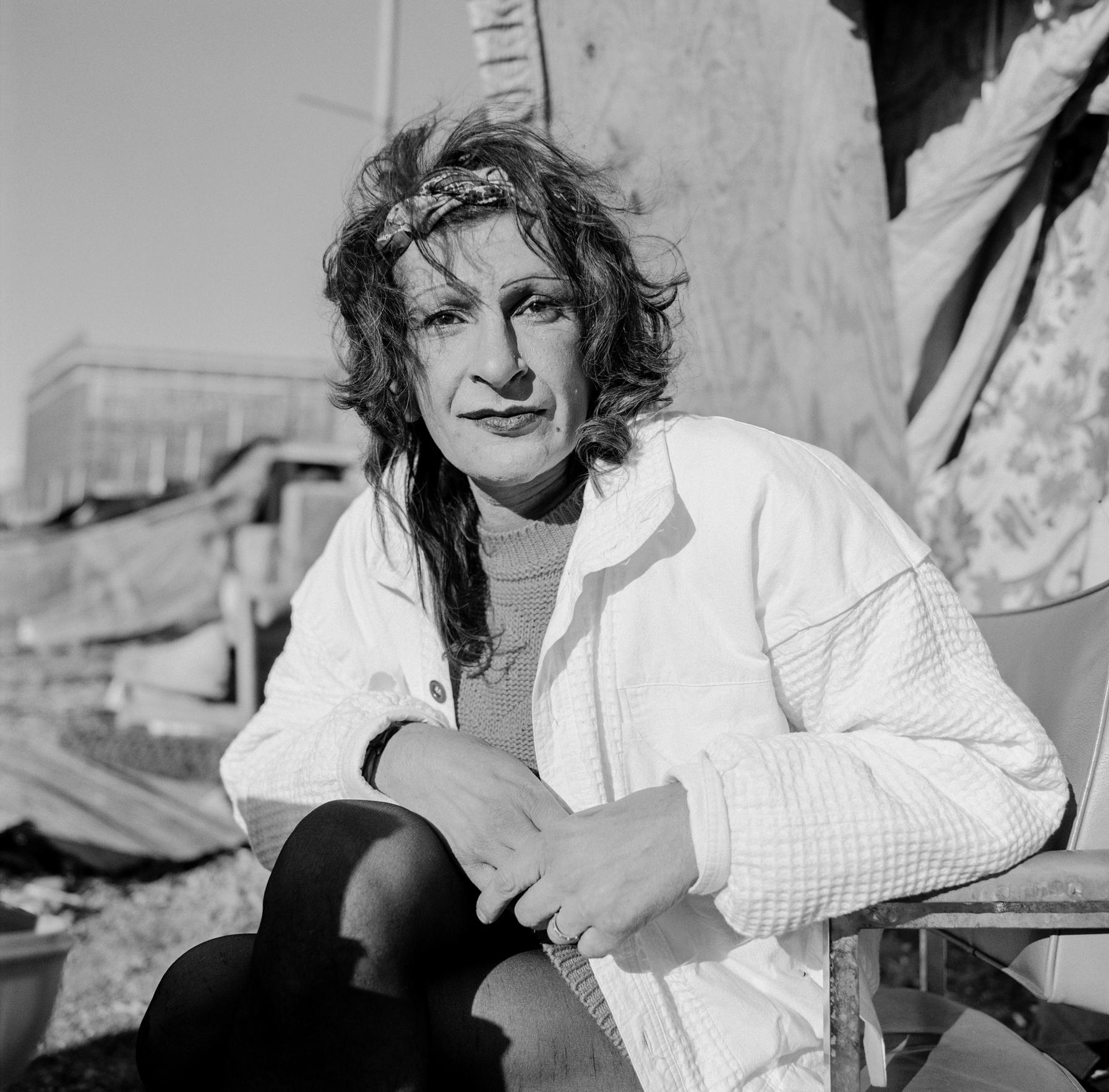
age stamp. Schools, public buildings, and parks across the country now bear his name.
Harvey Milk’s impact on civil rights and the LGBTQ+ community is immeasurable. He proved that representation matters—that having openly gay leaders in positions of power could not only change laws but also change hearts and minds. Through his authenticity, passion, and belief in the goodness of people, Milk helped pave the way for generations of LGBTQ+ individuals to live more openly and freely.
More than four decades after his death, Harvey Milk continues to inspire. His life is a powerful reminder that courage, community, and hope are the foundations of social change. He gave voice to the voiceless, fought for those on the margins, and left a legacy of love, justice, and pride that endures to this day.
SYLVIA RIVERA was a fearless activist, trailblazer, and fighter for civil rights who dedicated her life to advocating for society’s most marginalized—especially transgender people, women, and LGBTQ+ youth. As one of the first transgender women of color to rise to prominence in the LGBTQ+ rights movement, Rivera’s contributions were bold, intersectional, and revolutionary. Her legacy continues to inspire activists around the world who are working to build a more just and inclusive society.
Born Ray Rivera on July 2, 1951, in New York City, Sylvia was of Puerto Rican and Venezuelan descent. Her early life was marked by hardship. She lost her mother to suicide at a young age and was raised by her grandmother, who disapproved of her gender ex-
pression. By the time Sylvia was 11 years old, she had run away from home and was living on the streets of Manhattan. It was there that she found a chosen family among drag queens, sex workers, and other queer youth who, like her, had been rejected by mainstream society.
Rivera’s activism began in earnest during the late 1960s. She was present at the Stonewall uprising in June 1969, a pivotal moment in LGBTQ+ history. The Stonewall riots were sparked by police raids on the Stonewall Inn, a gay bar in New York City. Rivera, along with fellow activist Marsha P. Johnson, was among those who fought back, marking the beginning of the modern gay rights movement. Although Rivera’s exact role during that night has sometimes been debated, she is widely acknowledged as one of the key figures in the fight for LGBTQ+ liberation.
In the years following Stonewall, Rivera became increasingly active in organizing for LGBTQ+ rights, particularly on behalf of transgender people, homeless youth, and people of color. In 1970, she co-founded the Street Transvestite Action Revolutionaries (STAR) with Johnson. STAR provided shelter, food, and support to homeless trans and queer youth in New York—a radical act of mutual aid during a time when few resources existed for these communities.
Rivera was known for her unrelenting advocacy, especially when mainstream gay rights organizations excluded trans people and drag queens from their platforms. She was often outspoken and critical of the movement’s tendency to sideline the very people—trans women, people of color, and sex workers—who had been at the forefront of the struggle. Her famous speech at the 1973 Chris-
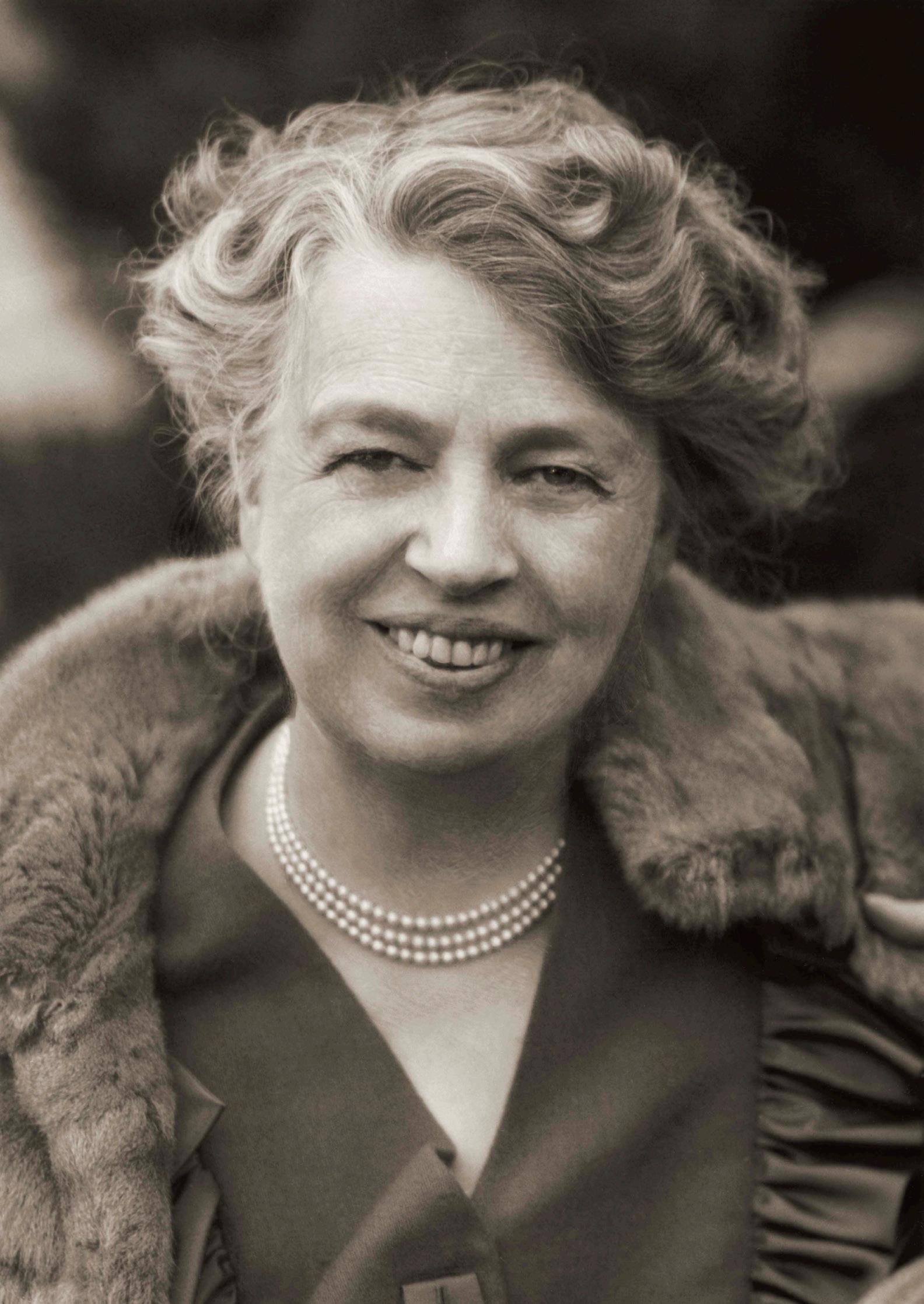
topher Street Liberation Day rally, where she demanded visibility and respect for trans people, remains one of the most powerful moments in LGBTQ+ activist history. Though she spent years feeling marginalized by the movement she helped start, Rivera never gave up. In the 1990s and early 2000s, she returned to activism, advocating for the inclusion of gender identity in New York’s anti-discrimination laws. She continued her work until her death in 2002.
Sylvia Rivera’s life was a testament to courage, compassion, and the enduring fight for dignity. Her advocacy helped lay the foundation for modern transgender rights, and her voice reminds us that true liberation must include everyone— especially those most often left behind.
ELEANOR ROOSEVELT, one of the most influential women of the 20th century, trans-
formed the role of First Lady and emerged as a powerful advocate for civil rights, women’s empowerment, and social justice. Her lifelong commitment to equality and human dignity helped reshape public policy and inspired generations of activists. As a champion for women’s rights and a quiet but meaningful ally to the LGBTQ+ community, Roosevelt’s legacy continues to resonate.
Born on October 11, 1884, in New York City, Eleanor Roosevelt came from a wealthy family but endured a difficult childhood marked by the early deaths of her parents. Despite her privileged background, she developed a strong sense of empathy and social responsibility. She was educated at Allenswood, a progressive school in England where she was mentored by feminist headmistress Marie Souvestre, who helped shape her independent thinking and belief in justice.
In 1905, she married her distant cousin Franklin D. Roosevelt, who would become the 32nd President of the United States. As First Lady from 1933 to 1945, Eleanor redefined the role through her activism, public engagement, and leadership. She held press conferences (only for women reporters), wrote a daily newspaper column called My Day, and traveled extensively to witness and report on the conditions of ordinary Americans, especially during the Great Depression and World War II.
Eleanor Roosevelt was a tireless advocate for women’s rights. She pushed for more women in government positions, supported working mothers, and fought for equal pay and education for women. She urged the Democratic Party to adopt pro-women policies and encouraged women to become politically active, asserting that women’s voices were essential to a just
and equitable society.
In the realm of civil rights, Roosevelt was a strong and often bold supporter of racial equality. She spoke out against segregation, publicly opposed the Ku Klux Klan, and invited African American guests such as singer Marian Anderson to perform at the White House when other venues refused. She resigned from the Daughters of the American Revolution in protest of their discriminatory policies and consistently used her platform to promote justice and inclusion.
While Eleanor Roosevelt did not publicly identify with the LGBTQ+ movement—partly due to the social and political constraints of her era—her close, documented relationship with journalist Lorena Hickok has led many historians to consider her an important early figure in queer history. The letters exchanged between Roosevelt and Hickok suggest a deep emotional and possibly romantic bond, reflecting a personal life that was richer and more complex than public appearances often revealed. Roosevelt’s capacity for empathy and her commitment to human dignity resonate strongly with LGBTQ+ communities today.
After Franklin’s death, Eleanor Roosevelt continued her public service. She was appointed by President Harry Truman as a delegate to the United Nations, where she played a key role in drafting the Universal Declaration of Human Rights in 1948. This document laid the foundation for modern human rights advocacy worldwide.
Eleanor Roosevelt passed away in 1962, but her legacy endures. She remains a symbol of moral courage, progressive leadership, and unwavering dedication to justice. Through her work for women, people of color, and the LGBTQ+ community, she helped build a
more inclusive and compassionate world.
BAYARD RUSTIN was a brilliant strategist, tireless organizer, and courageous advocate who played a pivotal yet often under-recognized role in shaping the American civil rights movement. As an openly gay Black man in a deeply segregated and homophobic society, Rustin stood at the intersection of multiple struggles. His legacy extends beyond racial equality to encompass his deep commitment to gender justice, LGBTQ+ rights, and nonviolent activism as tools for transformative change.
Born on March 17, 1912, in West Chester, Pennsylvania, Bayard Rustin was raised by his grandparents, particularly his grandmother Julia Rustin, who was a Quaker and deeply influenced his values of peace, equality, and social responsibility. These early teachings would form the bedrock of his lifelong dedication to nonviolence and human rights.
Rustin’s activism began in earnest in the 1930s and 1940s. He fought against segregation, was involved with labor organizing, and protested U.S. involvement in war. He joined the Fellowship of Reconciliation (FOR), a pacifist organization, and later helped found the Congress of Racial Equality (CORE). Rustin’s belief in nonviolent resistance led him to travel to India, where he studied Mahatma Gandhi’s philosophy. He would later become a key mentor to Dr. Martin Luther King Jr., helping to infuse the civil rights movement with nonviolent strategy.
Rustin’s most celebrated contribution was his role as chief organizer of the 1963 March on Washington for Jobs and Freedom, one
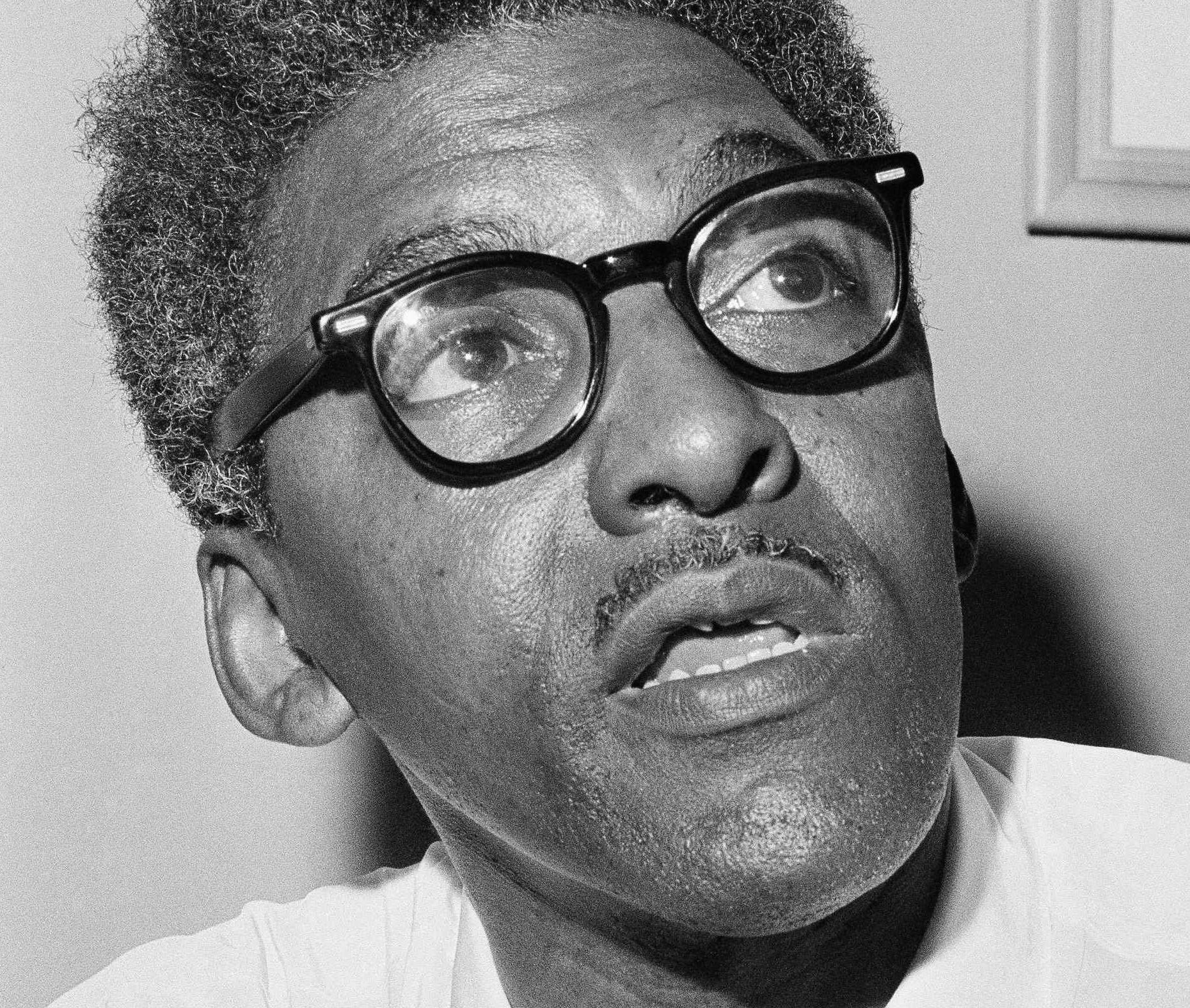
of the largest and most influential protests in U.S. history. Despite the enormous logistical challenges, Rustin coordinated the transportation, security, program, and speakers for over 250,000 participants. The event was a landmark moment, not only for African American civil rights but for the broader fight for economic justice and equality.
Dr. King’s iconic “I Have a Dream” speech that day became a turning point in American history—made possible in large part due to Rustin’s skillful organizing.
However, Rustin’s visibility as an openly gay man often placed him at odds with more conservative elements of the civil rights
leadership. At times, he was forced into the background or denied public leadership roles to avoid political controversy. Despite this marginalization, Rustin never hid who he was and never wavered in his commitment to the cause. In doing so, he became one of the first prominent Black LGBTQ+ activists in American history.
Rustin’s activism extended beyond race. He was a strong advocate for women’s rights, believing that any movement seeking true justice must include gender equality. He supported the work of women in civil rights organizations and advocated for equal pay and political representation. Rustin
also aligned himself with the labor movement, believing that economic justice was inextricably linked with racial and gender justice.
In the 1980s, long after the peak of the civil rights movement, Rustin began to more actively advocate for LGBTQ+ rights. He spoke out against anti-gay discrimination and urged the movement to embrace the fight for gay and lesbian equality as a continuation of the civil rights legacy. In 1986, he gave a speech titled “The New ‘Niggers’ Are Gays,” in which he drew direct parallels between racial discrimination and the oppression faced by the LGBTQ+ community. He argued that injustice against any
group was a threat to justice for all.
Bayard Rustin passed away on August 24, 1987, but his work and spirit live on. In 2013, President Barack Obama posthumously awarded him the Presidential Medal of Freedom, the highest civilian honor in the United States. In the citation, Obama recognized Rustin as “an unyielding activist for civil rights, dignity, and equality for all.”
Today, Rustin is remembered not only for his incredible contributions to the civil rights movement but also for his intersectional vision of justice. He showed that true liberation must include everyone—Black and white, gay and straight, men and women. He stood for a future where no one would be left behind.
Bayard Rustin’s life reminds us that justice is not linear and progress is not easy—but with courage, strategy, and compassion,
change is possible. His legacy as a bridge-builder between movements continues to inspire those working for equity and dignity in all communities.
DAN SAVAGE is a prominent author, journalist, and activist whose work has made a lasting impact on LGBTQ+ rights and visibility. Known for his candid voice, unapologetic humor, and deep compassion, Savage has spent decades advocating for the dignity, safety, and equality of LGBTQ+ people, especially young people navigating identity in a sometimes-hostile world.
Born on October 7, 1964, in Chicago, Illinois, Savage grew up in a Catholic family and later came out as gay in college. In 1991, he began writing the widely read sex and relationship advice column Savage

Love, which became a platform not only for honest conversations about sex but also for addressing broader issues of consent, identity, and LGBTQ+ rights. His openness and wit helped normalize queer voices in mainstream media, breaking down taboos and challenging stigmas.
In 2010, Savage and his husband, Terry Miller, launched the It Gets Better Project in response to a wave of suicides among LGBTQ+ teens facing bullying. The project began as a simple video of encouragement but quickly grew into a global movement, featuring thousands of videos and messages from public figures, celebrities, and everyday people offering hope and support. The campaign has saved lives and continues to promote mental health and empowerment for queer youth around the world.
Dan Savage remains a bold and influential figure in the LGBTQ+ movement. Through his writing, activism, and advocacy, he has created space for honest dialogue, fostered greater understanding, and helped build a more inclusive world where LGBTQ+ individuals can live openly, safely, and proudly.
PATTI SMITH, born on December 30, 1946, in Chicago, Illinois, is an iconic American singer, poet, author, and artist whose career has spanned decades and defied traditional labels. Often referred to as the “Godmother of Punk,” Smith is best known for fusing poetic lyrics with rock music, creating a bold new voice in the 1970s that challenged cultural norms and inspired generations. Beyond her artistic impact, Patti Smith has long been a vocal supporter of civil rights, particularly for women and the LGBTQ+ community.
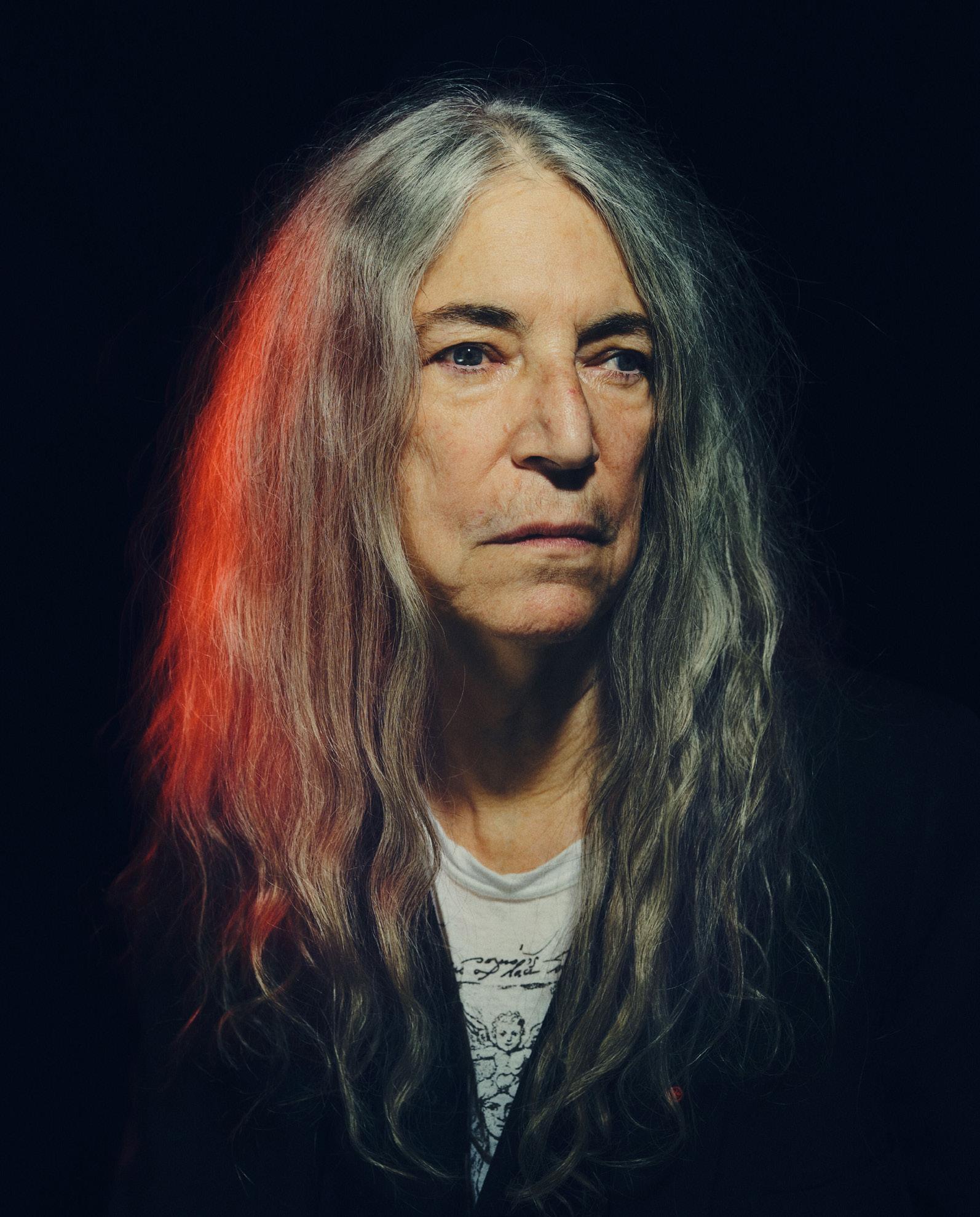
Raised in a working-class family and largely self-educated, Smith moved to New York City in the late 1960s with dreams of becoming an artist and writer. She quickly became a central figure in the city’s vibrant creative scene, forming friendships with photographers, poets, and musicians. Her relationship with photographer Robert Mapplethorpe—who later came out as gay—was especially formative. Their deep, complex bond, captured in her award-winning memoir Just Kids, reflected her early exposure to and respect for LGBTQ+ lives and experiences.
Smith broke into music in 1975 with her groundbreaking debut
album Horses, which combined raw rock energy with intellectual and feminist themes. Songs like “Gloria” and “Free Money” upended gender expectations and challenged conventional views of sexuality and power. Smith’s androgynous style and fierce independence made her a role model for women seeking freedom of expression in male-dominated spaces. She refused to conform to industry standards of femininity, instead embracing authenticity, artistic freedom, and a voice that was unapologetically her own.
Throughout her career, Smith has used her platform to advocate for social justice. She has spoken
out on behalf of women’s rights, promoting the importance of artistic and political freedom for women around the world. In her performances, speeches, and writings, she has consistently uplifted the voices of marginalized people and encouraged young artists—regardless of gender or sexual identity—to pursue their truth through creativity.
Smith has also stood in solidarity with the LGBTQ+ community throughout her life. She has openly acknowledged the fluidity of sexuality and gender in her own experience and celebrated queer identities in her work. Her friendship with LGBTQ+ artists like Mapplethorpe and her ongoing support of queer writers, performers, and causes have made her a beloved figure within the community. She has performed at numerous benefit concerts and events in support of LGBTQ+ rights and consistently promotes messages of inclusion and dignity.
In addition to her music, Smith is a celebrated author. Her memoirs Just Kids and M Train reveal the deep emotional and intellectual roots of her activism and art. These works offer insight into the struggles and triumphs of a woman who has remained true to her ideals in a world that often demands compromise.
Patti Smith remains a fearless force in art and activism. Her unwavering commitment to self-expression, equality, and justice has made her not only a cultural icon but also a compassionate and courageous advocate for women and LGBTQ+ people around the world.
ELIZABETH CADY STANTON (1815–1902) was a pioneering leader in the American women’s rights movement, whose
tireless advocacy laid the groundwork for future generations of feminists and civil rights activists. Intelligent, determined, and ahead of her time, Stanton dedicated her life to fighting for gender equality, especially in the realms of suffrage, education, and legal reform.
Born on November 12, 1815, in Johnstown, New York, Stanton was raised in a family deeply involved in law and politics. Her father, Daniel Cady, was a prominent lawyer and judge, and Elizabeth’s early exposure to the legal system helped her recognize the many injustices women faced under the law. Although women were not allowed
to attend college at the time, Stanton received an exceptional education for a young woman of her era, studying at the Troy Female Seminary and pursuing a broad range of academic interests, including philosophy, mathematics, and Greek.
Stanton’s awakening as a civil rights advocate began in earnest after she married Henry Brewster Stanton, an abolitionist, in 1840. On their honeymoon in London, the couple attended the World Anti-Slavery Convention, where Elizabeth was outraged that women delegates, including herself, were denied the right to participate simply because of their gender. That
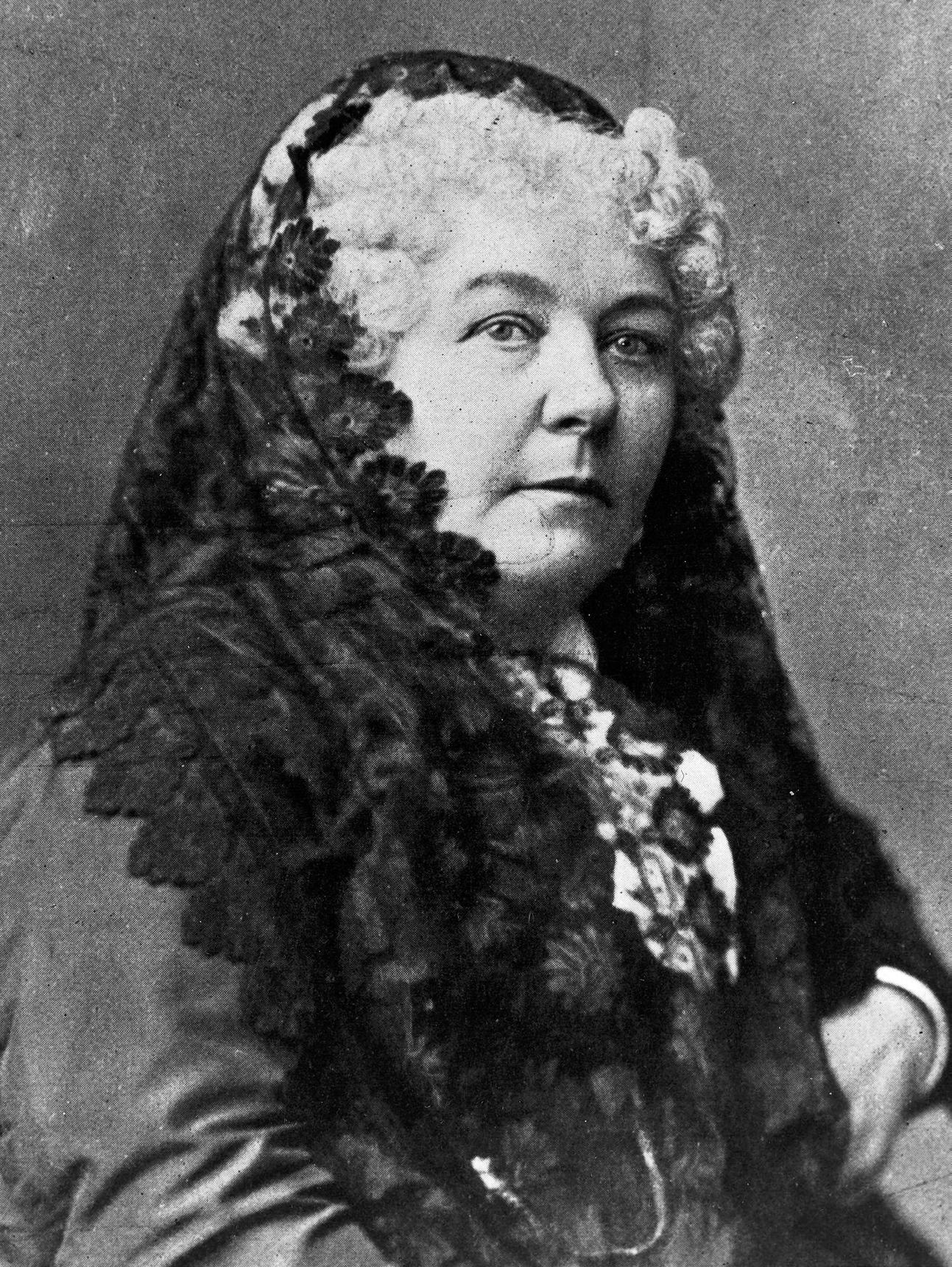
experience galvanized her commitment to securing equal rights for women.
In 1848, Stanton, along with Quaker activist Lucretia Mott, organized the Seneca Falls Convention, the first women’s rights convention in the United States. It was at this historic event that Stanton introduced the Declaration of Sentiments, a bold document modeled after the Declaration of Independence. It called for women’s social, civil, and religious rights, and most controversially, demanded women’s right to vote. Her powerful voice and clear vision made her a central figure in the burgeoning women’s movement.
Stanton worked closely with Susan B. Anthony, forming one of the most influential partnerships in American reform history. Together, they campaigned tirelessly across the country, organizing lectures, petitions, and lobbying efforts to promote women’s suffrage and legal equality. While Anthony often focused on public speaking and organizing, Stanton was the intellectual engine, writing speeches, articles, and books that articulated the goals of the movement with clarity and passion.
In addition to her suffrage work, Stanton also advocated for more comprehensive women’s rights, including access to higher education, property rights for married women, and the reform of divorce laws. She was unafraid to challenge social norms and religious doctrines that she saw as oppressive to women, making her a controversial but fearless figure.
Though she did not live to see the 19th Amendment passed in 1920, granting women the right to vote, Elizabeth Cady Stanton’s legacy is undeniable. Her pioneering efforts paved the way for women’s expanded role in public life and
inspired countless individuals to continue the fight for equality. Today, she is remembered as a visionary thinker, a passionate reformer, and one of the true founders of the American women’s rights movement.
GLORIA STEINEM stands as one of the most influential figures in the fight for gender equality, civil rights, and social justice. A journalist, feminist, and political activist, Steinem has spent more than six decades advocating for the rights of women, LGBTQ+ individuals, and other marginalized communities. Her life’s work has helped to reshape American society and continues to inspire new generations of activists.
Born on March 25, 1934, in Toledo, Ohio, Gloria Marie Steinem was raised in a nontraditional household. Her father was a traveling antiques dealer, and her mother, a newspaper reporter, suffered
from chronic mental illness. These early experiences shaped Steinem’s empathy for women’s struggles and helped ignite her desire to pursue systemic change. After graduating magna cum laude from Smith College in 1956, she received a fellowship to study in India, where she was introduced to grassroots activism and nonviolent resistance, experiences that would later influence her organizing methods.
Steinem’s career began in journalism, but she quickly realized that women were often relegated to covering “soft” topics, with few opportunities to report on politics or social issues. Undeterred, she found creative ways to highlight the injustices facing women. One pivotal moment came in 1963, when she went undercover as a Playboy Bunny to expose the exploitative working conditions at Hugh Hefner’s Playboy Clubs. The resulting article, published in Show magazine, brought her national attention and marked the beginning
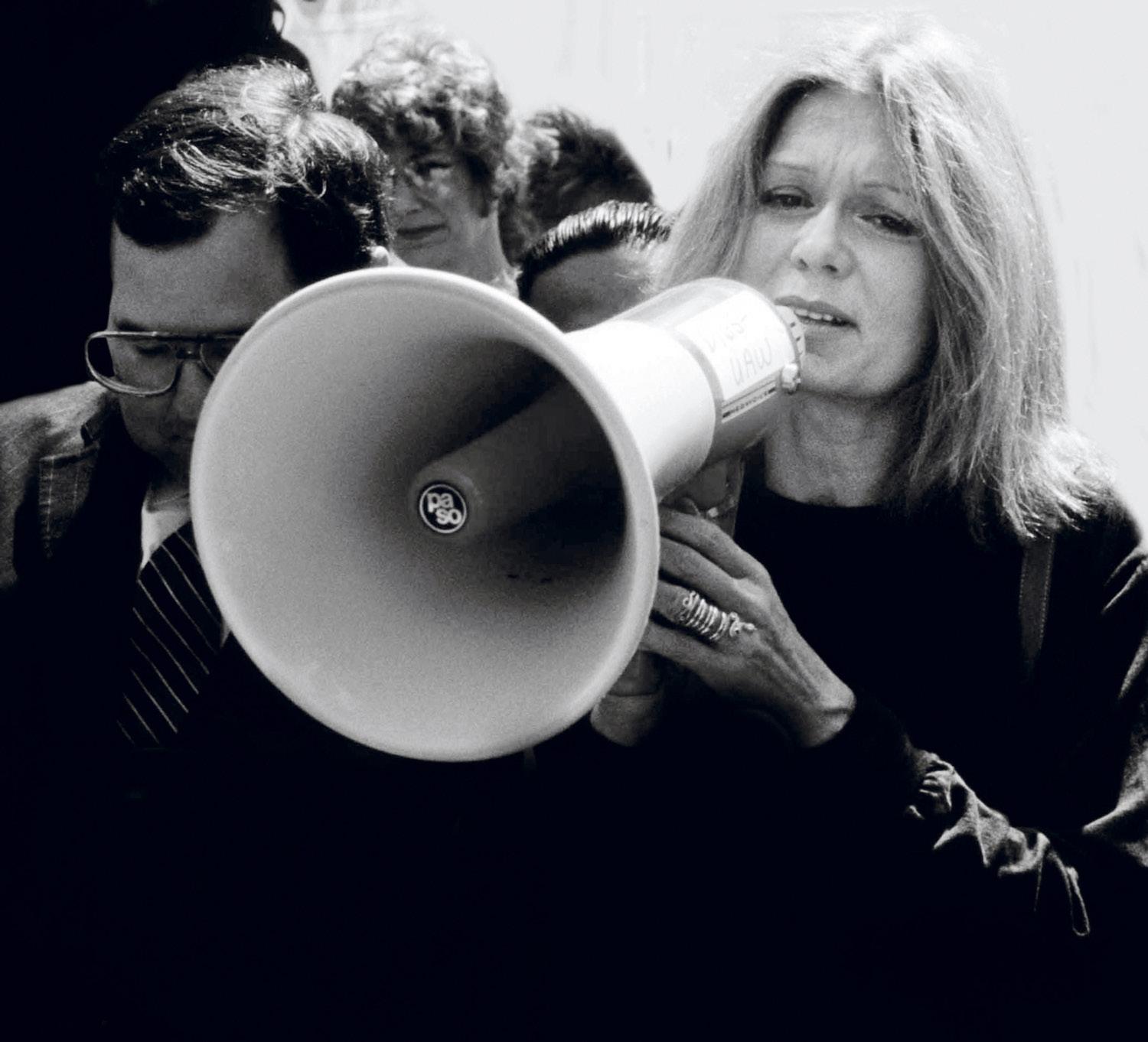
of her prominence in the feminist movement.
In 1971, Steinem co-founded Ms. magazine, a groundbreaking publication that gave voice to women’s experiences and addressed issues ranging from domestic violence to reproductive rights to workplace discrimination. Ms. magazine became a vital platform for the women’s liberation movement, empowering readers and challenging traditional gender roles in mainstream media. It was one of the first magazines to be run and written by women for a predominantly female audience, breaking new ground by covering taboo topics such as abortion, rape, and lesbian rights.
Steinem was also a founding member of the National Women’s Political Caucus (NWPC), which aimed to increase women’s participation in politics and public policy. Through her tireless advocacy, she pushed for legislation that expanded civil rights, including the Equal Rights Amendment, Title IX, and laws against gender-based violence and workplace discrimination. Her efforts played a critical role in securing greater legal and social protections for women in the United States.
Beyond her work for women’s rights, Steinem has been a consistent ally of the LGBTQ+ community. Long before it was politically popular, she voiced support for same-sex marriage and fought against discrimination based on sexual orientation and gender identity. She viewed the struggles for women’s rights and LGBTQ+ rights as fundamentally interconnected, rooted in the same systems of patriarchy and social inequality. In her words, “The idea that sex and race determine our place in life is the root of all injustice and continues to divide us.”
Throughout the 1980s and 1990s, Steinem continued to speak out against injustice and promote intersectional feminism—a framework that recognizes how race, class, gender, and sexual orientation interact to shape individual experiences of oppression. She worked closely with civil rights leaders, LGBTQ+ activists, and reproductive justice advocates to build inclusive coalitions. Her belief in unity through diversity helped bridge gaps between movements and amplify the voices of those too often silenced.
In 2005, she co-founded the Women’s Media Center with fellow feminists Jane Fonda and Robin Morgan. The organization trains women and LGBTQ+ individuals to become leaders in media, aiming to increase their representation in journalism, broadcasting, and digital platforms. Steinem’s commitment to empowering others remains one of her defining legacies.
Even into her 80s, Steinem has continued to travel the world, giving lectures, supporting grassroots activism, and mentoring young feminists. Her 2015 memoir, My Life on the Road, offers an intimate look into her lifelong journey as an organizer, traveler, and advocate. The book became a bestseller and further cemented her status as a cultural icon and a beacon of hope for progressive causes.
Steinem has received countless honors for her work, including the Presidential Medal of Freedom in 2013, awarded by President Barack Obama. In bestowing the nation’s highest civilian honor, Obama praised her as “one of the most important voices of our time.”
Gloria Steinem’s contributions to civil rights, gender equality, and LGBTQ+ advocacy have had a profound and lasting impact. She has dedicated her life to challenging
SOJOURNER TRUTH
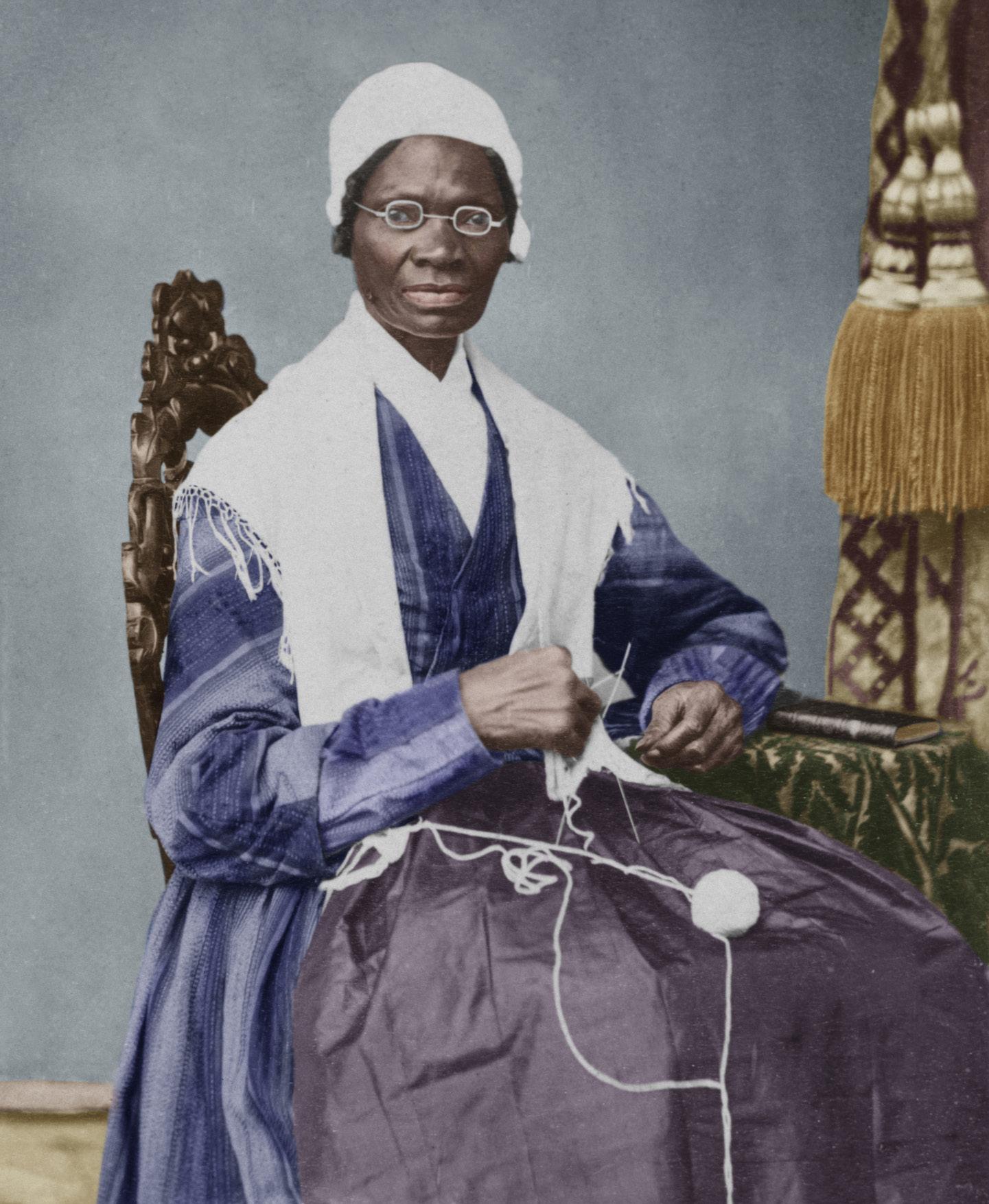
the status quo, lifting the voices of the marginalized, and promoting a vision of a more just and inclusive world. Her courage, clarity, and compassion continue to inspire activists across the globe, reminding us that lasting change begins with the boldness to speak out and the determination to act.
SOJOURNER TRUTH was a fearless abolitionist, women’s rights advocate, and powerful orator whose life and work helped shape the fight for justice in 19th-century America. Born into slavery and later freed, she dedicated her life to challenging injustice and lifting the voices of both African Americans and
women, becoming one of the most influential figures in American history.
Truth was born Isabella Baumfree around 1797 in Ulster County, New York. She spent her early life enslaved, enduring years of hardship, abuse, and separation from her family. In 1826, she escaped slavery with her infant daughter, walking away from her master and eventually finding refuge with a Quaker family who helped her gain her freedom legally. Two years later, she successfully sued in court to recover her son Peter, who had been sold illegally—a remarkable feat for a formerly enslaved Black woman at the time.
In 1843, Isabella changed her name to Sojourner Truth, believing
that God had called her to travel the country and preach the truth about slavery and injustice. She became a compelling speaker, using her own experiences to connect with audiences and call for the abolition of slavery and equal rights for all. Her speeches combined religious conviction with deep moral clarity, making her a beloved and respected voice across the abolitionist movement.
Truth was also a pioneering advocate for women’s rights, challenging the exclusion of Black women from the mainstream women’s suffrage movement. Her most famous speech, “Ain’t I a Woman?,” delivered in 1851 at the Women’s Convention in Akron, Ohio, remains a powerful statement on the intersection of race and gender. In it, she challenged the prevailing notions of womanhood, reminding the audience that Black women, too, deserved rights, respect, and equality.
Throughout the Civil War, Truth recruited Black soldiers for the Union Army and worked tirelessly to improve conditions for formerly enslaved people. After the war, she continued to advocate for land rights for freedmen and pushed for greater protections and opportunities for African Americans. She met with President Abraham Lincoln in 1864 and later worked with the Freedmen’s Bureau to support formerly enslaved families.
Despite facing racism, sexism, and poverty, Sojourner Truth never stopped speaking out. Her courage, eloquence, and unwavering commitment to justice made her a symbol of resistance and hope. She was not only a voice for African Americans and women during her lifetime but also a trailblazer who laid the foundation for future civil rights movements.
Sojourner Truth died in 1883, but her legacy lives on. Her life’s work reminds us of the power of truth, resilience, and moral conviction in the fight for equality. As a woman who overcame unimaginable odds to become a national leader, Truth continues to inspire all who seek justice, freedom, and human dignity.
MARY
WOLLSTONECRAFT (1759–1797) was an English writer, philosopher, and early advocate for wom-
ships, she developed a fierce independence and a lifelong commitment to self-education. She worked as a companion, governess, and teacher—professions open to women at the time—and through these roles, she observed firsthand the limited opportunities and societal expectations imposed on women.
Wollstonecraft’s dissatisfaction with these limitations led her to writing, where she found both her voice and her purpose. In 1792, she published her most influential work, A Vindication of the Rights of Woman. In this powerful treatise,
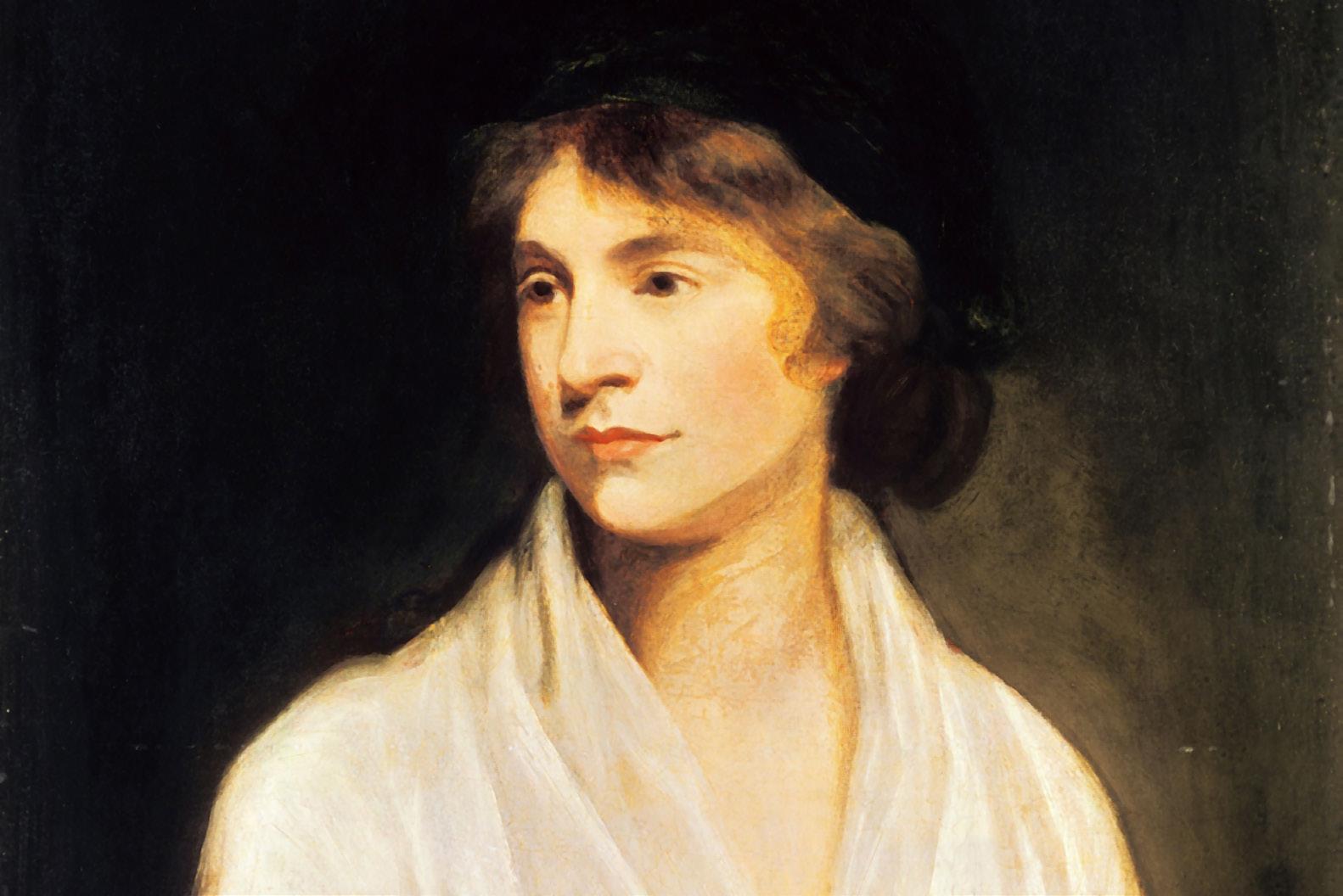
en’s rights whose groundbreaking ideas helped lay the intellectual foundation for modern feminism. Her bold and visionary writings challenged the societal norms of her time and inspired generations of activists committed to gender equality and civil rights.
Born on April 27, 1759, in London, Wollstonecraft experienced a difficult childhood marked by financial instability and a troubled family life. Despite these hard-
Wollstonecraft argued that women are not naturally inferior to men, but appear so only because they are denied access to education and independence. She advocated for equal education for girls and boys, claiming that educating women would not only benefit them personally, but also improve society as a whole by creating more rational and virtuous citizens.
In A Vindication of the Rights of Woman, Wollstonecraft wrote pas-
sionately about women’s capacity for reason and moral agency, insisting that they deserved the same rights as men to develop their intellect, pursue meaningful work, and participate fully in civic life. At a time when women were often considered property or ornaments, her ideas were radical and ahead of their time.
Wollstonecraft’s advocacy for women’s civil rights extended beyond education. She spoke out against arranged marriages, economic dependence on men, and the lack of legal rights afforded to women. She also addressed broader social issues, including class inequality and the abuse of power, showing a deep concern for justice in all forms.
Her personal life reflected her values of independence and self-de-

termination. She had a daughter, Fanny, from a relationship with the American writer Gilbert Imlay, and later married the philosopher William Godwin. Their daughter, Mary Wollstonecraft Godwin—better known as Mary Shelley—would go on to write Frankenstein, becoming a literary icon in her own right.
Tragically, Mary Wollstonecraft died shortly after giving birth to Mary in 1797, at the age of 38. Though her life was cut short, her influence endured. Her works were rediscovered and celebrated by later generations of feminists, particularly during the women’s suffrage movements of the 19th and 20th centuries.
Today, Mary Wollstonecraft is recognized as one of the earliest and most important voices in the fight for women’s rights. Her courageous arguments for equality, reason, and justice continue to resonate, reminding the world that the struggle for women’s civil rights is rooted in centuries of powerful and persistent advocacy.
VIRGINIA WOOLF (1882–1941) was a brilliant British author, essayist, and modernist whose groundbreaking work transformed literature and advanced civil rights for women and the LGBTQ+ community. Through her novels, essays, and personal life, Woolf challenged societal norms, questioned gender roles, and opened new paths for marginalized voices in art and society.
Born Adeline Virginia Stephen on January 25, 1882, in London, Woolf grew up in a highly intellectual household. Her father, Sir Leslie Stephen, was a respected literary scholar, and the young Virginia was exposed to books, ideas, and prominent thinkers from an early age. Although she did not at-
tend formal school, she received a rigorous education at home and soon emerged as a deeply thoughtful and gifted writer.
Woolf became a central figure in the Bloomsbury Group, a circle of writers, artists, and thinkers who promoted progressive ideas about politics, gender, art, and sexuality. Within this vibrant community, Woolf found intellectual freedom and a space to explore her identity and ideas. Her openness about her relationships with women, most notably with writer Vita Sackville-West, positioned her as an early and influential voice in LGBTQ+ history.
As a writer, Woolf pushed the boundaries of literary form. Novels such as Mrs. Dalloway, To the Lighthouse, and Orlando broke away from traditional storytelling, using stream-of-consciousness narration and nonlinear timelines to delve into characters’ inner lives. Orlando in particular was revolutionary for its exploration of gender fluidity, following a protagonist who changes sex from male to female and lives for centuries. This novel, inspired by Sackville-West, is now celebrated as a landmark work in LGBTQ+ literature.
Beyond her fiction, Woolf was a powerful advocate for women’s civil rights through her essays. Her 1929 work A Room of One’s Own is considered one of the most important feminist texts of the 20th century. In it, she argued that women need financial independence and personal space in order to create literature—and, by extension, to fully participate in intellectual and cultural life. With the famous line, “A woman must have money and a room of her own if she is to write fiction,” Woolf made a compelling case for women’s economic and creative liberation.
Woolf also addressed the psy-
chological toll of oppression, exploring how societal limitations stifled women’s potential. She was deeply concerned with how patriarchal structures affected mental health, identity, and artistic freedom. Her work helped to spark crucial conversations about the intersection of gender, class, and creativity.
Despite struggles with mental illness, which ultimately led to her death in 1941, Virginia Woolf’s legacy has only grown in the decades since. She is remembered not only as a literary innovator but also as a courageous thinker who championed equality and self-expression. Her bold voice continues to inspire writers, feminists, and LGBTQ+ activists around the world, making her one of the most enduring figures in the fight for civil rights and artistic freedom.
MALALA YOUSAFZAI is an internationally renowned human rights activist and Nobel Peace Prize laureate who has become a powerful symbol of resilience, courage, and the ongoing fight for civil rights. Best known for her advocacy of girls’ education, Malala has also spoken out for the broader rights of women and members of the LGBTQ+ community. Through her work, she has inspired millions around the world to stand up for justice, equality, and the fundamental right to learn and live freely.
Malala was born on July 12, 1997, in Mingora, a city in the Swat Valley of Pakistan. Her father, Ziauddin Yousafzai, was a teacher and passionate advocate for education, especially for girls—a stance that was uncommon in their conservative region. Encouraged by her father, Malala developed a
deep love for learning from an early age and began to speak publicly about the importance of education for all children.
At just 11 years old, Malala began writing a blog under a pseudonym for the BBC Urdu service. Her blog detailed life under the Taliban, who had taken control of the Swat Valley and imposed harsh restrictions, especially on women and girls. She bravely documented the closing of girls’ schools and the climate of fear in her community. Her voice, though young, was powerful, and she soon gained international attention for her boldness and honesty.
Tragically, her activism made her a target. On October 9, 2012, Malala was shot in the head by a
Taliban gunman while riding a school bus with her friends. The attack was meant to silence her, but it had the opposite effect. Malala survived after extensive medical treatment and was flown to the United Kingdom for recovery. The world rallied around her, and the attack only strengthened her resolve to continue her advocacy on an even larger scale.
Following her recovery, Malala co-founded the Malala Fund with her father, an organization dedicated to championing every girl’s right to 12 years of free, safe, and quality education. Through the fund, she has supported education programs in countries across Africa, Asia, and the Middle East, empowering young women to break cycles of
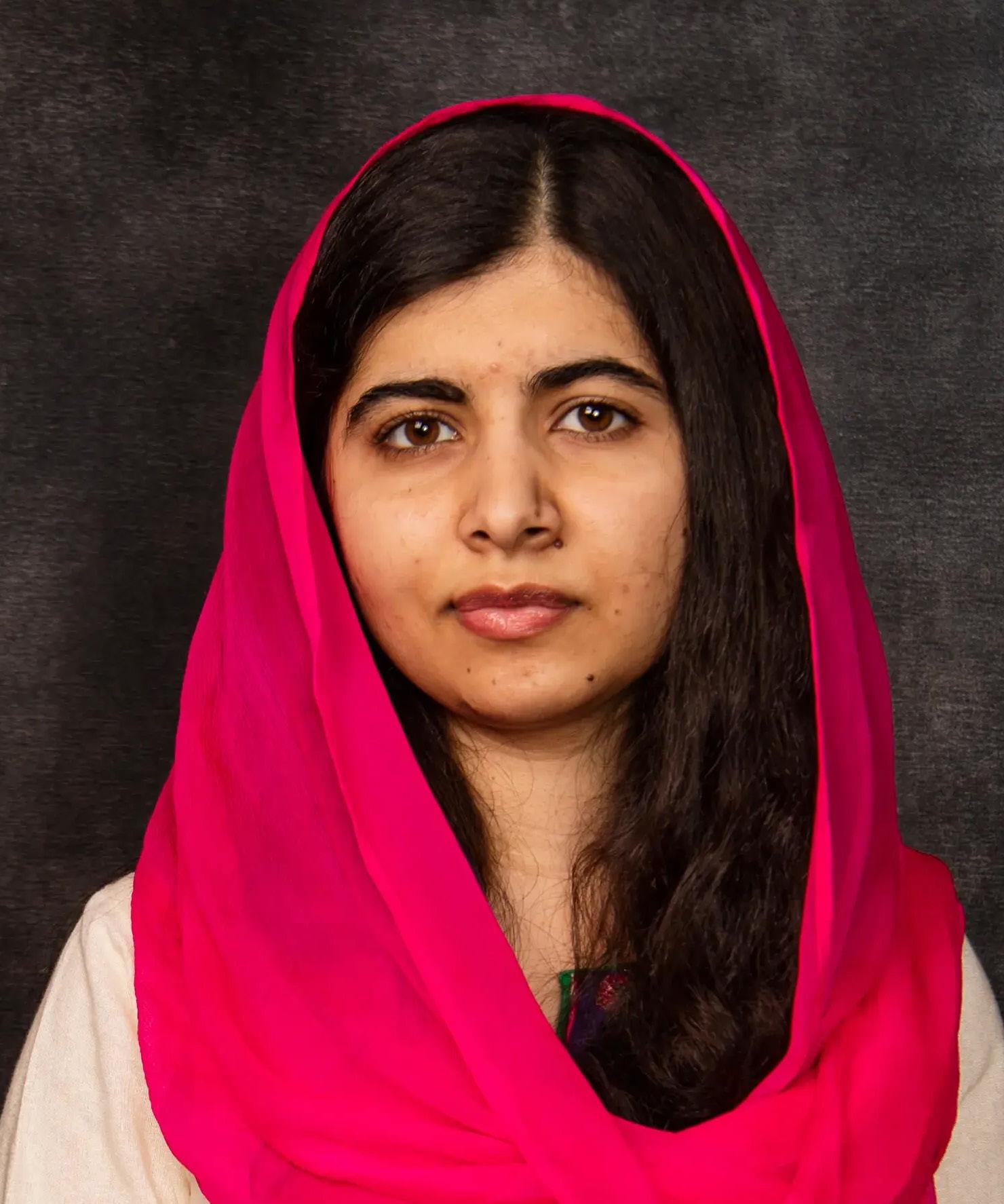
poverty and inequality. In 2014, at the age of 17, Malala became the youngest person ever awarded the Nobel Peace Prize, a recognition of her unwavering commitment to education and human rights.
While Malala is most widely known for her work in girls’ education, she has also used her platform to advocate for broader civil rights issues. She has been vocal in her support for gender equality, calling for women to have equal opportunities in leadership, employment, and public life. In recent years, she has extended her advocacy to include support for the LGBTQ+ community, affirming the right of all people to live authentically and without fear of discrimination.
Malala has expressed solidarity with LGBTQ+ individuals, emphasizing that human rights are universal and indivisible. In inter-
views and on social media, she has denounced anti-LGBTQ+ laws and spoken out in favor of inclusive education and safe environments for all students, regardless of gender identity or sexual orientation. Her inclusive approach has helped bring attention to how education and freedom must include all marginalized groups—not just some.
In addition to her activism, Malala has become a respected author and speaker. Her memoir, I Am Malala: The Girl Who Stood Up for Education and Was Shot by the Taliban, became a global bestseller and introduced her story to millions of readers around the world. She has continued to speak at global summits, the United Nations, and universities, inspiring young people to raise their voices and work for a more just world.
In 2020, Malala graduated
FRAMED IMAGE INFORMATION
from the University of Oxford with a degree in Philosophy, Politics, and Economics, balancing her studies with her global advocacy. Her continued involvement in human rights, climate justice, and education reform demonstrates a commitment to shaping a future where equality is not an ideal but a lived reality.
Today, Malala Yousafzai stands as one of the most admired and influential figures of her generation. She has shown that even in the face of violence and oppression, one voice can spark global change. Through her tireless work for civil rights—including the rights of women and LGBTQ+ individuals— Malala has proven that courage, compassion, and education are the most powerful tools for building a better world.
Front Cover (left to right from top): Hillary Rodham Clinton [Art Deco], Betty Friedan [Charcoal Sketch], Marsha P. Johnson [Pop Art], Gloria Steinem [Expressionism], Malala Yousafzai [Art Nouveau], Kamala Harris [Impressionism], Geraldine Ferraro [Sumi-e], Billie Jean King [American Watercolor], and James Baldwin [Fauvism]
Page 2: Barbara Jordan [Impressionism], Laurie Anderson [Surrealism], Audre Lorde [Harlem Renaissance], Margaret Atwood [Neo-Impressionism], Allen Ginsberg [American Folk Art], and Angela Davis [Mannerism].
Page 4: Patti Smith [Magical Realism], Bayard Rustin [Art Deco], Alison Bechdel [Pointillism], Sylvia Rivera [Post-Impressionism], Sojourner Truth [Baroque], and Dan Savage [Mannerism]
Back Cover: Ruth Bader Ginsburg [Pop Art], Larry Kramer [Art Nouveau], Eleanor Roosevelt [American Modernism], Harvey Milk [Charcoal Sketch], Kate Bornstein [American Watercolor], and Virginia Woolf [Picasso-Style Sketch]















